
News Trading Made Easy (Part 2): Risk Management
Introduction
A quick refresher for the previous article in the News Trading Made Easy series. In part 1, we went through the concept of DST(Daylight Savings Time) and the various versions for different countries that essentially change their time zones by an hour ahead and behind during a financial year. This will change trading schedules for the related brokers using DST. The reasons for creating a database and the benefits were addressed. A database was created to store the news events from the MQL5 Economic Calendar with subsequent changes to the event time data to reflect the broker's DST schedule for accurate back-testing in the future. In the project files, an SQL script results in an Excel format was provided for all the unique events accessible through the MQL5 Calendar for all the different countries.
However, in this article, we will make a few changes to our previous code in part 1. Firstly by implementing inheritance to the existing code and upcoming new code, the previous news/calendar database will get a revamp into something more useable and practical. Additionally, we will tackle risk management and create different risk profiles to choose from for users with different risk appetites or preferences.
Inheritance
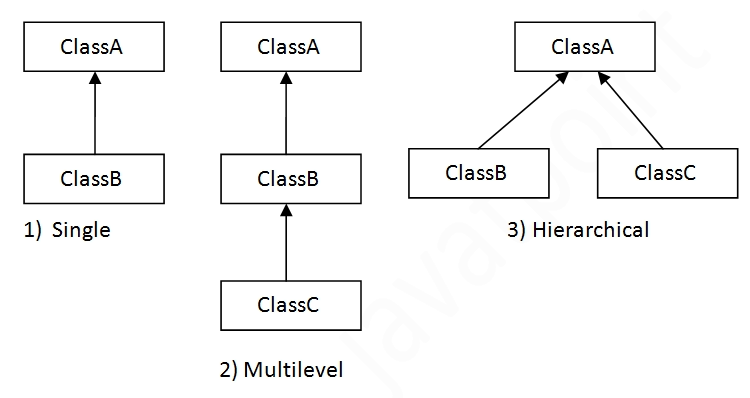
What is Inheritance?
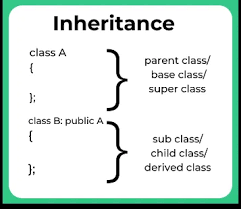
Inheritance is a fundamental concept in object-oriented programming (OOP) that allows a new class (called a subclass or derived class) to inherit properties and behaviors (fields and methods) from an existing class (called a superclass or base class). This mechanism provides a way to create a new class by extending or modifying the behavior of an existing class, promoting code reuse and the creation of a more logical and hierarchical class structure.
What is the purpose of Inheritance?
Inheritance enables the reuse of existing code. By inheriting from a base class, a subclass can leverage existing methods and fields without having to rewrite them. This reduces redundancy and makes the code more maintainable. Inheritance helps in organizing code into a hierarchical structure, which is easier to understand and manage. Classes can be grouped based on shared attributes and behaviors, leading to a clear and logical organization of the codebase. Inheritance is closely related to polymorphism, which allows objects of different classes to be treated as objects of a common superclass. This is particularly useful for implementing flexible and extensible code. For instance, a function can operate on objects of different classes as long as they inherit from the same base class, allowing for dynamic method binding and more generalized code.
Inheritance allows for extending the functionality of existing classes. Subclasses can add new methods and fields or override existing ones to introduce specific behaviors without modifying the original class. This promotes the open/closed principle, where classes are open for extension but closed for modification. Inheritance supports encapsulation by allowing a subclass to access the protected and public members of a superclass while keeping the implementation details private. This ensures a clear separation between the interface and implementation, enhancing modularity and reducing the risk of unintended interactions.
What are Access Modifiers?
Access modifiers are keywords in object-oriented programming languages that set the accessibility of classes, methods/functions, and other members. They control the visibility and accessibility of these elements from different parts of the code, thus enforcing encapsulation and protecting the integrity of the data.
Types of Access Modifiers
- Public
- Private
- Protected
1. Public
Purpose: To make a class, function, or variable available for use in other classes or programs.
2. Private
Purpose: To restrict access to members of a class, thus protecting the integrity of the data.
3. Protected
Purpose: To allow subclasses to inherit and access the members while still restricting access from class's objects.
Inheritance Example related to MQL5
We will first create a UML class diagram for the example to visualize the classes and their relationships and attributes.
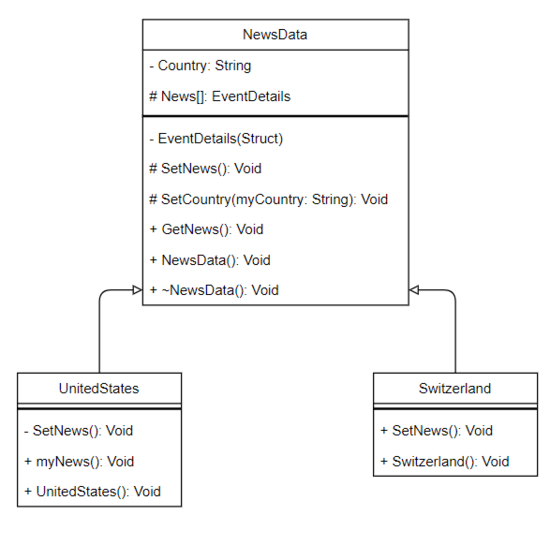
Classes UnitedStates and Switzerland have singular Inheritance from class NewsData:
class NewsData { private://Properties are only accessible from this class string Country;//Private variable struct EventDetails//Private structure { int EventID; string EventName; datetime EventDate; }; protected: //-- Protected Array Only accessible from this class and its children EventDetails News[]; //-- Proctected virtual void Function(to be expanded on via child classes) virtual void SetNews(); //-- Protected Function Only accessible from this class and its children void SetCountry(string myCountry) {Country=myCountry;} public: void GetNews()//Public function to display 'News' array details { PrintFormat("+---------- %s ----------+",Country); for(uint i=0;i<News.Size();i++) { Print("ID: ",News[i].EventID," Name: ",News[i].EventName," Date: ",News[i].EventDate); } } NewsData(void) {}//Class constructor ~NewsData(void) {ArrayFree(News);}//Class destructor }; //+------------------------------------------------------------------+ //|(Subclass/Child) for 'NewsData' | //+------------------------------------------------------------------+ class UnitedStates:private NewsData //private inheritance from NewsData, //'UnitedStates' class's objects and children //will not have access to 'NewsData' class's properties { private: virtual void SetNews()//private Function only Accessible in 'UnitedStates' class { ArrayResize(News,News.Size()+1,News.Size()+2); News[News.Size()-1].EventID = 1; News[News.Size()-1].EventName = "NFP(Non-Farm Payrolls)"; News[News.Size()-1].EventDate = D'2024.01.03 14:00:00'; } public: void myNews()//public Function accessible via class's object { SetCountry("United States");//Calling function from 'NewsData' GetNews();//Calling Function from private inherited class 'NewsData' } UnitedStates(void) {SetNews();}//Class constructor }; //+------------------------------------------------------------------+ //|(Subclass/Child) for 'NewsData' | //+------------------------------------------------------------------+ class Switzerland: public NewsData //public inheritance from NewsData { public: virtual void SetNews()//Public Function to set News data { ArrayResize(News,News.Size()+1,News.Size()+2);//Adjusting News structure array's size News[News.Size()-1].EventID = 0;//Setting event id to '0' News[News.Size()-1].EventName = "Interest Rate Decision";//Assigning event name News[News.Size()-1].EventDate = D'2024.01.06 10:00:00';//Assigning event date } Switzerland(void) {SetCountry("Switerland"); SetNews();}//Class construct };
In this Example:
The (Parent/Base/Super) class would be NewsData and any private declarations will be only accessible by this class. The private declarations will be inaccessible to the class's objects and children. Whilst the protected declarations will be accessible to both the class and its children. Whereas all public declarations will be accessible to the class, its children and objects.
Accessibility Table For NewsData:
| Class's Properties | Class | Children | Objects |
|---|---|---|---|
| Variable: Country(Private) | ✔ | ✘ | ✘ |
| Structure: EventDetails(Private) | ✔ | ✘ | ✘ |
| Variable: News(Protected) | ✔ | ✔ | ✘ |
| Function: SetNews(Protected) | ✔ | ✔ | ✘ |
| Function: SetCountry(Protected) | ✔ | ✔ | ✘ |
| Function: GetNews(Public) | ✔ | ✔ | ✔ |
| Constructor: NewsData(Public) | ✔ | ✘ | ✘ |
| Destructor: ~NewsData(Public) | ✔ | ✘ | ✘ |
class NewsData { private://Properties are only accessible from this class string Country;//Private variable struct EventDetails//Private structure { int EventID; string EventName; datetime EventDate; }; protected: //-- Protected Array Only accessible from this class and its children EventDetails News[]; //-- Proctected virtual void Function(to be expanded on via child classes) virtual void SetNews(); //-- Protected Function Only accessible from this class and its children void SetCountry(string myCountry) {Country=myCountry;} public: void GetNews()//Public function to display 'News' array details { PrintFormat("+---------- %s ----------+",Country); for(uint i=0;i<News.Size();i++) { Print("ID: ",News[i].EventID," Name: ",News[i].EventName," Date: ",News[i].EventDate); } } NewsData(void) {}//Class constructor ~NewsData(void) {ArrayFree(News);}//Class destructor };
Visible Properties from the NewsData Object:
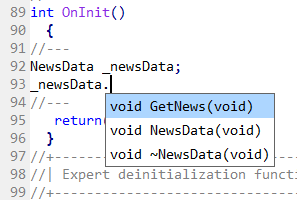
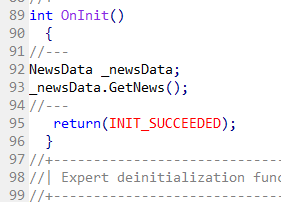
Result from GetNews function in NewsData:

Inheritance is Implemented with the both the remaining classes:
In the (Child/Sub/Derived) class UnitedStates, it inherits the parent(NewsData) class privately.
Meaning that the sub(UnitedStates) class can access the protected and public properties from the parent(NewsData) class, but the children for the UnitedStates class and its objects will not have access to any properties of the parent(NewsData) class. If the inheritance Access Modifier was protective the UnitedStates class's children would have access to both the parent(NewsData) class's protective and public properties, but the sub(UnitedStates) class's objects would not have any access to the parent class's properties.
Accessibility Table For UnitedStates:
| Class's Properties | Class | Children | Objects |
|---|---|---|---|
| Inheritance(Private) Variable: Country(Private) | ✘ | ✘ | ✘ |
| Inheritance(Private) Structure: EventDetails(Private) | ✘ | ✘ | ✘ |
| Inheritance(Private) Variable: News(Protected) | ✔ | ✘ | ✘ |
| Inheritance(Private) Function: SetNews(Protected) | ✔ | ✘ | ✘ |
| Inheritance(Private) Function: SetCountry(Protected) | ✔ | ✘ | ✘ |
| Inheritance(Private) Function: GetNews(Public) | ✔ | ✘ | ✘ |
| Inheritance(Private) Constructor: NewsData(Public) | ✘ | ✘ | ✘ |
| Inheritance(Private) Destructor: ~NewsData(Public) | ✘ | ✘ | ✘ |
| Function: SetNews(Private) | ✔ | ✘ | ✘ |
| Function: myNews(Public) | ✔ | ✔ | ✔ |
| Constructor: UnitedStates(Public) | ✔ | ✘ | ✘ |
class UnitedStates:private NewsData //private inheritance from NewsData, //'UnitedStates' class's objects and children //will not have access to 'NewsData' class's properties { private: virtual void SetNews()//private Function only Accessible in 'UnitedStates' class { ArrayResize(News,News.Size()+1,News.Size()+2); News[News.Size()-1].EventID = 1; News[News.Size()-1].EventName = "NFP(Non-Farm Payrolls)"; News[News.Size()-1].EventDate = D'2024.01.03 14:00:00'; } public: void myNews()//public Function accessible via class's object { SetCountry("United States");//Calling function from 'NewsData' GetNews();//Calling Function from private inherited class 'NewsData' } UnitedStates(void) {SetNews();}//Class constructor };
Visible Properties from the UnitedStates Object:
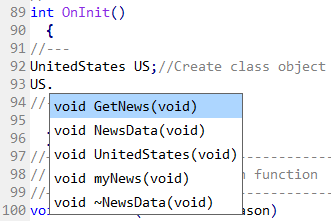
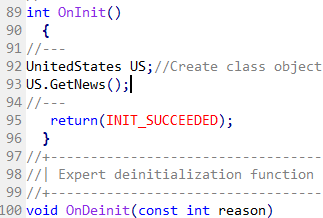
A compile error arises from attempting to access GetNews function which is privately inherited from NewsData, this prevents the UnitedStates object from access to the function.

In the (Child/Sub/Derived) class Switzerland.
The inheritance access modifier is public. This provides the sub(Switzerland) class's children access to the parent(NewsData) class's public and protective properties, whereas the Switzerland class's objects only have access to the public properties of all related classes.
Accessibility Table for Switzerland:
| Class's Properties | Class | Children | Objects |
|---|---|---|---|
| Inheritance(Public) Variable: Country(Private) | ✘ | ✘ | ✘ |
| Inheritance(Public) Structure: EventDetails(Private) | ✘ | ✘ | ✘ |
| Inheritance(Public) Variable: News(Protected) | ✔ | ✔ | ✘ |
| Inheritance(Public) Function: SetNews(Protected) | ✔ | ✔ | ✘ |
| Inheritance(Public) Function: SetCountry(Protected) | ✔ | ✔ | ✘ |
| Inheritance(Public) Function: GetNews(Public) | ✔ | ✔ | ✔ |
| Inheritance(Public) Constructor: NewsData(Public) | ✘ | ✘ | ✘ |
| Inheritance(Public) Destructor: ~NewsData(Public) | ✘ | ✘ | ✘ |
| Function: SetNews(Public) | ✔ | ✔ | ✔ |
| Constructor: Switzerland(Public) | ✔ | ✘ | ✘ |
class Switzerland: public NewsData //public inheritance from NewsData { public: virtual void SetNews()//Public Function to set News data { ArrayResize(News,News.Size()+1,News.Size()+2);//Adjusting News structure array's size News[News.Size()-1].EventID = 0;//Setting event id to '0' News[News.Size()-1].EventName = "Interest Rate Decision";//Assigning event name News[News.Size()-1].EventDate = D'2024.01.06 10:00:00';//Assigning event date } Switzerland(void) {SetCountry("Switerland"); SetNews();}//Class construct };
Visible Properties from the Switzerland Object:
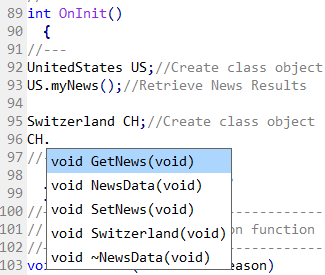
Results:

Daylight Savings Classes
In News Trading Made Easy (Part 1):
UML Class Diagram
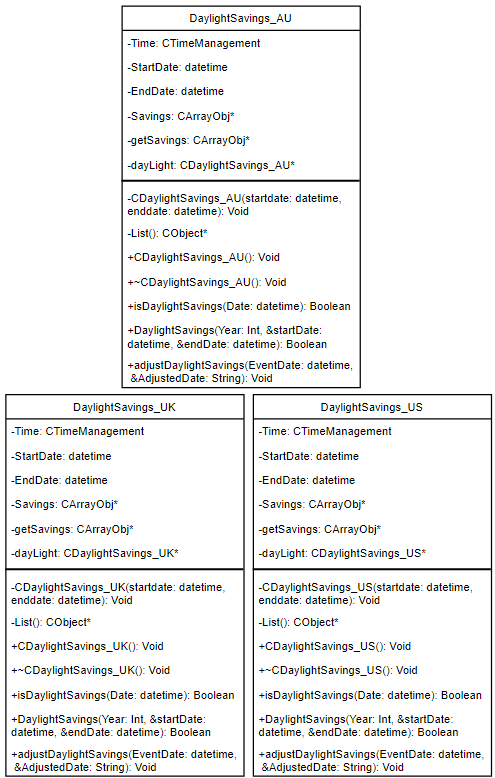
Project files:
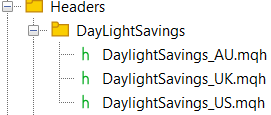
In the previous code we had three classes for Daylight Savings namely:
- CDaylightSavings_AU
- CDaylightSavings_UK
- CDaylightSavings_US
In Part 2:
UML Class Diagram
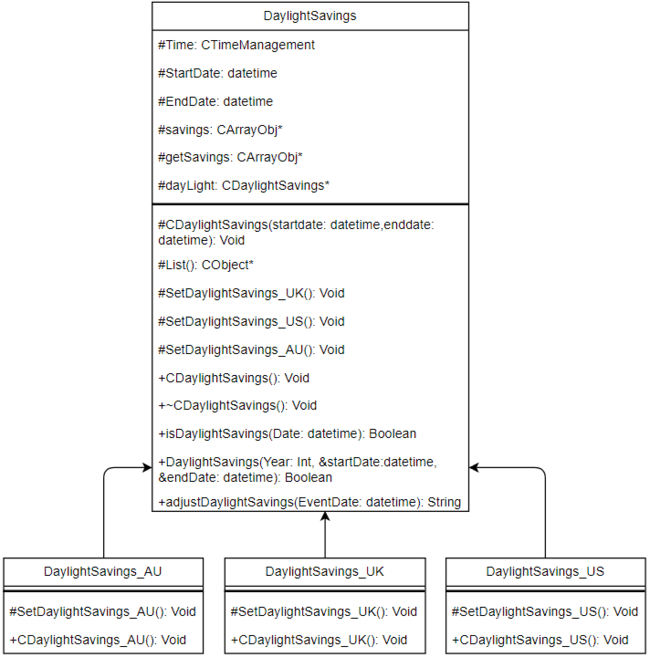
Project files:
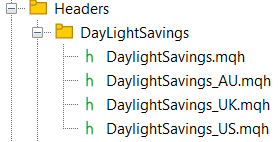
We will have the following classes for Daylight Savings namely:
- CDaylightSavings
- CDaylightSavings_AU
- CDaylightSavings_UK
- CDaylightSavings_US
Why create another Daylight savings class?
In the previous classes' code there was a lot of repetition among the classes, which essentially was the same code written over again for different values in a list. Instead of this repetition occurring amongst similar classes, we will put all the commonalities in one separate class and inherit the common features into the different daylight savings classes.
What are virtual Functions?
In object-oriented programming (OOP), a virtual function is a member function in a base class that you can override in a derived class. When a function is declared as virtual, it enables polymorphism, allowing the derived class to provide a specific implementation of the function that can be called through a base class pointer or reference.
Purpose?
- Polymorphism: Virtual functions allow for dynamic (runtime) polymorphism. This means that the method that gets executed is determined at runtime based on the actual type of the object being referenced, rather than the type of the reference or pointer.
- Flexibility: They enable more flexible and reusable code by allowing derived classes to modify or extend the base class behavior.
- Decoupling: Virtual functions help in decoupling the code by separating the interface from the implementation, making it easier to change the implementation without affecting the code that uses the base class interface.
CDaylightSavings Class
In this class all commonalities of the previous codes are put into one class and we will declare a few virtual functions to initialize the different lists for the respective Daylight Savings schedule.
CDaylightSavings class has a singular Inheritance from CObject class.
CDaylightSavings class has Inclusions from classes:
- CArrayObj
- CTimeManagement
//+------------------------------------------------------------------+ //| NewsTrading | //| Copyright 2024, MetaQuotes Ltd. | //| https://www.mql5.com/en/users/kaaiblo | //+------------------------------------------------------------------+ #include <Object.mqh> #include <Arrays\ArrayObj.mqh> #include "../TimeManagement.mqh" //+------------------------------------------------------------------+ //|DaylightSavings class | //+------------------------------------------------------------------+ class CDaylightSavings: public CObject { protected: CTimeManagement Time; CDaylightSavings(datetime startdate,datetime enddate); CObject *List() { return savings;}//Gets the list of Daylightsavings time datetime StartDate; datetime EndDate; CArrayObj *savings; CArrayObj *getSavings; CDaylightSavings *dayLight; virtual void SetDaylightSavings_UK();//Initialize UK Daylight Savings Dates into List virtual void SetDaylightSavings_US();//Initialize US Daylight Savings Dates into List virtual void SetDaylightSavings_AU();//Initialize AU Daylight Savings Dates into List public: CDaylightSavings(void); ~CDaylightSavings(void); bool isDaylightSavings(datetime Date);//This function checks if a given date falls within Daylight Savings Time. bool DaylightSavings(int Year,datetime &startDate,datetime &endDate);//Check if DaylightSavings Dates are available for a certain Year string adjustDaylightSavings(datetime EventDate);//Will adjust the date's timezone depending on DaylightSavings }; //+------------------------------------------------------------------+ //|Constructor | //+------------------------------------------------------------------+ CDaylightSavings::CDaylightSavings(void) { } //+------------------------------------------------------------------+ //|Initialize variables | //+------------------------------------------------------------------+ CDaylightSavings::CDaylightSavings(datetime startdate,datetime enddate) { StartDate = startdate;//Assign class's global variable StartDate value from parameter variable startdate EndDate = enddate;//Assign class's global variable EndDate value from parameter variable enddate } //+------------------------------------------------------------------+ //|checks if a given date falls within Daylight Savings Time | //+------------------------------------------------------------------+ bool CDaylightSavings::isDaylightSavings(datetime Date) { // Initialize a list to store daylight savings periods. getSavings = List(); // Iterate through all the periods in the list. for(int i=0; i<getSavings.Total(); i++) { // Access the current daylight savings period. dayLight = getSavings.At(i); // Check if the given date is within the current daylight savings period. if(Time.DateIsInRange(dayLight.StartDate,dayLight.EndDate,Date)) { // If yes, return true indicating it is daylight savings time. return true; } } // If no period matches, return false indicating it is not daylight savings time. return false; } //+------------------------------------------------------------------+ //|Check if DaylightSavings Dates are available for a certain Year | //+------------------------------------------------------------------+ bool CDaylightSavings::DaylightSavings(int Year,datetime &startDate,datetime &endDate) { // Initialize a list to store daylight savings periods. getSavings = List(); bool startDateDetected=false,endDateDetected=false; // Iterate through all the periods in the list. for(int i=0; i<getSavings.Total(); i++) { dayLight = getSavings.At(i); if(Year==Time.ReturnYear(dayLight.StartDate))//Check if a certain year's date is available within the DaylightSavings start dates in the List { startDate = dayLight.StartDate; startDateDetected = true; } if(Year==Time.ReturnYear(dayLight.EndDate))//Check if a certain year's date is available within the DaylightSavings end dates in the List { endDate = dayLight.EndDate; endDateDetected = true; } if(startDateDetected&&endDateDetected)//Check if both DaylightSavings start and end dates are found for a certain Year { return true; } } startDate = D'1970.01.01 00:00:00';//Set a default start date if no DaylightSaving date is found endDate = D'1970.01.01 00:00:00';//Set a default end date if no DaylightSaving date is found return false; } //+------------------------------------------------------------------+ //|Will adjust the date's timezone depending on DaylightSavings | //+------------------------------------------------------------------+ string CDaylightSavings::adjustDaylightSavings(datetime EventDate) { if(isDaylightSavings(TimeTradeServer()))//Check if the current tradeserver time is already within the DaylightSavings Period { if(isDaylightSavings(EventDate))//Checks if the event time is during daylight savings { return TimeToString(EventDate);//normal event time } else { return TimeToString((datetime)(EventDate-Time.HoursS()));//event time minus an hour for DST } } else { if(isDaylightSavings(EventDate))//Checks if the event time is during daylight savings { return TimeToString((datetime)(Time.HoursS()+EventDate));//event time plus an hour for DST } else { return TimeToString(EventDate);//normal event time } } } //+------------------------------------------------------------------+ //|Destructor | //+------------------------------------------------------------------+ CDaylightSavings::~CDaylightSavings(void) { delete savings;//Delete CArrayObj Pointer delete dayLight;//Delete CDaylightSavings Pointer delete getSavings;//Delete CArrayObj Pointer } //+------------------------------------------------------------------+
CDaylightSavings_AU Class
In this class we expand upon the virtual void SetDaylightSavings_AU and proceed to add the Daylight Savings Schedule for Australia.
Australian Daylight Savings Time dates were found here.
CDaylightSavings_AU class has multilevel Inheritance from classes:
- CDaylightSavings
- CObject
CDaylightSavings_AU class has hierarchical Inheritance from classes:
- CDaylightSavings
- CArrayObj
- CTimeManagement
//+------------------------------------------------------------------+ //| NewsTrading | //| Copyright 2024, MetaQuotes Ltd. | //| https://www.mql5.com/en/users/kaaiblo | //+------------------------------------------------------------------+ #include "DaylightSavings.mqh" //+------------------------------------------------------------------+ //|DaylightSavings_AU class | //+------------------------------------------------------------------+ class CDaylightSavings_AU: public CDaylightSavings { public: CDaylightSavings_AU(void); }; //+------------------------------------------------------------------+ //|Set Daylight Savings Schedule for Australia | //+------------------------------------------------------------------+ void CDaylightSavings::SetDaylightSavings_AU() { savings = new CArrayObj(); //Daylight savings dates to readjust dates in the database for accurate testing in the strategy tester savings.Add(new CDaylightSavings(D'2006.10.29 03:00:00',D'2007.03.25 02:00:00')); savings.Add(new CDaylightSavings(D'2007.10.28 03:00:00',D'2008.04.06 02:00:00')); savings.Add(new CDaylightSavings(D'2008.10.05 03:00:00',D'2009.04.05 02:00:00')); savings.Add(new CDaylightSavings(D'2009.10.04 03:00:00',D'2010.04.04 02:00:00')); savings.Add(new CDaylightSavings(D'2010.10.03 03:00:00',D'2011.04.03 02:00:00')); savings.Add(new CDaylightSavings(D'2011.10.02 03:00:00',D'2012.04.01 02:00:00')); savings.Add(new CDaylightSavings(D'2012.10.07 03:00:00',D'2013.04.07 02:00:00')); savings.Add(new CDaylightSavings(D'2013.10.06 03:00:00',D'2014.04.06 02:00:00')); savings.Add(new CDaylightSavings(D'2014.10.05 03:00:00',D'2015.04.05 02:00:00')); savings.Add(new CDaylightSavings(D'2015.10.04 03:00:00',D'2016.04.03 02:00:00')); savings.Add(new CDaylightSavings(D'2016.10.02 03:00:00',D'2017.04.02 02:00:00')); savings.Add(new CDaylightSavings(D'2017.10.01 03:00:00',D'2018.04.01 02:00:00')); savings.Add(new CDaylightSavings(D'2018.10.07 03:00:00',D'2019.04.07 02:00:00')); savings.Add(new CDaylightSavings(D'2019.10.06 03:00:00',D'2020.04.05 02:00:00')); savings.Add(new CDaylightSavings(D'2020.10.04 03:00:00',D'2021.04.04 02:00:00')); savings.Add(new CDaylightSavings(D'2021.10.03 03:00:00',D'2022.04.03 02:00:00')); savings.Add(new CDaylightSavings(D'2022.10.02 03:00:00',D'2023.04.02 02:00:00')); savings.Add(new CDaylightSavings(D'2023.10.01 03:00:00',D'2024.04.07 02:00:00')); savings.Add(new CDaylightSavings(D'2024.10.06 03:00:00',D'2025.04.06 02:00:00')); savings.Add(new CDaylightSavings(D'2025.10.05 03:00:00',D'2026.04.05 02:00:00')); savings.Add(new CDaylightSavings(D'2026.10.04 03:00:00',D'2027.04.04 02:00:00')); savings.Add(new CDaylightSavings(D'2027.10.03 03:00:00',D'2028.04.02 02:00:00')); savings.Add(new CDaylightSavings(D'2028.10.01 03:00:00',D'2029.04.01 02:00:00')); } //+------------------------------------------------------------------+ //|Constructor | //+------------------------------------------------------------------+ CDaylightSavings_AU::CDaylightSavings_AU(void) { SetDaylightSavings_AU(); } //+------------------------------------------------------------------+
CDaylightSavings_UK Class
In this class we expand upon the virtual void SetDaylightSavings_UK and proceed to add the Daylight Savings Schedule for Europe.
United Kingdom Daylight Savings Time dates were found here.
CDaylightSavings_UK class has multilevel Inheritance from classes:
- CDaylightSavings
- CObject
CDaylightSavings_UK class has hierarchical Inheritance from classes:
- CDaylightSavings
- CArrayObj
- CTimeManagement
//+------------------------------------------------------------------+ //| NewsTrading | //| Copyright 2024, MetaQuotes Ltd. | //| https://www.mql5.com/en/users/kaaiblo | //+------------------------------------------------------------------+ #include "DaylightSavings.mqh" //+------------------------------------------------------------------+ //|DaylightSavings_UK class | //+------------------------------------------------------------------+ class CDaylightSavings_UK: public CDaylightSavings { public: CDaylightSavings_UK(void); }; //+------------------------------------------------------------------+ //|Set Daylight Savings Schedule for Europe | //+------------------------------------------------------------------+ void CDaylightSavings::SetDaylightSavings_UK() { savings = new CArrayObj(); //Daylight savings dates to readjust dates in the database for accurate testing in the strategy tester savings.Add(new CDaylightSavings(D'2007.03.25 02:00:00',D'2007.10.28 01:00:00')); savings.Add(new CDaylightSavings(D'2008.03.30 02:00:00',D'2008.10.26 01:00:00')); savings.Add(new CDaylightSavings(D'2009.03.29 02:00:00',D'2009.10.25 01:00:00')); savings.Add(new CDaylightSavings(D'2010.03.28 02:00:00',D'2010.10.31 01:00:00')); savings.Add(new CDaylightSavings(D'2011.03.27 02:00:00',D'2011.10.30 01:00:00')); savings.Add(new CDaylightSavings(D'2012.03.25 02:00:00',D'2012.10.28 01:00:00')); savings.Add(new CDaylightSavings(D'2013.03.31 02:00:00',D'2013.10.27 01:00:00')); savings.Add(new CDaylightSavings(D'2014.03.30 02:00:00',D'2014.10.26 01:00:00')); savings.Add(new CDaylightSavings(D'2015.03.29 02:00:00',D'2015.10.25 01:00:00')); savings.Add(new CDaylightSavings(D'2016.03.27 02:00:00',D'2016.10.30 01:00:00')); savings.Add(new CDaylightSavings(D'2017.03.26 02:00:00',D'2017.10.29 01:00:00')); savings.Add(new CDaylightSavings(D'2018.03.25 02:00:00',D'2018.10.28 01:00:00')); savings.Add(new CDaylightSavings(D'2019.03.31 02:00:00',D'2019.10.27 01:00:00')); savings.Add(new CDaylightSavings(D'2020.03.29 02:00:00',D'2020.10.25 01:00:00')); savings.Add(new CDaylightSavings(D'2021.03.28 02:00:00',D'2021.10.31 01:00:00')); savings.Add(new CDaylightSavings(D'2022.03.27 02:00:00',D'2022.10.30 01:00:00')); savings.Add(new CDaylightSavings(D'2023.03.26 02:00:00',D'2023.10.29 01:00:00')); savings.Add(new CDaylightSavings(D'2024.03.31 02:00:00',D'2024.10.27 01:00:00')); savings.Add(new CDaylightSavings(D'2025.03.30 02:00:00',D'2025.10.26 01:00:00')); savings.Add(new CDaylightSavings(D'2026.03.29 02:00:00',D'2026.10.25 01:00:00')); savings.Add(new CDaylightSavings(D'2027.03.28 02:00:00',D'2027.10.31 01:00:00')); savings.Add(new CDaylightSavings(D'2028.03.26 02:00:00',D'2028.10.29 01:00:00')); savings.Add(new CDaylightSavings(D'2029.03.25 02:00:00',D'2029.10.28 01:00:00')); } //+------------------------------------------------------------------+ //|Constructor | //+------------------------------------------------------------------+ CDaylightSavings_UK::CDaylightSavings_UK(void) { SetDaylightSavings_UK(); } //+------------------------------------------------------------------+
CDaylightSavings_US Class
In this class we expand upon the virtual void SetDaylightSavings_US and proceed to add the Daylight Savings Schedule for United States.
United States Daylight Savings Time dates were found here.
CDaylightSavings_US class has multilevel Inheritance from classes:
- CDaylightSavings
- CObject
CDaylightSavings_US class has hierarchical Inheritance from classes:
- CDaylightSavings
- CArrayObj
- CTimeManagement
//+------------------------------------------------------------------+ //| NewsTrading | //| Copyright 2024, MetaQuotes Ltd. | //| https://www.mql5.com/en/users/kaaiblo | //+------------------------------------------------------------------+ #include "DaylightSavings.mqh" //+------------------------------------------------------------------+ //|DaylightSavings_US Class | //+------------------------------------------------------------------+ class CDaylightSavings_US: public CDaylightSavings { public: CDaylightSavings_US(void); }; //+------------------------------------------------------------------+ //|Set Daylight Savings Schedule for the United States | //+------------------------------------------------------------------+ void CDaylightSavings::SetDaylightSavings_US() { savings = new CArrayObj(); //Daylight savings dates to readjust dates in the database for accurate testing in the strategy tester savings.Add(new CDaylightSavings(D'2007.03.11 03:00:00',D'2007.11.04 01:00:00')); savings.Add(new CDaylightSavings(D'2008.03.09 03:00:00',D'2008.11.02 01:00:00')); savings.Add(new CDaylightSavings(D'2009.03.08 03:00:00',D'2009.11.01 01:00:00')); savings.Add(new CDaylightSavings(D'2010.03.14 03:00:00',D'2010.11.07 01:00:00')); savings.Add(new CDaylightSavings(D'2011.03.13 03:00:00',D'2011.11.06 01:00:00')); savings.Add(new CDaylightSavings(D'2012.03.11 03:00:00',D'2012.11.04 01:00:00')); savings.Add(new CDaylightSavings(D'2013.03.10 03:00:00',D'2013.11.03 01:00:00')); savings.Add(new CDaylightSavings(D'2014.03.09 03:00:00',D'2014.11.02 01:00:00')); savings.Add(new CDaylightSavings(D'2015.03.08 03:00:00',D'2015.11.01 01:00:00')); savings.Add(new CDaylightSavings(D'2016.03.13 03:00:00',D'2016.11.06 01:00:00')); savings.Add(new CDaylightSavings(D'2017.03.12 03:00:00',D'2017.11.05 01:00:00')); savings.Add(new CDaylightSavings(D'2018.03.11 03:00:00',D'2018.11.04 01:00:00')); savings.Add(new CDaylightSavings(D'2019.03.10 03:00:00',D'2019.11.03 01:00:00')); savings.Add(new CDaylightSavings(D'2020.03.08 03:00:00',D'2020.11.01 01:00:00')); savings.Add(new CDaylightSavings(D'2021.03.14 03:00:00',D'2021.11.07 01:00:00')); savings.Add(new CDaylightSavings(D'2022.03.13 03:00:00',D'2022.11.06 01:00:00')); savings.Add(new CDaylightSavings(D'2023.03.12 03:00:00',D'2023.11.05 01:00:00')); savings.Add(new CDaylightSavings(D'2024.03.10 03:00:00',D'2024.11.03 01:00:00')); savings.Add(new CDaylightSavings(D'2025.03.09 03:00:00',D'2025.11.02 01:00:00')); savings.Add(new CDaylightSavings(D'2026.03.08 03:00:00',D'2026.11.01 01:00:00')); savings.Add(new CDaylightSavings(D'2027.03.14 03:00:00',D'2027.11.07 01:00:00')); savings.Add(new CDaylightSavings(D'2028.03.12 03:00:00',D'2028.11.05 01:00:00')); savings.Add(new CDaylightSavings(D'2029.03.11 03:00:00',D'2029.11.04 01:00:00')); } //+------------------------------------------------------------------+ //|Constructor | //+------------------------------------------------------------------+ CDaylightSavings_US::CDaylightSavings_US(void) { SetDaylightSavings_US(); } //+------------------------------------------------------------------+
Symbol Properties Class
In this class we will set a symbol in which we would like to retrieve data from. This class will provide an easy and quick method for us to get symbol properties within other classes and therefore removing redundance in our code.
We will select a combination of properties to retrieve the list could be expanded upon but for not the list goes as follows:
- Ask Price
- Bid Price
- Contract Size
- Minimum Volume
- Maximum Volume
- Volume Step
- Volume Limit
- Spread
- Stops Level
- Freeze Level
- Symbol's Time
- Symbol's Normalized Price
- Symbol's Digits
- Symbol's Point
- Symbol's Trade Mode
- Sum of Symbol's Orders' Volume
- Sum of Symbol's Positions' Volume
- Symbol's Currency Base
- Symbol's Currency Profit
- Symbol's Currency Margin
- Symbol's Custom status
- Symbol's Background color
CSymbolProperties class has inclusion from class CSymbolInfo.
//+------------------------------------------------------------------+ //| NewsTrading | //| Copyright 2024, MetaQuotes Ltd. | //| https://www.mql5.com/en/users/kaaiblo | //+------------------------------------------------------------------+ #include <Trade/SymbolInfo.mqh> //+------------------------------------------------------------------+ //|SymbolProperties class | //+------------------------------------------------------------------+ class CSymbolProperties { private: double ASK;//Store Ask Price double BID;//Store Bid Price double LOTSMIN;//Store Minimum Lotsize double LOTSMAX;//Store Maximum Lotsize double LOTSSTEP;//Store Lotsize Step double LOTSLIMIT;//Store Lotsize Limit(Maximum sum of Volume) long SPREAD;//Store Spread value long STOPLEVEL;//Store Stop level long FREEZELEVEL;//Store Freeze level long TIME;//Store time long DIGITS;//Store Digits double POINT;//Store Point double ORDERSVOLUME;//Store Orders volume double POSITIONSVOLUME;//Store Positions volume long CUSTOM;//Store if Symbol is Custom long BACKGROUND_CLR;//Store Symbol's background color protected: CSymbolInfo CSymbol;//Creating class CSymbolInfo's Object bool SetSymbolName(string SYMBOL) { //-- If Symbol's name was successfully set. if(!CSymbol.Name((SYMBOL==NULL)?Symbol():SYMBOL)) { Print("Invalid Symbol: ",SYMBOL); return false; } return true; } //-- Retrieve Symbol's name string GetSymbolName() { return CSymbol.Name(); } public: CSymbolProperties(void);//Constructor double Ask(string SYMBOL=NULL);//Retrieve Ask Price double Bid(string SYMBOL=NULL);//Retrieve Bid Price double ContractSize(string SYMBOL=NULL);//Retrieve Contract Size double LotsMin(string SYMBOL=NULL);//Retrieve Min Volume double LotsMax(string SYMBOL=NULL);//Retrieve Max Volume double LotsStep(string SYMBOL=NULL);//Retrieve Volume Step double LotsLimit(string SYMBOL=NULL);//Retrieve Volume Limit int Spread(string SYMBOL=NULL);//Retrieve Spread int StopLevel(string SYMBOL=NULL);//Retrieve Stop Level int FreezeLevel(string SYMBOL=NULL);//Retrieve Freeze Level datetime Time(string SYMBOL=NULL);//Retrieve Symbol's Time //-- Normalize Price double NormalizePrice(const double price,string SYMBOL=NULL); int Digits(string SYMBOL=NULL);//Retrieve Symbol's Digits double Point(string SYMBOL=NULL);//Retrieve Symbol's Point ENUM_SYMBOL_TRADE_MODE TradeMode(string SYMBOL=NULL);//Retrieve Symbol's Trade Mode double OrdersVolume(string SYMBOL=NULL);//Retrieve Symbol's Orders Volume double PositionsVolume(string SYMBOL=NULL);//Retrieve Symbol's Positions Volume string CurrencyBase(string SYMBOL=NULL);//Retrieve Symbol's Currency Base string CurrencyProfit(string SYMBOL=NULL);//Retrieve Symbol's Currency Profit string CurrencyMargin(string SYMBOL=NULL);//Retrieve Symbol's Currency Margin bool Custom(string SYMBOL=NULL);//Retrieve Symbol's Custom status color SymbolBackground(string SYMBOL=NULL,bool allow_black=false);//Retrieve Symbol's Background color }; //+------------------------------------------------------------------+ //|Constructor | //+------------------------------------------------------------------+ //Initializing Variables CSymbolProperties::CSymbolProperties(void):ASK(0.0),BID(0.0), LOTSMIN(0.0),LOTSMAX(0.0), LOTSSTEP(0.0),LOTSLIMIT(0.0),DIGITS(0), SPREAD(0),STOPLEVEL(0),ORDERSVOLUME(0.0), FREEZELEVEL(0),TIME(0),POINT(0.0),POSITIONSVOLUME(0.0), CUSTOM(0),BACKGROUND_CLR(0) { } //+------------------------------------------------------------------+ //|Retrieve Ask Price | //+------------------------------------------------------------------+ double CSymbolProperties::Ask(string SYMBOL=NULL) { if(SetSymbolName(SYMBOL))//Set Symbol { if(CSymbol.InfoDouble(SYMBOL_ASK,ASK)) { return ASK; } } Print("Unable to retrieve Symbol's Ask Price"); return 0.0; } //+------------------------------------------------------------------+ //|Retrieve Bid Price | //+------------------------------------------------------------------+ double CSymbolProperties::Bid(string SYMBOL=NULL) { if(SetSymbolName(SYMBOL))//Set Symbol { if(CSymbol.InfoDouble(SYMBOL_BID,BID)) { return BID; } } Print("Unable to retrieve Symbol's Bid Price"); return 0.0; } //+------------------------------------------------------------------+ //|Retrieve Contract Size | //+------------------------------------------------------------------+ double CSymbolProperties::ContractSize(string SYMBOL=NULL) { if(SetSymbolName(SYMBOL))//Set Symbol { if(CSymbol.Refresh()) { return CSymbol.ContractSize(); } } Print("Unable to retrieve Symbol's Contract size"); return 0.0; } //+------------------------------------------------------------------+ //|Retrieve Min Volume | //+------------------------------------------------------------------+ double CSymbolProperties::LotsMin(string SYMBOL=NULL) { if(SetSymbolName(SYMBOL))//Set Symbol { if(CSymbol.InfoDouble(SYMBOL_VOLUME_MIN,LOTSMIN)) { return LOTSMIN; } } Print("Unable to retrieve Symbol's LotsMin"); return 0.0; } //+------------------------------------------------------------------+ //|Retrieve Max Volume | //+------------------------------------------------------------------+ double CSymbolProperties::LotsMax(string SYMBOL=NULL) { if(SetSymbolName(SYMBOL))//Set Symbol { if(CSymbol.InfoDouble(SYMBOL_VOLUME_MAX,LOTSMAX)) { return LOTSMAX; } } Print("Unable to retrieve Symbol's LotsMax"); return 0.0; } //+------------------------------------------------------------------+ //|Retrieve Volume Step | //+------------------------------------------------------------------+ double CSymbolProperties::LotsStep(string SYMBOL=NULL) { if(SetSymbolName(SYMBOL))//Set Symbol { if(CSymbol.InfoDouble(SYMBOL_VOLUME_STEP,LOTSSTEP)) { return LOTSSTEP; } } Print("Unable to retrieve Symbol's LotsStep"); return 0.0; } //+------------------------------------------------------------------+ //|Retrieve Volume Limit | //+------------------------------------------------------------------+ double CSymbolProperties::LotsLimit(string SYMBOL=NULL) { if(SetSymbolName(SYMBOL))//Set Symbol { if(CSymbol.InfoDouble(SYMBOL_VOLUME_LIMIT,LOTSLIMIT)) { return LOTSLIMIT; } } Print("Unable to retrieve Symbol's LotsLimit"); return 0.0; } //+------------------------------------------------------------------+ //|Retrieve Spread | //+------------------------------------------------------------------+ int CSymbolProperties::Spread(string SYMBOL=NULL) { if(SetSymbolName(SYMBOL))//Set Symbol { if(CSymbol.InfoInteger(SYMBOL_SPREAD,SPREAD)) { return int(SPREAD); } } Print("Unable to retrieve Symbol's Spread"); return 0; } //+------------------------------------------------------------------+ //|Retrieve Stop Level | //+------------------------------------------------------------------+ int CSymbolProperties::StopLevel(string SYMBOL=NULL) { if(SetSymbolName(SYMBOL))//Set Symbol { if(CSymbol.InfoInteger(SYMBOL_TRADE_STOPS_LEVEL,STOPLEVEL)) { return int(STOPLEVEL); } } Print("Unable to retrieve Symbol's StopLevel"); return 0; } //+------------------------------------------------------------------+ //|Retrieve Freeze Level | //+------------------------------------------------------------------+ int CSymbolProperties::FreezeLevel(string SYMBOL=NULL) { if(SetSymbolName(SYMBOL))//Set Symbol { if(CSymbol.InfoInteger(SYMBOL_TRADE_FREEZE_LEVEL,FREEZELEVEL)) { return int(FREEZELEVEL); } } Print("Unable to retrieve Symbol's FreezeLevel"); return 0; } //+------------------------------------------------------------------+ //|Retrieve Symbol's Time | //+------------------------------------------------------------------+ datetime CSymbolProperties::Time(string SYMBOL=NULL) { if(SetSymbolName(SYMBOL))//Set Symbol { if(CSymbol.InfoInteger(SYMBOL_TIME,TIME)) { return datetime(TIME); } } Print("Unable to retrieve Symbol's Time"); TIME=0; return datetime(TIME); } //+------------------------------------------------------------------+ //|Normalize Price | //+------------------------------------------------------------------+ double CSymbolProperties::NormalizePrice(const double price,string SYMBOL=NULL) { if(SetSymbolName(SYMBOL))//Set Symbol { if(CSymbol.Refresh()&&CSymbol.RefreshRates()) { return CSymbol.NormalizePrice(price); } } Print("Unable to Normalize Symbol's Price"); return price; } //+------------------------------------------------------------------+ //|Retrieve Symbol's Digits | //+------------------------------------------------------------------+ int CSymbolProperties::Digits(string SYMBOL=NULL) { if(SetSymbolName(SYMBOL))//Set Symbol { if(CSymbol.InfoInteger(SYMBOL_DIGITS,DIGITS)) { return int(DIGITS); } } Print("Unable to retrieve Symbol's Digits"); return 0; } //+------------------------------------------------------------------+ //|Retrieve Symbol's Point | //+------------------------------------------------------------------+ double CSymbolProperties::Point(string SYMBOL=NULL) { if(SetSymbolName(SYMBOL))//Set Symbol { if(CSymbol.InfoDouble(SYMBOL_POINT,POINT)) { return POINT; } } Print("Unable to retrieve Symbol's Point"); return 0.0; } //+------------------------------------------------------------------+ //|Retrieve Symbol's Trade Mode | //+------------------------------------------------------------------+ ENUM_SYMBOL_TRADE_MODE CSymbolProperties::TradeMode(string SYMBOL=NULL) { if(SetSymbolName(SYMBOL))//Set Symbol { if(CSymbol.Refresh()) { return CSymbol.TradeMode(); } } Print("Unable to retrieve Symbol's TradeMode"); return SYMBOL_TRADE_MODE_DISABLED; } //+------------------------------------------------------------------+ //|Retrieve Symbol's Orders Volume | //+------------------------------------------------------------------+ double CSymbolProperties::OrdersVolume(string SYMBOL=NULL) { if(SetSymbolName(SYMBOL))//Set Symbol { for(int i=0; i<OrdersTotal(); i++) { if(OrderSelect(OrderGetTicket(i))) { if(OrderGetString(ORDER_SYMBOL)==GetSymbolName()) { ORDERSVOLUME+=OrderGetDouble(ORDER_VOLUME_CURRENT); } } } } else { Print("Unable to retrieve Symbol's OrdersVolume"); return 0.0; } return ORDERSVOLUME; } //+------------------------------------------------------------------+ //|Retrieve Symbol's Positions Volume | //+------------------------------------------------------------------+ double CSymbolProperties::PositionsVolume(string SYMBOL=NULL) { if(SetSymbolName(SYMBOL))//Set Symbol { for(int i=0; i<PositionsTotal(); i++) { if(PositionGetTicket(i)>0) { if(PositionGetString(POSITION_SYMBOL)==GetSymbolName()) { POSITIONSVOLUME+=PositionGetDouble(POSITION_VOLUME); } } } } else { Print("Unable to retrieve Symbol's PositionsVolume"); return 0.0; } return POSITIONSVOLUME; } //+------------------------------------------------------------------+ //|Retrieve Symbol's Currency Base | //+------------------------------------------------------------------+ string CSymbolProperties::CurrencyBase(string SYMBOL=NULL) { if(SetSymbolName(SYMBOL))//Set Symbol { if(CSymbol.Refresh()) { return CSymbol.CurrencyBase(); } } Print("Unable to retrieve Symbol's CurrencyBase"); return ""; } //+------------------------------------------------------------------+ //|Retrieve Symbol's Currency Profit | //+------------------------------------------------------------------+ string CSymbolProperties::CurrencyProfit(string SYMBOL=NULL) { if(SetSymbolName(SYMBOL))//Set Symbol { if(CSymbol.Refresh()) { return CSymbol.CurrencyProfit(); } } Print("Unable to retrieve Symbol's CurrencyProfit"); return ""; } //+------------------------------------------------------------------+ //|Retrieve Symbol's Currency Margin | //+------------------------------------------------------------------+ string CSymbolProperties::CurrencyMargin(string SYMBOL=NULL) { if(SetSymbolName(SYMBOL))//Set Symbol { if(CSymbol.Refresh()) { return CSymbol.CurrencyMargin(); } } Print("Unable to retrieve Symbol's CurrencyMargin"); return ""; } //+------------------------------------------------------------------+ //|Retrieve Symbol's Custom status | //+------------------------------------------------------------------+ bool CSymbolProperties::Custom(string SYMBOL=NULL) { if(SetSymbolName(SYMBOL))//Set Symbol { if(CSymbol.InfoInteger(SYMBOL_CUSTOM,CUSTOM)) { return bool(CUSTOM); } } Print("Unable to retrieve if Symbol is Custom"); return false; } //+------------------------------------------------------------------+ //|Retrieve Symbol's Background color | //+------------------------------------------------------------------+ color CSymbolProperties::SymbolBackground(string SYMBOL=NULL,bool allow_black=false) { if(SetSymbolName(SYMBOL))//Set Symbol { if(CSymbol.InfoInteger(SYMBOL_BACKGROUND_COLOR,BACKGROUND_CLR)) { /*Avoid any Symbol black background color */ BACKGROUND_CLR = ((ColorToString(color(BACKGROUND_CLR))=="0,0,0"|| color(BACKGROUND_CLR)==clrBlack)&&!allow_black)? long(StringToColor("236,236,236")):BACKGROUND_CLR; return color(BACKGROUND_CLR); } } Print("Unable to retrieve Symbol's Background color"); return color(StringToColor("236,236,236"));//Retrieve a lightish gray color } //+------------------------------------------------------------------+
In the class's constructor below, we initialize the variables we declared earlier such as the double variable ASK, and we assign ASK the value 0.0 as we don't yet have the Ask price for the Symbol.
//Initializing Variables CSymbolProperties::CSymbolProperties(void):ASK(0.0),BID(0.0), LOTSMIN(0.0),LOTSMAX(0.0), LOTSSTEP(0.0),LOTSLIMIT(0.0),DIGITS(0), SPREAD(0),STOPLEVEL(0),ORDERSVOLUME(0.0), FREEZELEVEL(0),TIME(0),POINT(0.0),POSITIONSVOLUME(0.0), CUSTOM(0),BACKGROUND_CLR(0) { }
In the code below we go through and order of steps to finally retrieve the Symbol's ask price.

1. Firstly we have an optional parameter where we can decide to input or edit the Symbol's name in the variable SYMBOL.
2. We then set the Symbol's name to the parameter value. If the parameter value is still the default value of NULL we will assume that we want the Symbol's properties for the current chart's Symbol - Symbol().
3. If we cannot find the Symbol's name we will Print an error message to notify the user that the Symbol's Ask price cannot be retrieved and return 0.0
4. Once we were able to set the Symbol's name we will retrieve the ask price for that specific Symbol and return the value.
double CSymbolProperties::Ask(string SYMBOL=NULL) { if(SetSymbolName(SYMBOL)) { if(CSymbol.InfoDouble(SYMBOL_ASK,ASK)) { return ASK; } } Print("Unable to retrieve Symbol's Ask Price"); return 0.0; }
bool SetSymbolName(string SYMBOL)
{
//-- If Symbol's name was successfully set.
if(!CSymbol.Name((SYMBOL==NULL)?Symbol():SYMBOL))
{
Print("Invalid Symbol: ",SYMBOL);
return false;
}
return true;
} The function below will retrieve the Symbol's Bid Price based of the SYMBOL variable.
![]()
double CSymbolProperties::Bid(string SYMBOL=NULL) { if(SetSymbolName(SYMBOL))//Set Symbol { if(CSymbol.InfoDouble(SYMBOL_BID,BID)) { return BID; } } Print("Unable to retrieve Symbol's Bid Price"); return 0.0; }
The function below will retrieve the Symbol's Contract size. A Symbol's contract size affects the trader as a higher contract size increases risk on the individual's trades. Whereas a lower contract size will decrease risk on an individual's trades.
![]()
double CSymbolProperties::ContractSize(string SYMBOL=NULL) { if(SetSymbolName(SYMBOL))//Set Symbol { if(CSymbol.Refresh()) { return CSymbol.ContractSize(); } } Print("Unable to retrieve Symbol's Contract size"); return 0.0; }
The function below will retrieve the Symbol's Minimum allowed lot-size/volume. Meaning the trader cannot open a position with a lot-size less than the minimum.
![]()
double CSymbolProperties::LotsMin(string SYMBOL=NULL) { if(SetSymbolName(SYMBOL))//Set Symbol { if(CSymbol.InfoDouble(SYMBOL_VOLUME_MIN,LOTSMIN)) { return LOTSMIN; } } Print("Unable to retrieve Symbol's LotsMin"); return 0.0; }
The function below will retrieve the Symbol's Maximum allowed lot-size/volume. This implies that the trader will not be allowed to open a position with a higher lot-size/volume than the maximum, but they may open multiple positions that could sum up to a higher lot-size/volume than the maximum depending on the broker's volume limit and account's orders limit.
double CSymbolProperties::LotsMax(string SYMBOL=NULL) { if(SetSymbolName(SYMBOL))//Set Symbol { if(CSymbol.InfoDouble(SYMBOL_VOLUME_MAX,LOTSMAX)) { return LOTSMAX; } } Print("Unable to retrieve Symbol's LotsMax"); return 0.0; }
The function below will retrieve the Symbol's Volume/lot-size Step. Meaning that the lot-size should have an interval of this value. Example if the volume step is 1 the trader cannot select a lot-size/volume of 1.5.
double CSymbolProperties::LotsStep(string SYMBOL=NULL) { if(SetSymbolName(SYMBOL))//Set Symbol { if(CSymbol.InfoDouble(SYMBOL_VOLUME_STEP,LOTSSTEP)) { return LOTSSTEP; } } Print("Unable to retrieve Symbol's LotsStep"); return 0.0; }
The function below will retrieve the Symbol's Volume/lot-size Limit. This is the sum of volume/lot-sizes that are allowed to be placed before restrictions are implemented on the trader's account for the specific Symbol.
double CSymbolProperties::LotsLimit(string SYMBOL=NULL) { if(SetSymbolName(SYMBOL))//Set Symbol { if(CSymbol.InfoDouble(SYMBOL_VOLUME_LIMIT,LOTSLIMIT)) { return LOTSLIMIT; } } Print("Unable to retrieve Symbol's LotsLimit"); return 0.0; }
The function below will retrieve the Symbol's Spread. The spread affects traders as the higher the Symbol's spread is the less profitable the trader will be, depending on the spread, a strategy could be profitable or not, obviously there are many different circumstances that could make a strategy unprofitable but the Symbol's spread could be a significant circumstance. Spreads are essentially a form of income for your broker, you could think of it as the broker's tax for that Symbol.
![]()
int CSymbolProperties::Spread(string SYMBOL=NULL) { if(SetSymbolName(SYMBOL))//Set Symbol { if(CSymbol.InfoInteger(SYMBOL_SPREAD,SPREAD)) { return int(SPREAD); } } Print("Unable to retrieve Symbol's Spread"); return 0; }
The function below will retrieve the Symbol's Stops level. This is a restriction on the minimum distance between an open-price and stoploss or take-profit as well as the minimum distance between the current price Ask or Bid and the price of opening an order.
![]()
int CSymbolProperties::StopLevel(string SYMBOL=NULL) { if(SetSymbolName(SYMBOL))//Set Symbol { if(CSymbol.InfoInteger(SYMBOL_TRADE_STOPS_LEVEL,STOPLEVEL)) { return int(STOPLEVEL); } } Print("Unable to retrieve Symbol's StopLevel"); return 0; }
The function below will retrieve the Symbol's Freeze level. This is the minimum distance a price has to move from it's open-price for the trade to be allowed closure(when you are allowed to close the specific trade in a profit or loss).
int CSymbolProperties::FreezeLevel(string SYMBOL=NULL) { if(SetSymbolName(SYMBOL))//Set Symbol { if(CSymbol.InfoInteger(SYMBOL_TRADE_FREEZE_LEVEL,FREEZELEVEL)) { return int(FREEZELEVEL); } } Print("Unable to retrieve Symbol's FreezeLevel"); return 0; }
The function below will retrieve the Symbol's Time.

datetime CSymbolProperties::Time(string SYMBOL=NULL) { if(SetSymbolName(SYMBOL))//Set Symbol { if(CSymbol.InfoInteger(SYMBOL_TIME,TIME)) { return datetime(TIME); } } Print("Unable to retrieve Symbol's Time"); TIME=0; return datetime(TIME); }
The function below will attempt to normalize a price for a specific symbol.
For example if the Ask price for EURUSD is 1.07735 and you try to open a buy trade at a price level 1.077351. You may get an error like invalid price, as the number of decimal digits are more than the allowed number for example 5 digits. This function will take the price with 6 digits and convert it into 5 digits, therefore normalizing the price.
double CSymbolProperties::NormalizePrice(const double price,string SYMBOL=NULL) { if(SetSymbolName(SYMBOL))//Set Symbol { if(CSymbol.Refresh()&&CSymbol.RefreshRates()) { return CSymbol.NormalizePrice(price); } } Print("Unable to Normalize Symbol's Price"); return price; }
The function below will retrieve the Symbol's Digits. The Digits are represented as the Symbol's price's decimal places.
![]()
![]()
int CSymbolProperties::Digits(string SYMBOL=NULL) { if(SetSymbolName(SYMBOL))//Set Symbol { if(CSymbol.InfoInteger(SYMBOL_DIGITS,DIGITS)) { return int(DIGITS); } } Print("Unable to retrieve Symbol's Digits"); return 0; }
The function below will retrieve the Symbol's Point.
double CSymbolProperties::Point(string SYMBOL=NULL) { if(SetSymbolName(SYMBOL))//Set Symbol { if(CSymbol.InfoDouble(SYMBOL_POINT,POINT)) { return POINT; } } Print("Unable to retrieve Symbol's Point"); return 0.0; }
The function below will retrieve the Symbol's Trade Mode.
![]()
ENUM_SYMBOL_TRADE_MODE CSymbolProperties::TradeMode(string SYMBOL=NULL) { if(SetSymbolName(SYMBOL))//Set Symbol { if(CSymbol.Refresh()) { return CSymbol.TradeMode(); } } Print("Unable to retrieve Symbol's TradeMode"); return SYMBOL_TRADE_MODE_DISABLED; }
The function below will retrieve the sum of the Symbol's Orders' volume/lots.
double CSymbolProperties::OrdersVolume(string SYMBOL=NULL) { if(SetSymbolName(SYMBOL))//Set Symbol { for(int i=0; i<OrdersTotal(); i++) { if(OrderSelect(OrderGetTicket(i))) { if(OrderGetString(ORDER_SYMBOL)==GetSymbolName()) { ORDERSVOLUME+=OrderGetDouble(ORDER_VOLUME_CURRENT); } } } } else { Print("Unable to retrieve Symbol's OrdersVolume"); return 0.0; } return ORDERSVOLUME; }
The function below will retrieve the sum of the Symbol's Positions' volume/lots.
double CSymbolProperties::PositionsVolume(string SYMBOL=NULL) { if(SetSymbolName(SYMBOL))//Set Symbol { for(int i=0; i<PositionsTotal(); i++) { if(PositionGetTicket(i)>0) { if(PositionGetString(POSITION_SYMBOL)==GetSymbolName()) { POSITIONSVOLUME+=PositionGetDouble(POSITION_VOLUME); } } } } else { Print("Unable to retrieve Symbol's PositionsVolume"); return 0.0; } return POSITIONSVOLUME; }
The function below will retrieve the Symbol's Base Currency.
string CSymbolProperties::CurrencyBase(string SYMBOL=NULL) { if(SetSymbolName(SYMBOL))//Set Symbol { if(CSymbol.Refresh()) { return CSymbol.CurrencyBase(); } } Print("Unable to retrieve Symbol's CurrencyBase"); return ""; }
The function below will retrieve the Symbol's Profit Currency.
![]()
string CSymbolProperties::CurrencyProfit(string SYMBOL=NULL) { if(SetSymbolName(SYMBOL))//Set Symbol { if(CSymbol.Refresh()) { return CSymbol.CurrencyProfit(); } } Print("Unable to retrieve Symbol's CurrencyProfit"); return ""; }
The function below will retrieve the Symbol's Margin Currency.
![]()
string CSymbolProperties::CurrencyMargin(string SYMBOL=NULL) { if(SetSymbolName(SYMBOL))//Set Symbol { if(CSymbol.Refresh()) { return CSymbol.CurrencyMargin(); } } Print("Unable to retrieve Symbol's CurrencyMargin"); return ""; }
The function below will retrieve a Boolean value to identify if a Symbol is custom or not.
bool CSymbolProperties::Custom(string SYMBOL=NULL) { if(SetSymbolName(SYMBOL))//Set Symbol { if(CSymbol.InfoInteger(SYMBOL_CUSTOM,CUSTOM)) { return bool(CUSTOM); } } Print("Unable to retrieve if Symbol is Custom"); return false; }
The function below will retrieve the Symbol's background color. And has an optional parameter allow_black which is false by default, this is because we will use the Symbol's background color to set the chart's background color later on and we do want to retrieve a black color as other elements of our chart will be in black. If we allowed the black color, based on our anticipated chart format it would cause the chart to be distracting and unreadable.
Example of black background chart with our new chart format which will be established later.

color CSymbolProperties::SymbolBackground(string SYMBOL=NULL,bool allow_black=false) { if(SetSymbolName(SYMBOL))//Set Symbol { if(CSymbol.InfoInteger(SYMBOL_BACKGROUND_COLOR,BACKGROUND_CLR)) { /*Avoid any Symbol black background color */ BACKGROUND_CLR = ((ColorToString(color(BACKGROUND_CLR))=="0,0,0"|| color(BACKGROUND_CLR)==clrBlack)&&!allow_black)? long(StringToColor("236,236,236")):BACKGROUND_CLR; return color(BACKGROUND_CLR); } } Print("Unable to retrieve Symbol's Background color"); return color(StringToColor("236,236,236"));//Retrieve a lightish gray color }
Time Management Class
In this class, I will highlight the new functions added to the class's functionality. The purpose of this class is to manipulate and or interact with time data.
//+------------------------------------------------------------------+ //| NewsTrading | //| Copyright 2024, MetaQuotes Ltd. | //| https://www.mql5.com/en/users/kaaiblo | //+------------------------------------------------------------------+ //+------------------------------------------------------------------+ //|TimeManagement class | //+------------------------------------------------------------------+ class CTimeManagement { private: MqlDateTime today;//private variable MqlDateTime timeFormat;//private variable public: //-- Checks if a date is within two other dates bool DateIsInRange(datetime FirstTime,datetime SecondTime,datetime compareTime); //-- Check if two dates(Start&End) are within CompareStart & CompareEnd bool DateIsInRange(datetime Start,datetime End,datetime CompareStart,datetime CompareEnd); bool DateisToday(datetime TimeRepresented);//Checks if a date is within the current day int SecondsS(int multiple=1);//Returns seconds int MinutesS(int multiple=1);//Returns Minutes in seconds int HoursS(int multiple=1);//Returns Hours in seconds int DaysS(int multiple=1);//Returns Days in seconds int WeeksS(int multiple=1);//Returns Weeks in seconds int MonthsS(int multiple=1);//Returns Months in seconds int YearsS(int multiple=1);//Returns Years in seconds int ReturnYear(datetime time);//Returns the Year for a specific date int ReturnMonth(datetime time);//Returns the Month for a specific date int ReturnDay(datetime time);//Returns the Day for a specific date //-- Will return a datetime type of a date with an subtraction offset in seconds datetime TimeMinusOffset(datetime standardtime,int timeoffset); //-- Will return a datetime type of a date with an addition offset in seconds datetime TimePlusOffset(datetime standardtime,int timeoffset); }; //+------------------------------------------------------------------+ //|Checks if a date is within two other dates | //+------------------------------------------------------------------+ bool CTimeManagement::DateIsInRange(datetime FirstTime,datetime SecondTime,datetime compareTime) { return(FirstTime<=compareTime&&SecondTime>compareTime); } //+------------------------------------------------------------------+ //|Check if two dates(Start&End) are within CompareStart & CompareEnd| //+------------------------------------------------------------------+ bool CTimeManagement::DateIsInRange(datetime Start,datetime End,datetime CompareStart,datetime CompareEnd) { return(Start<=CompareStart&&CompareEnd<End); } //+------------------------------------------------------------------+ //|Checks if a date is within the current day | //+------------------------------------------------------------------+ bool CTimeManagement::DateisToday(datetime TimeRepresented) { MqlDateTime TiM; TimeToStruct(TimeRepresented,TiM); TimeCurrent(today); return(TiM.year==today.year&&TiM.mon==today.mon&&TiM.day==today.day); } //+------------------------------------------------------------------+ //|Returns seconds | //+------------------------------------------------------------------+ int CTimeManagement::SecondsS(int multiple=1) { return (1*multiple); } //+------------------------------------------------------------------+ //|Returns Minutes in seconds | //+------------------------------------------------------------------+ int CTimeManagement::MinutesS(int multiple=1) { return (SecondsS(60)*multiple); } //+------------------------------------------------------------------+ //|Returns Hours in seconds | //+------------------------------------------------------------------+ int CTimeManagement::HoursS(int multiple=1) { return (MinutesS(60)*multiple); } //+------------------------------------------------------------------+ //|Returns Days in seconds | //+------------------------------------------------------------------+ int CTimeManagement::DaysS(int multiple=1) { return (HoursS(24)*multiple); } //+------------------------------------------------------------------+ //|Returns Weeks in seconds | //+------------------------------------------------------------------+ int CTimeManagement::WeeksS(int multiple=1) { return (DaysS(7)*multiple); } //+------------------------------------------------------------------+ //|Returns Months in seconds | //+------------------------------------------------------------------+ int CTimeManagement::MonthsS(int multiple=1) { return (WeeksS(4)*multiple); } //+------------------------------------------------------------------+ //|Returns Years in seconds | //+------------------------------------------------------------------+ int CTimeManagement::YearsS(int multiple=1) { return (MonthsS(12)*multiple); } //+------------------------------------------------------------------+ //|Returns the Year for a specific date | //+------------------------------------------------------------------+ int CTimeManagement::ReturnYear(datetime time) { TimeToStruct(time,timeFormat); return timeFormat.year; } //+------------------------------------------------------------------+ //|Returns the Month for a specific date | //+------------------------------------------------------------------+ int CTimeManagement::ReturnMonth(datetime time) { TimeToStruct(time,timeFormat); return timeFormat.mon; } //+------------------------------------------------------------------+ //|Returns the Day for a specific date | //+------------------------------------------------------------------+ int CTimeManagement::ReturnDay(datetime time) { TimeToStruct(time,timeFormat); return timeFormat.day; } //+------------------------------------------------------------------+ //|Will return a datetime type of a date with an subtraction offset | //|in seconds | //+------------------------------------------------------------------+ datetime CTimeManagement::TimeMinusOffset(datetime standardtime,int timeoffset) { standardtime-=timeoffset; return standardtime; } //+------------------------------------------------------------------+ //|Will return a datetime type of a date with an addition offset | //|in seconds | //+------------------------------------------------------------------+ datetime CTimeManagement::TimePlusOffset(datetime standardtime,int timeoffset) { standardtime+=timeoffset; return standardtime; } //+------------------------------------------------------------------+
Chart Properties Class
The purpose of chart properties is to store the chart configuration before we change the layout of the chart. Once the expert is removed from the chart, the class's destructor will restore the charts configuration's state before the changes we would have made to the chart.
Making changes to the chart is not necessary for the experts functionality, but it is visually pleasing to have a chart the isn't just green and black(default chart layout) and may be hard to make out chart prices and or trade levels once trades are placed.
CChartProperties has a singular Inheritance from class CSymbolProperties.
CChartProperties has hierarchical Inheritance from classes:
- CSymbolProperties
- CSymbolInfo
//+------------------------------------------------------------------+ //| NewsTrading | //| Copyright 2024, MetaQuotes Ltd. | //| https://www.mql5.com/en/users/kaaiblo | //+------------------------------------------------------------------+ #include "SymbolProperties.mqh" //+------------------------------------------------------------------+ //|ChartProperties class | //+------------------------------------------------------------------+ class CChartProperties : public CSymbolProperties { private: struct ChartFormat { ulong CHART_MODE;//Chart Candle Mode ulong CHART_COLOR_BACKGROUND;//Chart Background Color ulong CHART_COLOR_FOREGROUND;//Chart Foreground Color ulong CHART_COLOR_CHART_LINE;//Chart Line Color ulong CHART_COLOR_CANDLE_BEAR;//Chart Bear Candle Color ulong CHART_COLOR_CHART_DOWN;//Chart Down Candle Color ulong CHART_COLOR_CANDLE_BULL;//Chart Bull Candle Color ulong CHART_COLOR_CHART_UP;//Chart Up Candle Color ulong CHART_COLOR_ASK;//Chart Ask Color ulong CHART_COLOR_BID;//Chart Bid Color ulong CHART_COLOR_STOP_LEVEL;//Chart Stoplevel Color ulong CHART_SHOW_PERIOD_SEP;//Chart Show Period Separator ulong CHART_SCALE;//Chart Scale ulong CHART_FOREGROUND;//Chart Show Foreground ulong CHART_SHOW_ASK_LINE;//Chart Show Ask Line ulong CHART_SHOW_BID_LINE;//Chart Show Bid Line ulong CHART_SHOW_TRADE_LEVELS;//Chart Show Trade Levels ulong CHART_SHOW_OHLC;//Chart Show Open-High-Low-Close ulong CHART_SHOW_GRID;//Chart Show Grid ulong CHART_SHOW_VOLUMES;//Chart Show Volumes ulong CHART_AUTOSCROLL;//Chart Auto Scroll double CHART_SHIFT_SIZE;//Chart Shift Size ulong CHART_SHIFT;//Chart Shift ulong CHART_SHOW_ONE_CLICK;//Chart One Click Trading }; ulong ChartConfig[65];//Array To Store Chart Properties void ChartSet();//Apply Chart format void ChartConfigure();//Set Chart Values ChartFormat Chart;//Variable of type ChartFormat public: CChartProperties(void);//Constructor ~CChartProperties(void);//Destructor void ChartRefresh() {ChartConfigure();} }; //+------------------------------------------------------------------+ //|Constructor | //+------------------------------------------------------------------+ CChartProperties::CChartProperties(void)//Class Constructor { for(int i=0;i<65;i++)//Iterating through ENUM_CHART_PROPERTY_INTEGER Elements { ChartGetInteger(0,(ENUM_CHART_PROPERTY_INTEGER)i,0,ChartConfig[i]);//Storing Chart values into ChartConfig array } ChartConfigure(); } //+------------------------------------------------------------------+ //|Destructor | //+------------------------------------------------------------------+ CChartProperties::~CChartProperties(void) { for(int i=0;i<65;i++)//Iterating through ENUM_CHART_PROPERTY_INTEGER Elements { ChartSetInteger(0,(ENUM_CHART_PROPERTY_INTEGER)i,0,ChartConfig[i]);//Restoring Chart values from ChartConfig array } } //+------------------------------------------------------------------+ //|Set Chart Properties | //+------------------------------------------------------------------+ void CChartProperties::ChartSet() { ChartSetInteger(0,CHART_MODE,Chart.CHART_MODE);//Set Chart Candle Mode ChartSetInteger(0,CHART_COLOR_BACKGROUND,Chart.CHART_COLOR_BACKGROUND);//Set Chart Background Color ChartSetInteger(0,CHART_COLOR_FOREGROUND,Chart.CHART_COLOR_FOREGROUND);//Set Chart Foreground Color ChartSetInteger(0,CHART_COLOR_CHART_LINE,Chart.CHART_COLOR_CHART_LINE);//Set Chart Line Color ChartSetInteger(0,CHART_COLOR_CANDLE_BEAR,Chart.CHART_COLOR_CANDLE_BEAR);//Set Chart Bear Candle Color ChartSetInteger(0,CHART_COLOR_CHART_DOWN,Chart.CHART_COLOR_CHART_DOWN);//Set Chart Down Candle Color ChartSetInteger(0,CHART_COLOR_CANDLE_BULL,Chart.CHART_COLOR_CANDLE_BULL);//Set Chart Bull Candle Color ChartSetInteger(0,CHART_COLOR_CHART_UP,Chart.CHART_COLOR_CHART_UP);//Set Chart Up Candle Color ChartSetInteger(0,CHART_COLOR_ASK,Chart.CHART_COLOR_ASK);//Set Chart Ask Color ChartSetInteger(0,CHART_COLOR_BID,Chart.CHART_COLOR_BID);//Set Chart Bid Color ChartSetInteger(0,CHART_COLOR_STOP_LEVEL,Chart.CHART_COLOR_STOP_LEVEL);//Set Chart Stop Level Color ChartSetInteger(0,CHART_FOREGROUND,Chart.CHART_FOREGROUND);//Set if Chart is in Foreground Visibility ChartSetInteger(0,CHART_SHOW_ASK_LINE,Chart.CHART_SHOW_ASK_LINE);//Set Chart Ask Line Visibility ChartSetInteger(0,CHART_SHOW_BID_LINE,Chart.CHART_SHOW_BID_LINE);//Set Chart Bid Line Visibility ChartSetInteger(0,CHART_SHOW_PERIOD_SEP,Chart.CHART_SHOW_PERIOD_SEP);//Set Chart Period Separator Visibility ChartSetInteger(0,CHART_SHOW_TRADE_LEVELS,Chart.CHART_SHOW_TRADE_LEVELS);//Set Chart Trade Levels Visibility ChartSetInteger(0,CHART_SHOW_OHLC,Chart.CHART_SHOW_OHLC);//Set Chart Open-High-Low-Close Visibility ChartSetInteger(0,CHART_SHOW_GRID,Chart.CHART_SHOW_GRID);//Set Chart Grid Visibility ChartSetInteger(0,CHART_SHOW_VOLUMES,Chart.CHART_SHOW_VOLUMES);//Set Chart Volumes Visibility ChartSetInteger(0,CHART_SCALE,Chart.CHART_SCALE);//Set Chart Scale Value ChartSetInteger(0,CHART_AUTOSCROLL,Chart.CHART_AUTOSCROLL);//Set Chart Auto Scroll Option ChartSetDouble(0,CHART_SHIFT_SIZE,Chart.CHART_SHIFT_SIZE);//Set Chart Shift Size Value ChartSetInteger(0,CHART_SHIFT,Chart.CHART_SHIFT);//Set Chart Shift Option ChartSetInteger(0,CHART_SHOW_ONE_CLICK,Chart.CHART_SHOW_ONE_CLICK);//Set Chart One Click Trading } //+------------------------------------------------------------------+ //|Initialize Chart Properties | //+------------------------------------------------------------------+ void CChartProperties::ChartConfigure(void) { Chart.CHART_MODE=(ulong)CHART_CANDLES;//Assigning Chart Mode of CHART_CANDLES Chart.CHART_COLOR_BACKGROUND=ulong(SymbolBackground());//Assigning Chart Background Color of Symbol's Background color Chart.CHART_COLOR_FOREGROUND=(ulong)clrBlack;//Assigning Chart Foreground Color of clrBalck(Black color) Chart.CHART_COLOR_CHART_LINE=(ulong)clrBlack;//Assigning Chart Line Color of clrBlack(Black color) Chart.CHART_COLOR_CANDLE_BEAR=(ulong)clrBlack;//Assigning Chart Bear Candle Color of clrBlack(Black color) Chart.CHART_COLOR_CHART_DOWN=(ulong)clrBlack;//Assigning Chart Down Candle Color of clrBlack(Black color) Chart.CHART_COLOR_CANDLE_BULL=(ulong)clrWhite;//Assigning Chart Bull Candle Color of clrWhite(White color) Chart.CHART_COLOR_CHART_UP=(ulong)clrBlack;//Assigning Chart Up Candle Color of clrBlack(Black color) Chart.CHART_COLOR_ASK=(ulong)clrBlack;//Assigning Chart Ask Color of clrBlack(Black color) Chart.CHART_COLOR_BID=(ulong)clrBlack;//Assigning Chart Bid Color of clrBlack(Black color) Chart.CHART_COLOR_STOP_LEVEL=(ulong)clrBlack;//Assigning Chart Stop Level Color of clrBlack(Black color) Chart.CHART_FOREGROUND=(ulong)false;//Assigning Chart Foreground Boolean Value of 'false' Chart.CHART_SHOW_ASK_LINE=(ulong)true;//Assigning Chart Ask Line Boolean Value of 'true' Chart.CHART_SHOW_BID_LINE=(ulong)true;//Assigning Chart Bid Line Boolean Value of 'true' Chart.CHART_SHOW_PERIOD_SEP=(ulong)true;//Assigning Chart Period Separator Boolean Value of 'true' Chart.CHART_SHOW_TRADE_LEVELS=(ulong)true;//Assigning Chart Trade Levels Boolean Value of 'true' Chart.CHART_SHOW_OHLC=(ulong)false;//Assigning Chart Open-High-Low-Close Boolean Value of 'false' Chart.CHART_SHOW_GRID=(ulong)false;//Assigning Chart Grid Boolean Value of 'false' Chart.CHART_SHOW_VOLUMES=(ulong)false;//Assigning Chart Volumes Boolean Value of 'false' Chart.CHART_SCALE=(ulong)3;//Assigning Chart Scale Boolean Value of '3' Chart.CHART_AUTOSCROLL=(ulong)true;//Assigning Chart Auto Scroll Boolean Value of 'true' Chart.CHART_SHIFT_SIZE=30;//Assigning Chart Shift Size Value of '30' Chart.CHART_SHIFT=(ulong)true;//Assigning Chart Shift Boolean Value of 'true' Chart.CHART_SHOW_ONE_CLICK=ulong(false);//Assigning Chart One Click Trading a value of 'false' ChartSet();//Calling Function to set chart format } //+------------------------------------------------------------------+
In the structure ChartFormat we declared, we store different chart variables that we will change on the current chart the expert is on.
struct ChartFormat { ulong CHART_MODE;//Chart Candle Mode ulong CHART_COLOR_BACKGROUND;//Chart Background Color ulong CHART_COLOR_FOREGROUND;//Chart Foreground Color ulong CHART_COLOR_CHART_LINE;//Chart Line Color ulong CHART_COLOR_CANDLE_BEAR;//Chart Bear Candle Color ulong CHART_COLOR_CHART_DOWN;//Chart Down Candle Color ulong CHART_COLOR_CANDLE_BULL;//Chart Bull Candle Color ulong CHART_COLOR_CHART_UP;//Chart Up Candle Color ulong CHART_COLOR_ASK;//Chart Ask Color ulong CHART_COLOR_BID;//Chart Bid Color ulong CHART_COLOR_STOP_LEVEL;//Chart Stoplevel Color ulong CHART_SHOW_PERIOD_SEP;//Chart Show Period Separator ulong CHART_SCALE;//Chart Scale ulong CHART_FOREGROUND;//Chart Show Foreground ulong CHART_SHOW_ASK_LINE;//Chart Show Ask Line ulong CHART_SHOW_BID_LINE;//Chart Show Bid Line ulong CHART_SHOW_TRADE_LEVELS;//Chart Show Trade Levels ulong CHART_SHOW_OHLC;//Chart Show Open-High-Low-Close ulong CHART_SHOW_GRID;//Chart Show Grid ulong CHART_SHOW_VOLUMES;//Chart Show Volumes ulong CHART_AUTOSCROLL;//Chart Auto Scroll double CHART_SHIFT_SIZE;//Chart Shift Size ulong CHART_SHIFT;//Chart Shift ulong CHART_SHOW_ONE_CLICK;//Chart One Click Trading };
The ChartConfig array will store all the chart properties before we make changes to the chart.
ulong ChartConfig[65];//Array To Store Chart Properties
In the Function SetBackground we get the current Symbol's MarketWatch background color:
![]()
and set the current chart's background color to this color:
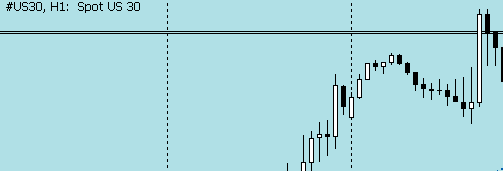
In the class's constructor we get all the chart properties of type Integer and store them into ChartConfig array.
CChartProperties::CChartProperties(void)//Class Constructor { for(int i=0;i<65;i++)//Iterating through ENUM_CHART_PROPERTY_INTEGER Elements { ChartGetInteger(0,(ENUM_CHART_PROPERTY_INTEGER)i,0,ChartConfig[i]);//Storing Chart values into ChartConfig array } ChartConfigure(); }
We also initialize the variable Chart which is of type structure ChartFormat previously mentioned and give it the appropriate values to customize the chart to our liking in the function ChartConfigure.
void CChartProperties::ChartConfigure(void) { Chart.CHART_MODE=(ulong)CHART_CANDLES;//Assigning Chart Mode of CHART_CANDLES Chart.CHART_COLOR_BACKGROUND=ulong(SymbolBackground());//Assigning Chart Background Color of Symbol's Background color Chart.CHART_COLOR_FOREGROUND=(ulong)clrBlack;//Assigning Chart Foreground Color of clrBalck(Black color) Chart.CHART_COLOR_CHART_LINE=(ulong)clrBlack;//Assigning Chart Line Color of clrBlack(Black color) Chart.CHART_COLOR_CANDLE_BEAR=(ulong)clrBlack;//Assigning Chart Bear Candle Color of clrBlack(Black color) Chart.CHART_COLOR_CHART_DOWN=(ulong)clrBlack;//Assigning Chart Down Candle Color of clrBlack(Black color) Chart.CHART_COLOR_CANDLE_BULL=(ulong)clrWhite;//Assigning Chart Bull Candle Color of clrWhite(White color) Chart.CHART_COLOR_CHART_UP=(ulong)clrBlack;//Assigning Chart Up Candle Color of clrBlack(Black color) Chart.CHART_COLOR_ASK=(ulong)clrBlack;//Assigning Chart Ask Color of clrBlack(Black color) Chart.CHART_COLOR_BID=(ulong)clrBlack;//Assigning Chart Bid Color of clrBlack(Black color) Chart.CHART_COLOR_STOP_LEVEL=(ulong)clrBlack;//Assigning Chart Stop Level Color of clrBlack(Black color) Chart.CHART_FOREGROUND=(ulong)false;//Assigning Chart Foreground Boolean Value of 'false' Chart.CHART_SHOW_ASK_LINE=(ulong)true;//Assigning Chart Ask Line Boolean Value of 'true' Chart.CHART_SHOW_BID_LINE=(ulong)true;//Assigning Chart Bid Line Boolean Value of 'true' Chart.CHART_SHOW_PERIOD_SEP=(ulong)true;//Assigning Chart Period Separator Boolean Value of 'true' Chart.CHART_SHOW_TRADE_LEVELS=(ulong)true;//Assigning Chart Trade Levels Boolean Value of 'true' Chart.CHART_SHOW_OHLC=(ulong)false;//Assigning Chart Open-High-Low-Close Boolean Value of 'false' Chart.CHART_SHOW_GRID=(ulong)false;//Assigning Chart Grid Boolean Value of 'false' Chart.CHART_SHOW_VOLUMES=(ulong)false;//Assigning Chart Volumes Boolean Value of 'false' Chart.CHART_SCALE=(ulong)3;//Assigning Chart Scale Boolean Value of '3' Chart.CHART_AUTOSCROLL=(ulong)true;//Assigning Chart Auto Scroll Boolean Value of 'true' Chart.CHART_SHIFT_SIZE=30;//Assigning Chart Shift Size Value of '30' Chart.CHART_SHIFT=(ulong)true;//Assigning Chart Shift Boolean Value of 'true' Chart.CHART_SHOW_ONE_CLICK=ulong(false);//Assigning Chart One Click Trading a value of 'false' ChartSet();//Calling Function to set chart format }
In the ChartSet function will set the values of the selected chart properties from the variable Chart of structure type ChartFormat.
void CChartProperties::ChartSet() { ChartSetInteger(0,CHART_MODE,Chart.CHART_MODE);//Set Chart Candle Mode ChartSetInteger(0,CHART_COLOR_BACKGROUND,Chart.CHART_COLOR_BACKGROUND);//Set Chart Background Color ChartSetInteger(0,CHART_COLOR_FOREGROUND,Chart.CHART_COLOR_FOREGROUND);//Set Chart Foreground Color ChartSetInteger(0,CHART_COLOR_CHART_LINE,Chart.CHART_COLOR_CHART_LINE);//Set Chart Line Color ChartSetInteger(0,CHART_COLOR_CANDLE_BEAR,Chart.CHART_COLOR_CANDLE_BEAR);//Set Chart Bear Candle Color ChartSetInteger(0,CHART_COLOR_CHART_DOWN,Chart.CHART_COLOR_CHART_DOWN);//Set Chart Down Candle Color ChartSetInteger(0,CHART_COLOR_CANDLE_BULL,Chart.CHART_COLOR_CANDLE_BULL);//Set Chart Bull Candle Color ChartSetInteger(0,CHART_COLOR_CHART_UP,Chart.CHART_COLOR_CHART_UP);//Set Chart Up Candle Color ChartSetInteger(0,CHART_COLOR_ASK,Chart.CHART_COLOR_ASK);//Set Chart Ask Color ChartSetInteger(0,CHART_COLOR_BID,Chart.CHART_COLOR_BID);//Set Chart Bid Color ChartSetInteger(0,CHART_COLOR_STOP_LEVEL,Chart.CHART_COLOR_STOP_LEVEL);//Set Chart Stop Level Color ChartSetInteger(0,CHART_FOREGROUND,Chart.CHART_FOREGROUND);//Set if Chart is in Foreground Visibility ChartSetInteger(0,CHART_SHOW_ASK_LINE,Chart.CHART_SHOW_ASK_LINE);//Set Chart Ask Line Visibility ChartSetInteger(0,CHART_SHOW_BID_LINE,Chart.CHART_SHOW_BID_LINE);//Set Chart Bid Line Visibility ChartSetInteger(0,CHART_SHOW_PERIOD_SEP,Chart.CHART_SHOW_PERIOD_SEP);//Set Chart Period Separator Visibility ChartSetInteger(0,CHART_SHOW_TRADE_LEVELS,Chart.CHART_SHOW_TRADE_LEVELS);//Set Chart Trade Levels Visibility ChartSetInteger(0,CHART_SHOW_OHLC,Chart.CHART_SHOW_OHLC);//Set Chart Open-High-Low-Close Visibility ChartSetInteger(0,CHART_SHOW_GRID,Chart.CHART_SHOW_GRID);//Set Chart Grid Visibility ChartSetInteger(0,CHART_SHOW_VOLUMES,Chart.CHART_SHOW_VOLUMES);//Set Chart Volumes Visibility ChartSetInteger(0,CHART_SCALE,Chart.CHART_SCALE);//Set Chart Scale Value ChartSetInteger(0,CHART_AUTOSCROLL,Chart.CHART_AUTOSCROLL);//Set Chart Auto Scroll Option ChartSetDouble(0,CHART_SHIFT_SIZE,Chart.CHART_SHIFT_SIZE);//Set Chart Shift Size Value ChartSetInteger(0,CHART_SHIFT,Chart.CHART_SHIFT);//Set Chart Shift Option ChartSetInteger(0,CHART_SHOW_ONE_CLICK,Chart.CHART_SHOW_ONE_CLICK);//Set Chart One Click Trading }
In the destructor we will restore the previous chart's integer values.
CChartProperties::~CChartProperties(void) { for(int i=0;i<65;i++)//Iterating through ENUM_CHART_PROPERTY_INTEGER Elements { ChartSetInteger(0,(ENUM_CHART_PROPERTY_INTEGER)i,0,ChartConfig[i]);//Restoring Chart values from ChartConfig array } }
Candle Properties Class
CCandleProperties has multilevel Inheritance from classes:
- CChartProperties
- CSymbolProperties
CCandleProperties has Inclusion from class CTimeManagement.
CCandleProperties has hierarchical Inheritance from classes:
- CSymbolProperties
- CSymbolInfo
//+------------------------------------------------------------------+ //| NewsTrading | //| Copyright 2024, MetaQuotes Ltd. | //| https://www.mql5.com/en/users/kaaiblo | //+------------------------------------------------------------------+ #include "TimeManagement.mqh" #include "ChartProperties.mqh" //+------------------------------------------------------------------+ //|CandleProperties class | //+------------------------------------------------------------------+ class CCandleProperties : public CChartProperties { private: CTimeManagement Time; public: double Open(int CandleIndex,ENUM_TIMEFRAMES Period=PERIOD_CURRENT,string SYMBOL=NULL);//Retrieve Candle Open-Price double Close(int CandleIndex,ENUM_TIMEFRAMES Period=PERIOD_CURRENT,string SYMBOL=NULL);//Retrieve Candle Close-Price double High(int CandleIndex,ENUM_TIMEFRAMES Period=PERIOD_CURRENT,string SYMBOL=NULL);//Retrieve Candle High-Price double Low(int CandleIndex,ENUM_TIMEFRAMES Period=PERIOD_CURRENT,string SYMBOL=NULL);//Retrieve Candle Low-Price bool IsLargerThanPreviousAndNext(datetime CandleTime,int Offset,string SYMBOL);//Determine if one candle is larger than two others }; //+------------------------------------------------------------------+ //|Retrieve Candle Open-Price | //+------------------------------------------------------------------+ double CCandleProperties::Open(int CandleIndex,ENUM_TIMEFRAMES Period=PERIOD_CURRENT,string SYMBOL=NULL) { return (SetSymbolName(SYMBOL))?iOpen(GetSymbolName(),Period,CandleIndex):0;//return candle open price } //+------------------------------------------------------------------+ //|Retrieve Candle Close-Price | //+------------------------------------------------------------------+ double CCandleProperties::Close(int CandleIndex,ENUM_TIMEFRAMES Period=PERIOD_CURRENT,string SYMBOL=NULL) { return (SetSymbolName(SYMBOL))?iClose(GetSymbolName(),Period,CandleIndex):0;//return candle close price } //+------------------------------------------------------------------+ //|Retrieve Candle High-Price | //+------------------------------------------------------------------+ double CCandleProperties::High(int CandleIndex,ENUM_TIMEFRAMES Period=PERIOD_CURRENT,string SYMBOL=NULL) { return (SetSymbolName(SYMBOL))?iHigh(GetSymbolName(),Period,CandleIndex):0;//return candle high price } //+------------------------------------------------------------------+ //|Retrieve Candle Low-Price | //+------------------------------------------------------------------+ double CCandleProperties::Low(int CandleIndex,ENUM_TIMEFRAMES Period=PERIOD_CURRENT,string SYMBOL=NULL) { return (SetSymbolName(SYMBOL))?iLow(GetSymbolName(),Period,CandleIndex):0;//return candle low price } //+------------------------------------------------------------------+ //|Determine if one candle is larger than two others | //+------------------------------------------------------------------+ bool CCandleProperties::IsLargerThanPreviousAndNext(datetime CandleTime,int Offset,string SYMBOL) { int CandleIndex = iBarShift(SYMBOL,PERIOD_M15,CandleTime);//Assign candle index of candletime //--Assign candle index of candletime minus time offset int CandleIndexMinusOffset = iBarShift(SYMBOL,PERIOD_M15,Time.TimeMinusOffset(CandleTime,Offset)); //--Assign candle index of candletime plus time offset int CandleIndexPlusOffset = iBarShift(SYMBOL,PERIOD_M15,Time.TimePlusOffset(CandleTime,Offset)); //--Assign height of M15 candletime in pips double CandleHeight = High(CandleIndex,PERIOD_M15,SYMBOL)-Low(CandleIndex,PERIOD_M15,SYMBOL); //--Assign height of M15 candletime minus offset in Pips double CandleHeightMinusOffset = High(CandleIndexMinusOffset,PERIOD_M15,SYMBOL)-Low(CandleIndexMinusOffset,PERIOD_M15,SYMBOL); //--Assign height of M15 candletime plus offset in Pips double CandleHeightPlusOffset = High(CandleIndexPlusOffset,PERIOD_M15,SYMBOL)-Low(CandleIndexPlusOffset,PERIOD_M15,SYMBOL); //--Determine if candletime height is greater than candletime height minus offset and candletime height plus offset if(CandleHeight>CandleHeightMinusOffset&&CandleHeight>CandleHeightPlusOffset) { return true;//Candletime is likely when the news event occured } return false;//Candletime is unlikely when the real news data was released } //+------------------------------------------------------------------+
Object Properties Class
This class will be responsible for creating and deleting chart objects.
CObjectProperties has multilevel Inheritance from classes:
- CChartProperties
- CSymbolProperties
- CSymbolProperties
- CSymbolInfo
//+------------------------------------------------------------------+ //| NewsTrading | //| Copyright 2024, MetaQuotes Ltd. | //| https://www.mql5.com/en/users/kaaiblo | //+------------------------------------------------------------------+ #include "ChartProperties.mqh" //+------------------------------------------------------------------+ //|ObjectProperties class | //+------------------------------------------------------------------+ class CObjectProperties:public CChartProperties { private: //Simple chart objects structure struct ObjStruct { long ChartId; string Name; } Objects[];//ObjStruct variable array //-- Add chart object to Objects array void AddObj(long chart_id,string name) { ArrayResize(Objects,Objects.Size()+1,Objects.Size()+2); Objects[Objects.Size()-1].ChartId=chart_id; Objects[Objects.Size()-1].Name=name; } public: CObjectProperties(void) {}//Class constructor //-- Create Rectangle chart object void Square(long chart_ID,string name,int x_coord,int y_coord,int width,int height,ENUM_ANCHOR_POINT Anchor); //-- Create text chart object void TextObj(long chartID,string name,string text,int x_coord,int y_coord, ENUM_BASE_CORNER Corner=CORNER_LEFT_UPPER,int fontsize=10); //-- Create Event object void EventObj(long chartID,string name,string description,datetime eventdate); //-- Class destructor removes all chart objects created previously ~CObjectProperties(void) { for(uint i=0;i<Objects.Size();i++) { ObjectDelete(Objects[i].ChartId,Objects[i].Name); } } }; //+------------------------------------------------------------------+ //|Create Rectangle chart object | //+------------------------------------------------------------------+ void CObjectProperties::Square(long chart_ID,string name,int x_coord,int y_coord,int width,int height,ENUM_ANCHOR_POINT Anchor) { const int sub_window=0; // subwindow index const int x=x_coord; // X coordinate const int y=y_coord; // Y coordinate const color back_clr=clrBlack; // background color const ENUM_BORDER_TYPE border=BORDER_SUNKEN; // border type const color clr=clrRed; // flat border color (Flat) const ENUM_LINE_STYLE style=STYLE_SOLID; // flat border style const int line_width=0; // flat border width const bool back=false; // in the background const bool selection=false; // highlight to move const bool hidden=true; // hidden in the object list ObjectDelete(chart_ID,name);//Delete previous object with the same name and chart id if(ObjectCreate(chart_ID,name,OBJ_RECTANGLE_LABEL,sub_window,0,0))//create rectangle object label { AddObj(chart_ID,name);//Add object to array ObjectSetInteger(chart_ID,name,OBJPROP_XDISTANCE,x);//Set x Distance/coordinate ObjectSetInteger(chart_ID,name,OBJPROP_YDISTANCE,y);//Set y Distance/coordinate ObjectSetInteger(chart_ID,name,OBJPROP_XSIZE,width);//Set object's width/x-size ObjectSetInteger(chart_ID,name,OBJPROP_YSIZE,height);//Set object's height/y-size ObjectSetInteger(chart_ID,name,OBJPROP_BGCOLOR,back_clr);//Set object's background color ObjectSetInteger(chart_ID,name,OBJPROP_BORDER_TYPE,border);//Set object's border type ObjectSetInteger(chart_ID,name,OBJPROP_ANCHOR,Anchor);//Set objects anchor point ObjectSetInteger(chart_ID,name,OBJPROP_COLOR,clr);//Set object's color ObjectSetInteger(chart_ID,name,OBJPROP_STYLE,style);//Set object's style ObjectSetInteger(chart_ID,name,OBJPROP_WIDTH,line_width);//Set object's flat border width ObjectSetInteger(chart_ID,name,OBJPROP_BACK,back);//Set if object is in foreground or not ObjectSetInteger(chart_ID,name,OBJPROP_SELECTABLE,selection);//Set if object is selectable/dragable ObjectSetInteger(chart_ID,name,OBJPROP_SELECTED,selection);//Set if object is Selected ObjectSetInteger(chart_ID,name,OBJPROP_HIDDEN,hidden);//Set if object is hidden in object list ChartRedraw(chart_ID); } else { Print("Failed to create object: ",name); } } //+------------------------------------------------------------------+ //|Create text chart object | //+------------------------------------------------------------------+ void CObjectProperties::TextObj(long chartID,string name,string text,int x_coord,int y_coord, ENUM_BASE_CORNER Corner=CORNER_LEFT_UPPER,int fontsize=10) { ObjectDelete(chartID,name);//Delete previous object with the same name and chart id if(ObjectCreate(chartID,name,OBJ_LABEL,0,0,0))//Create object label { AddObj(chartID,name);//Add object to array ObjectSetInteger(chartID,name,OBJPROP_XDISTANCE,x_coord);//Set x Distance/coordinate ObjectSetInteger(chartID,name,OBJPROP_YDISTANCE,y_coord);//Set y Distance/coordinate ObjectSetInteger(chartID,name,OBJPROP_CORNER,Corner);//Set object's corner anchor ObjectSetString(chartID,name,OBJPROP_TEXT,text);//Set object's text ObjectSetInteger(chartID,name,OBJPROP_COLOR,SymbolBackground());//Set object's color ObjectSetInteger(chartID,name,OBJPROP_FONTSIZE,fontsize);//Set object's font-size } else { Print("Failed to create object: ",name); } } //+------------------------------------------------------------------+ //|Create Event object | //+------------------------------------------------------------------+ void CObjectProperties::EventObj(long chartID,string name,string description,datetime eventdate) { ObjectDelete(chartID,name);//Delete previous object with the same name and chart id if(ObjectCreate(chartID,name,OBJ_EVENT,0,eventdate,0))//Create object event { AddObj(chartID,name);//Add object to array ObjectSetString(chartID,name,OBJPROP_TEXT,description);//Set object's text ObjectSetInteger(chartID,name,OBJPROP_COLOR,clrBlack);//Set object's color } else { Print("Failed to create object: ",name); } } //+------------------------------------------------------------------
The array variable Objects will store all chart objects created in this class CObjectProperties.
struct ObjStruct { long ChartId; string Name; } Objects[];//ObjStruct variable array
The function AddObj will add the chart object's chart id and object name into the Objects array.
//-- Add chart object to Objects array void AddObj(long chart_id,string name) { ArrayResize(Objects,Objects.Size()+1,Objects.Size()+2); Objects[Objects.Size()-1].ChartId=chart_id; Objects[Objects.Size()-1].Name=name; }
The function Square's purpose is to create a Rectangle object with specific properties to allow for customization.
void CObjectProperties::Square(long chart_ID,string name,int x_coord,int y_coord,int width,int height,ENUM_ANCHOR_POINT Anchor) { const int sub_window=0; // subwindow index const int x=x_coord; // X coordinate const int y=y_coord; // Y coordinate const color back_clr=clrBlack; // background color const ENUM_BORDER_TYPE border=BORDER_SUNKEN; // border type const color clr=clrRed; // flat border color (Flat) const ENUM_LINE_STYLE style=STYLE_SOLID; // flat border style const int line_width=0; // flat border width const bool back=false; // in the background const bool selection=false; // highlight to move const bool hidden=true; // hidden in the object list ObjectDelete(chart_ID,name);//Delete previous object with the same name and chart id if(ObjectCreate(chart_ID,name,OBJ_RECTANGLE_LABEL,sub_window,0,0))//create rectangle object label { AddObj(chart_ID,name);//Add object to array ObjectSetInteger(chart_ID,name,OBJPROP_XDISTANCE,x);//Set x Distance/coordinate ObjectSetInteger(chart_ID,name,OBJPROP_YDISTANCE,y);//Set y Distance/coordinate ObjectSetInteger(chart_ID,name,OBJPROP_XSIZE,width);//Set object's width/x-size ObjectSetInteger(chart_ID,name,OBJPROP_YSIZE,height);//Set object's height/y-size ObjectSetInteger(chart_ID,name,OBJPROP_BGCOLOR,back_clr);//Set object's background color ObjectSetInteger(chart_ID,name,OBJPROP_BORDER_TYPE,border);//Set object's border type ObjectSetInteger(chart_ID,name,OBJPROP_ANCHOR,Anchor);//Set objects anchor point ObjectSetInteger(chart_ID,name,OBJPROP_COLOR,clr);//Set object's color ObjectSetInteger(chart_ID,name,OBJPROP_STYLE,style);//Set object's style ObjectSetInteger(chart_ID,name,OBJPROP_WIDTH,line_width);//Set object's flat border width ObjectSetInteger(chart_ID,name,OBJPROP_BACK,back);//Set if object is in foreground or not ObjectSetInteger(chart_ID,name,OBJPROP_SELECTABLE,selection);//Set if object is selectable/dragable ObjectSetInteger(chart_ID,name,OBJPROP_SELECTED,selection);//Set if object is Selected ObjectSetInteger(chart_ID,name,OBJPROP_HIDDEN,hidden);//Set if object is hidden in object list ChartRedraw(chart_ID); } else { Print("Failed to create object: ",name); } }
The function TextObj will create text objects on the chart.
void CObjectProperties::TextObj(long chartID,string name,string text,int x_coord,int y_coord, ENUM_BASE_CORNER Corner=CORNER_LEFT_UPPER,int fontsize=10) { ObjectDelete(chartID,name);//Delete previous object with the same name and chart id if(ObjectCreate(chartID,name,OBJ_LABEL,0,0,0))//Create object label { AddObj(chartID,name);//Add object to array ObjectSetInteger(chartID,name,OBJPROP_XDISTANCE,x_coord);//Set x Distance/coordinate ObjectSetInteger(chartID,name,OBJPROP_YDISTANCE,y_coord);//Set y Distance/coordinate ObjectSetInteger(chartID,name,OBJPROP_CORNER,Corner);//Set object's corner anchor ObjectSetString(chartID,name,OBJPROP_TEXT,text);//Set object's text ObjectSetInteger(chartID,name,OBJPROP_COLOR,SymbolBackground());//Set object's color ObjectSetInteger(chartID,name,OBJPROP_FONTSIZE,fontsize);//Set object's font-size } else { Print("Failed to create object: ",name); } }
The function EventObj will create event objects on the chart to show the economic events the have or will occur.
void CObjectProperties::EventObj(long chartID,string name,string description,datetime eventdate) { ObjectDelete(chartID,name);//Delete previous object with the same name and chart id if(ObjectCreate(chartID,name,OBJ_EVENT,0,eventdate,0))//Create object event { AddObj(chartID,name);//Add object to array ObjectSetString(chartID,name,OBJPROP_TEXT,description);//Set object's text ObjectSetInteger(chartID,name,OBJPROP_COLOR,clrBlack);//Set object's color } else { Print("Failed to create object: ",name); } }
News Class
Calendar Tables in Part 1:
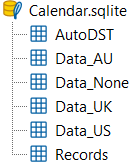
![]()
In our previous database in part 1, the file size was massive and pretty slow to store all the news data into the database. This is due to the news data being stored inefficiently. The biggest contributor to the file size and sluggish performance, is storing similar data repeatedly.
The tables:
- Data_AU
- Data_None
- Data_UK
- Data_US
Store the same news data with a variation to the time data.
New Design:
Calendar Contents in Part 2:
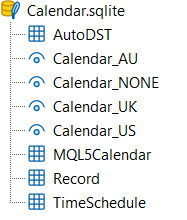
![]()
In the new database design we will have these contents:
- AutoDST Table
- Calendar_AU View
- Calendar_NONE View
- Calendar_UK View
- Calendar_US View
- MQL5Calendar Table
- Record Table
- TimeSchedule Table
- OnlyOne_AutoDST Trigger
- OnlyOne_Record Trigger
We are going to Normalize the Tables from the previous database, these tables are Data_AU, Data_None, Data_UK and Data_US.
What is Database Normalization?
Database normalization is a process in database design used to organize a database into tables and columns to minimize redundancy and dependency. The main goals are to eliminate redundant data (for example, storing the same data in more than one table) and ensure data dependencies make sense (only storing related data in a table). This process results in a set of tables that can be more easily maintained and reduces the chances of data anomalies. 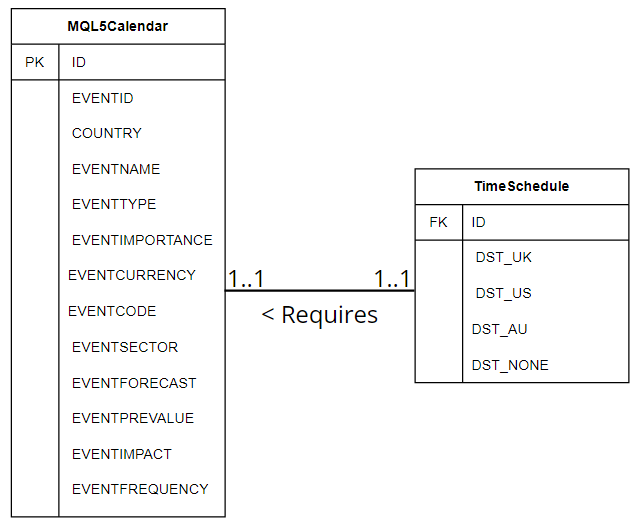
We will also create triggers to assure that only one record is stored in tables AutoDST and Record. Additionally we will create views for each DST schedule to show the News events for the last updated day, ideally to easily navigate which news events were up to date without having to repeatedly run queries on the tables with thousands of entries.
Okay so what is a Trigger?
A trigger in SQLite is a special kind of stored procedure that automatically executes a specified set of actions in response to certain events on a particular table. These events can be insertions, updates, or deletions of rows in the table.
What is a View?
A view in SQLite is a virtual table that is based on the result set of a SELECT query. Unlike a table, a view does not store data physically. Instead, it provides a way to present data from one or more tables in a specific structure or format, often simplifying complex queries and enhancing data security.
Before we start creating new tables and adding to the already large size of the database. We need a way to know which tables to delete and which to keep. A simple solution would be to check for each table we know exists in our previous database, which would include Data_AU and others. But we can't just hard code which tables to delete from our memory, our program needs to find the tables we do not need anymore by itself. In order to do this we need to check which tables exist in our database, and iterate through the tables we want to delete and skip those we want to keep.
In SQLite there is a table called SQLITE_MASTER/SQLITE_SCHEMA that stores database's metadata, including information about all objects in the database and the SQL used to define them. It's the most important system catalog in SQLite. The query below is used to get all the information from the database.
SELECT * FROM SQLITE_MASTER;
Database output:
type name tbl_name rootpage sql table Data_None Data_None 2 CREATE TABLE Data_None(ID INT NOT NULL,EVENTID INT NOT NULL,COUNTRY STRING NOT NULL,EVENTNAME STRING NOT NULL,EVENTTYPE STRING NOT NULL,EVENTIMPORTANCE STRING NOT NULL,EVENTDATE STRING NOT NULL,EVENTCURRENCY STRING NOT NULL,EVENTCODE STRING NOT NULL,EVENTSECTOR STRING NOT NULL,EVENTFORECAST STRING NOT NULL,EVENTPREVALUE STRING NOT NULL,EVENTIMPACT STRING NOT NULL,EVENTFREQUENCY STRING NOT NULL,PRIMARY KEY(ID)) index sqlite_autoindex_Data_None_1 Data_None 3 table Data_US Data_US 4 CREATE TABLE Data_US(ID INT NOT NULL,EVENTID INT NOT NULL,COUNTRY STRING NOT NULL,EVENTNAME STRING NOT NULL,EVENTTYPE STRING NOT NULL,EVENTIMPORTANCE STRING NOT NULL,EVENTDATE STRING NOT NULL,EVENTCURRENCY STRING NOT NULL,EVENTCODE STRING NOT NULL,EVENTSECTOR STRING NOT NULL,EVENTFORECAST STRING NOT NULL,EVENTPREVALUE STRING NOT NULL,EVENTIMPACT STRING NOT NULL,EVENTFREQUENCY STRING NOT NULL,PRIMARY KEY(ID)) index sqlite_autoindex_Data_US_1 Data_US 5 table Data_UK Data_UK 6 CREATE TABLE Data_UK(ID INT NOT NULL,EVENTID INT NOT NULL,COUNTRY STRING NOT NULL,EVENTNAME STRING NOT NULL,EVENTTYPE STRING NOT NULL,EVENTIMPORTANCE STRING NOT NULL,EVENTDATE STRING NOT NULL,EVENTCURRENCY STRING NOT NULL,EVENTCODE STRING NOT NULL,EVENTSECTOR STRING NOT NULL,EVENTFORECAST STRING NOT NULL,EVENTPREVALUE STRING NOT NULL,EVENTIMPACT STRING NOT NULL,EVENTFREQUENCY STRING NOT NULL,PRIMARY KEY(ID)) index sqlite_autoindex_Data_UK_1 Data_UK 7 table Data_AU Data_AU 8 CREATE TABLE Data_AU(ID INT NOT NULL,EVENTID INT NOT NULL,COUNTRY STRING NOT NULL,EVENTNAME STRING NOT NULL,EVENTTYPE STRING NOT NULL,EVENTIMPORTANCE STRING NOT NULL,EVENTDATE STRING NOT NULL,EVENTCURRENCY STRING NOT NULL,EVENTCODE STRING NOT NULL,EVENTSECTOR STRING NOT NULL,EVENTFORECAST STRING NOT NULL,EVENTPREVALUE STRING NOT NULL,EVENTIMPACT STRING NOT NULL,EVENTFREQUENCY STRING NOT NULL,PRIMARY KEY(ID)) index sqlite_autoindex_Data_AU_1 Data_AU 9 table Records Records 38774 CREATE TABLE Records(RECORDEDTIME INT NOT NULL) table AutoDST AutoDST 38775 CREATE TABLE AutoDST(DST STRING NOT NULL)
As seen from the database output, there is something called an index, which we did not create before.
What is an Index?
An index in SQLite is a database object that provides a way to improve the performance of query operations by facilitating faster retrieval of records from a table. Indexes are particularly useful for speeding up searches, sorting, and join operations by creating a sorted data structure (typically a B-tree) that allows the database engine to locate rows more quickly.
Why was the index created if we didn't create it previously?
When a table has a primary key in SQLite an index is automatically created for that particular table.
In our database output previously, we finally got all the objects and metadata in the database, we can now find the tables which are no longer necessary and delete them. In order to do this we will create an array of the tables we need and the SQL statements that create these tables, so we can compare them to the one in the database output and therefore remove the ones that do not match.
CNews has multilevel Inheritance from classes:
- CCandleProperties
- CChartProperties
- CSymbolProperties
CNews has Inclusions from classes:
- CDaylightSavings_UK
- CDaylightSavings_US
- CDaylightSavings_AU
CNews has an inclusion from header file CommonVariables.mqh
CNews has hierarchical Inheritance from classes:
- CSymbolProperties
- CSymbolInfo
- CCandleProperties
- CTimeManagement
//+------------------------------------------------------------------+ //| NewsTrading | //| Copyright 2024, MetaQuotes Ltd. | //| https://www.mql5.com/en/users/kaaiblo | //+------------------------------------------------------------------+ #include "CommonVariables.mqh" #include "DayLightSavings/DaylightSavings_UK.mqh" #include "DayLightSavings/DaylightSavings_US.mqh" #include "DayLightSavings/DaylightSavings_AU.mqh" #include "CandleProperties.mqh" //+------------------------------------------------------------------+ //|News class | //+------------------------------------------------------------------+ class CNews : private CCandleProperties { //Private Declarations Only accessable by this class/header file private: //-- To keep track of what is in our database enum CalendarComponents { AutoDST_Table,//AutoDST Table CalendarAU_View,//View for DST_AU CalendarNONE_View,//View for DST_NONE CalendarUK_View,//View for DST_UK CalendarUS_View,//View for DST_US Record_Table,// Record Table TimeSchedule_Table,//TimeSchedule Table MQL5Calendar_Table,//MQL5Calendar Table AutoDST_Trigger,//Table Trigger for AutoDST Record_Trigger//Table Trigger for Record }; //-- structure to retrieve all the objects in the database struct SQLiteMaster { string type;//will store object's type string name;//will store object's name string tbl_name;//will store table name int rootpage;//will store rootpage string sql;//Will store the sql create statement } DBContents[];//Array of type SQLiteMaster //-- MQL5CalendarContents inherits from SQLiteMaster structure struct MQL5CalendarContents:SQLiteMaster { CalendarComponents Content; string insert;//Will store the sql insert statement } CalendarContents[10];//Array to Store objects in our database CTimeManagement Time;//TimeManagement Object declaration CDaylightSavings_UK Savings_UK;//DaylightSavings Object for the UK and EU CDaylightSavings_US Savings_US;//DaylightSavings Object for the US CDaylightSavings_AU Savings_AU;//DaylightSavings Object for the AU bool AutoDetectDST(DST_type &dstType);//Function will determine Broker DST DST_type DSTType;//variable of DST_type enumeration declared in the CommonVariables class/header file bool InsertIntoTables(int db,Calendar &Evalues[]);//Function for inserting Economic Data in to a database's table void CreateAutoDST(int db);//Function for creating and inserting Recommend DST for the Broker into a table bool CreateCalendarTable(int db,bool &tableExists);//Function for creating a table in a database bool CreateTimeTable(int db,bool &tableExists);//Function for creating a table in a database void CreateCalendarViews(int db);//Function for creating a view in a database void CreateRecordTable(int db);//Creates a table to store the record of when last the Calendar database was updated/created bool UpdateRecords();//Checks if the main Calendar database needs an update or not void EconomicDetails(Calendar &NewsTime[]);//Gets values from the MQL5 economic Calendar string DropRequest;//Variable for dropping tables in the database //-- Function for retrieving the MQL5CalendarContents structure for the enumartion type CalendarComponents MQL5CalendarContents CalendarStruct(CalendarComponents Content) { MQL5CalendarContents Calendar; for(uint i=0;i<CalendarContents.Size();i++) { if(CalendarContents[i].Content==Content) { return CalendarContents[i]; } } return Calendar; } //Public declarations accessable via a class's Object public: CNews(void); ~CNews(void);//Deletes a text file created when the Calendar database is being worked on void CreateEconomicDatabase();//Creates the Calendar database for a specific Broker datetime GetLatestNewsDate();//Gets the lastest/newest date in the Calendar database }; //+------------------------------------------------------------------+ //|Constructor | //+------------------------------------------------------------------+ CNews::CNews(void):DropRequest("PRAGMA foreign_keys = OFF; " "PRAGMA secure_delete = ON; " "Drop %s IF EXISTS %s; " "Vacuum; " "PRAGMA foreign_keys = ON;")//Sql drop statement { //-- initializing properties for the AutoDST table CalendarContents[0].Content = AutoDST_Table; CalendarContents[0].name = "AutoDST"; CalendarContents[0].sql = "CREATE TABLE AutoDST(DST TEXT NOT NULL DEFAULT 'DST_NONE')STRICT;"; CalendarContents[0].tbl_name = "AutoDST"; CalendarContents[0].type = "table"; CalendarContents[0].insert = "INSERT INTO 'AutoDST'(DST) VALUES ('%s');"; string views[] = {"UK","US","AU","NONE"}; string view_sql = "CREATE VIEW IF NOT EXISTS Calendar_%s " "AS " "SELECT C.Eventid,C.Eventname,C.Country,T.DST_%s as Time,C.EventCurrency,C.Eventcode from MQL5Calendar C,Record R " "Inner join TimeSchedule T on C.ID=T.ID " "Where DATE(REPLACE(T.DST_%s,'.','-'))=R.Date " "Order by T.DST_%s Asc;"; //-- Sql statements for creating the table views for(uint i=1;i<=views.Size();i++) { CalendarContents[i].Content = (CalendarComponents)i; CalendarContents[i].name = StringFormat("Calendar_%s",views[i-1]); CalendarContents[i].sql = StringFormat(view_sql,views[i-1],views[i-1],views[i-1],views[i-1]); CalendarContents[i].tbl_name = StringFormat("Calendar_%s",views[i-1]); CalendarContents[i].type = "view"; } //-- initializing properties for the Record table CalendarContents[5].Content = Record_Table; CalendarContents[5].name = "Record"; CalendarContents[5].sql = "CREATE TABLE Record(Date TEXT NOT NULL)STRICT;"; CalendarContents[5].tbl_name="Record"; CalendarContents[5].type = "table"; CalendarContents[5].insert = "INSERT INTO 'Record'(Date) VALUES (Date(REPLACE('%s','.','-')));"; //-- initializing properties for the TimeSchedule table CalendarContents[6].Content = TimeSchedule_Table; CalendarContents[6].name = "TimeSchedule"; CalendarContents[6].sql = "CREATE TABLE TimeSchedule(ID INT NOT NULL,DST_UK TEXT NOT NULL,DST_US TEXT NOT NULL," "DST_AU TEXT NOT NULL,DST_NONE TEXT NOT NULL,FOREIGN KEY (ID) REFERENCES MQL5Calendar (ID))STRICT;"; CalendarContents[6].tbl_name="TimeSchedule"; CalendarContents[6].type = "table"; CalendarContents[6].insert = "INSERT INTO 'TimeSchedule'(ID,DST_UK,DST_US,DST_AU,DST_NONE) " "VALUES (%d,'%s','%s', '%s', '%s');"; //-- initializing properties for the MQL5Calendar table CalendarContents[7].Content = MQL5Calendar_Table; CalendarContents[7].name = "MQL5Calendar"; CalendarContents[7].sql = "CREATE TABLE MQL5Calendar(ID INT NOT NULL,EVENTID INT NOT NULL,COUNTRY TEXT NOT NULL," "EVENTNAME TEXT NOT NULL,EVENTTYPE TEXT NOT NULL,EVENTIMPORTANCE TEXT NOT NULL," "EVENTCURRENCY TEXT NOT NULL,EVENTCODE TEXT NOT NULL,EVENTSECTOR TEXT NOT NULL," "EVENTFORECAST TEXT NOT NULL,EVENTPREVALUE TEXT NOT NULL,EVENTIMPACT TEXT NOT NULL," "EVENTFREQUENCY TEXT NOT NULL,PRIMARY KEY(ID))STRICT;"; CalendarContents[7].tbl_name="MQL5Calendar"; CalendarContents[7].type = "table"; CalendarContents[7].insert = "INSERT INTO 'MQL5Calendar'(ID,EVENTID,COUNTRY,EVENTNAME,EVENTTYPE,EVENTIMPORTANCE,EVENTCURRENCY,EVENTCODE," "EVENTSECTOR,EVENTFORECAST,EVENTPREVALUE,EVENTIMPACT,EVENTFREQUENCY) " "VALUES (%d,%d,'%s','%s','%s','%s','%s','%s','%s','%s','%s','%s','%s');"; //-- Sql statement for creating the AutoDST table's trigger CalendarContents[8].Content = AutoDST_Trigger; CalendarContents[8].name = "OnlyOne_AutoDST"; CalendarContents[8].sql = "CREATE TRIGGER IF NOT EXISTS OnlyOne_AutoDST " "BEFORE INSERT ON AutoDST " "BEGIN " "Delete from AutoDST; " "END;"; CalendarContents[8].tbl_name="AutoDST"; CalendarContents[8].type = "trigger"; //-- Sql statement for creating the Record table's trigger CalendarContents[9].Content = Record_Trigger; CalendarContents[9].name = "OnlyOne_Record"; CalendarContents[9].sql = "CREATE TRIGGER IF NOT EXISTS OnlyOne_Record " "BEFORE INSERT ON Record " "BEGIN " "Delete from Record; " "END;"; CalendarContents[9].tbl_name="Record"; CalendarContents[9].type = "trigger"; } //+------------------------------------------------------------------+ //|Destructor | //+------------------------------------------------------------------+ CNews::~CNews(void) { if(FileIsExist(NEWS_TEXT_FILE,FILE_COMMON))//Check if the news database open text file exists { FileDelete(NEWS_TEXT_FILE,FILE_COMMON); } } //+------------------------------------------------------------------+ //|Gets values from the MQL5 economic Calendar | //+------------------------------------------------------------------+ void CNews::EconomicDetails(Calendar &NewsTime[]) { int Size=0;//to keep track of the size of the events in the NewsTime array MqlCalendarCountry countries[]; string Country_code=""; for(int i=0,count=CalendarCountries(countries); i<count; i++) { MqlCalendarValue values[]; datetime date_from=0;//Get date from the beginning datetime date_to=(datetime)(Time.MonthsS()+iTime(Symbol(),PERIOD_D1,0));//Date of the next month from the current day if(CalendarValueHistory(values,date_from,date_to,countries[i].code)) { for(int x=0; x<(int)ArraySize(values); x++) { MqlCalendarEvent event; ulong event_id=values[x].event_id;//Get the event id if(CalendarEventById(event_id,event)) { ArrayResize(NewsTime,Size+1,Size+2);//Readjust the size of the array to +1 of the array size StringReplace(event.name,"'","");//Removing or replacing single quotes(') from event name with an empty string NewsTime[Size].CountryName = countries[i].name;//storing the country's name from the specific event NewsTime[Size].EventName = event.name;//storing the event's name NewsTime[Size].EventType = EnumToString(event.type);//storing the event type from (ENUM_CALENDAR_EVENT_TYPE) to a string //-- storing the event importance from (ENUM_CALENDAR_EVENT_IMPORTANCE) to a string NewsTime[Size].EventImportance = EnumToString(event.importance); NewsTime[Size].EventId = event.id;//storing the event id NewsTime[Size].EventDate = TimeToString(values[x].time);//storing normal event time NewsTime[Size].EventCurrency = countries[i].currency;//storing event currency NewsTime[Size].EventCode = countries[i].code;//storing event code NewsTime[Size].EventSector = EnumToString(event.sector);//storing event sector from (ENUM_CALENDAR_EVENT_SECTOR) to a string if(values[x].HasForecastValue())//Checks if the event has a forecast value { NewsTime[Size].EventForecast = (string)values[x].forecast_value;//storing the forecast value into a string } else { NewsTime[Size].EventForecast = "None";//storing 'None' as the forecast value } if(values[x].HasPreviousValue())//Checks if the event has a previous value { NewsTime[Size].EventPreval = (string)values[x].prev_value;//storing the previous value into a string } else { NewsTime[Size].EventPreval = "None";//storing 'None' as the previous value } //-- storing the event impact from (ENUM_CALENDAR_EVENT_IMPACT) to a string NewsTime[Size].EventImpact = EnumToString(values[x].impact_type); //-- storing the event frequency from (ENUM_CALENDAR_EVENT_FREQUENCY) to a string NewsTime[Size].EventFrequency = EnumToString(event.frequency); Size++;//incrementing the Calendar array NewsTime } } } } } //+------------------------------------------------------------------+ //|Checks if the main Calendar database needs an update or not | //+------------------------------------------------------------------+ bool CNews::UpdateRecords() { //initialize variable to true bool perform_update=true; //--- open/create //-- try to open database Calendar int db=DatabaseOpen(NEWS_DATABASE_FILE, DATABASE_OPEN_READWRITE | DATABASE_OPEN_CREATE| DATABASE_OPEN_COMMON); if(db==INVALID_HANDLE)//Checks if the database was able to be opened { //if opening the database failed if(!FileIsExist(NEWS_DATABASE_FILE,FILE_COMMON))//Checks if the database Calendar exists in the common folder { return perform_update;//Returns true when the database was failed to be opened and the file doesn't exist in the common folder } } int MasterRequest = DatabasePrepare(db,"select * from sqlite_master where type<>'index';"); if(MasterRequest==INVALID_HANDLE) { Print("DB: ",NEWS_DATABASE_FILE, " request failed with code ", GetLastError()); } else { SQLiteMaster ReadContents; //Assigning values from the sql query into DBContents array for(int i=0; DatabaseReadBind(MasterRequest,ReadContents); i++) { ArrayResize(DBContents,i+1,i+2); DBContents[i].type = ReadContents.type; DBContents[i].name = ReadContents.name; DBContents[i].tbl_name = ReadContents.tbl_name; DBContents[i].rootpage = ReadContents.rootpage; /*Check if the end of the sql string has a character ';' if not add this character to the string*/ DBContents[i].sql = (StringFind(ReadContents.sql,";",StringLen(ReadContents.sql)-1)== (StringLen(ReadContents.sql)-1))?ReadContents.sql:ReadContents.sql+";";; } uint contents_exists = 0; for(uint i=0;i<DBContents.Size();i++) { bool isCalendarContents = false; for(uint x=0;x<CalendarContents.Size();x++) { /*Store Sql query from CalendarContents without string ' IF NOT EXISTS'*/ string CalendarSql=CalendarContents[x].sql; StringReplace(CalendarSql," IF NOT EXISTS",""); //-- Check if the Db object is in our list if(DBContents[i].name==CalendarContents[x].name&& (DBContents[i].sql==CalendarSql|| DBContents[i].sql==CalendarContents[x].sql)&& CalendarContents[x].type==DBContents[i].type&& CalendarContents[x].tbl_name==DBContents[i].tbl_name) { contents_exists++; isCalendarContents = true; } } if(!isCalendarContents) { //-- Print DBcontent's name if it does not match with CalendarContents PrintFormat("DBContent: %s is not needed!",DBContents[i].name); //-- We will drop the table if it is not neccessary DatabaseExecute(db,StringFormat(DropRequest,DBContents[i].type,DBContents[i].name)); Print("Attempting To Clean Database..."); } } /*If not all the CalendarContents exist in the Calendar Database before an update */ if(contents_exists!=CalendarContents.Size()) { return perform_update; } } if(!DatabaseTableExists(db,CalendarStruct(Record_Table).name))//If the database table 'Record' doesn't exist { DatabaseClose(db); return perform_update; } //-- Sql query to determine the lastest or maximum date recorded /* If the last recorded date data in the 'Record' table is not equal to the current day, perform an update! */ string request_text=StringFormat("SELECT Date FROM %s where Date=Date(REPLACE('%s','.','-'))", CalendarStruct(Record_Table).name,TimeToString(TimeTradeServer())); int request=DatabasePrepare(db,request_text);//Creates a handle of a request, which can then be executed using DatabaseRead() if(request==INVALID_HANDLE)//Checks if the request failed to be completed { Print("DB: ",NEWS_DATABASE_FILE, " request failed with code ", GetLastError()); DatabaseClose(db); return perform_update; } if(DatabaseRead(request))//Will be true if there are results from the sql query/request { DatabaseFinalize(request);//Removes a request created in DatabasePrepare() DatabaseClose(db);//Closes the database perform_update=false; return perform_update; } else { DatabaseFinalize(request);//Removes a request created in DatabasePrepare() DatabaseClose(db);//Closes the database return perform_update; } } //+------------------------------------------------------------------+ //|Creates the Calendar database for a specific Broker | //+------------------------------------------------------------------+ void CNews::CreateEconomicDatabase() { if(FileIsExist(NEWS_DATABASE_FILE,FILE_COMMON))//Check if the database exists { if(!UpdateRecords())//Check if the database is up to date { return;//will terminate execution of the rest of the code below } } if(FileIsExist(NEWS_TEXT_FILE,FILE_COMMON))//Check if the database is open { return;//will terminate execution of the rest of the code below } Calendar Evalues[];//Creating a Calendar array variable bool failed=false,tableExists=false; int file=INVALID_HANDLE; //--- open/create the database 'Calendar' //-- will try to open/create in the common folder int db=DatabaseOpen(NEWS_DATABASE_FILE, DATABASE_OPEN_READWRITE | DATABASE_OPEN_CREATE| DATABASE_OPEN_COMMON); if(db==INVALID_HANDLE)//Checks if the database 'Calendar' failed to open/create { Print("DB: ",NEWS_DATABASE_FILE, " open failed with code ", GetLastError()); return;//will terminate execution of the rest of the code below } else { //-- try to create a text file 'NewsDatabaseOpen' in common folder file=FileOpen(NEWS_TEXT_FILE,FILE_WRITE|FILE_ANSI|FILE_TXT|FILE_COMMON); if(file==INVALID_HANDLE) { DatabaseClose(db);//Closes the database 'Calendar' if the News text file failed to be created return;//will terminate execution of the rest of the code below } } DatabaseTransactionBegin(db);//Starts transaction execution Print("Please wait..."); //-- attempt to create the MQL5Calendar and TimeSchedule tables if(!CreateCalendarTable(db,tableExists)||!CreateTimeTable(db,tableExists)) { FileClose(file);//Closing the file 'NewsDatabaseOpen.txt' FileDelete(NEWS_TEXT_FILE,FILE_COMMON);//Deleting the file 'NewsDatabaseOpen.txt' return;//will terminate execution of the rest of the code below } EconomicDetails(Evalues);//Retrieving the data from the Economic Calendar if(tableExists)//Checks if there is an existing table within the Calendar Database { //if there is an existing table we will notify the user that we are updating the table. PrintFormat("Updating %s",NEWS_DATABASE_FILE); } else { //if there isn't an existing table we will notify the user that we about to create one PrintFormat("Creating %s",NEWS_DATABASE_FILE); } //-- attempt to insert economic event data into the calendar tables if(!InsertIntoTables(db,Evalues)) { //-- Will assign true if inserting economic vaules failed in the MQL5Calendar and TimeSchedule tables failed=true; } if(failed) { //--- roll back all transactions and unlock the database DatabaseTransactionRollback(db); PrintFormat("%s: DatabaseExecute() failed with code %d", __FUNCTION__, GetLastError()); FileClose(file);//Close the text file 'NEWS_TEXT_FILE' FileDelete(NEWS_TEXT_FILE,FILE_COMMON);//Delete the text file, as we are reverted/rolled-back the database ArrayRemove(Evalues,0,WHOLE_ARRAY);//Removes the values in the array } else { CreateCalendarViews(db); CreateRecordTable(db);//Will create the 'Record' table and insert the current time CreateAutoDST(db);//Will create the 'AutoDST' table and insert the broker's DST schedule FileClose(file);//Close the text file 'NEWS_TEXT_FILE' FileDelete(NEWS_TEXT_FILE,FILE_COMMON);//Delete the text file, as we are about to close the database ArrayRemove(Evalues,0,WHOLE_ARRAY);//Removes the values in the array if(tableExists) { //Let the user/trader know that the database was updated PrintFormat("%s Updated",NEWS_DATABASE_FILE); } else { //Let the user/trader know that the database was created PrintFormat("%s Created",NEWS_DATABASE_FILE); } } //--- all transactions have been performed successfully - record changes and unlock the database DatabaseTransactionCommit(db); DatabaseClose(db);//Close the database } //+------------------------------------------------------------------+ //|Function for creating a table in a database | //+------------------------------------------------------------------+ bool CNews::CreateCalendarTable(int db,bool &tableExists) { //-- Checks if a table 'MQL5Calendar' exists if(DatabaseTableExists(db,CalendarStruct(MQL5Calendar_Table).name)) { tableExists=true;//Assigns true to tableExists variable //-- Checks if a table 'TimeSchedule' exists in the database 'Calendar' if(DatabaseTableExists(db,CalendarStruct(TimeSchedule_Table).name)) { //-- We will drop the table if the table already exists if(!DatabaseExecute(db,StringFormat("Drop Table %s",CalendarStruct(TimeSchedule_Table).name))) { //If the table failed to be dropped/deleted PrintFormat("Failed to drop table %s with code %d",CalendarStruct(TimeSchedule_Table).name,GetLastError()); DatabaseClose(db);//Close the database return false;//will terminate execution of the rest of the code below and return false, when the table cannot be dropped } } //--We will drop the table if the table already exists if(!DatabaseExecute(db,StringFormat("Drop Table %s",CalendarStruct(MQL5Calendar_Table).name))) { //If the table failed to be dropped/deleted PrintFormat("Failed to drop table %s with code %d",CalendarStruct(MQL5Calendar_Table).name,GetLastError()); DatabaseClose(db);//Close the database return false;//will terminate execution of the rest of the code below and return false, when the table cannot be dropped } } //-- If the database table 'MQL5Calendar' doesn't exist if(!DatabaseTableExists(db,CalendarStruct(MQL5Calendar_Table).name)) { //--- create the table 'MQL5Calendar' if(!DatabaseExecute(db,CalendarStruct(MQL5Calendar_Table).sql))//Checks if the table was successfully created { Print("DB: create the Calendar table failed with code ", GetLastError()); DatabaseClose(db);//Close the database return false;//Function returns false if creating the table failed } } return true;//Function returns true if creating the table was successful } //+------------------------------------------------------------------+ //|Function for creating a table in a database | //+------------------------------------------------------------------+ bool CNews::CreateTimeTable(int db,bool &tableExists) { //-- If the database table 'TimeSchedule' doesn't exist if(!DatabaseTableExists(db,CalendarStruct(TimeSchedule_Table).name)) { //--- create the table 'TimeSchedule' if(!DatabaseExecute(db,CalendarStruct(TimeSchedule_Table).sql))//Checks if the table was successfully created { Print("DB: create the Calendar table failed with code ", GetLastError()); DatabaseClose(db);//Close the database return false;//Function returns false if creating the table failed } } return true;//Function returns true if creating the table was successful } //+------------------------------------------------------------------+ //|Function for creating views in a database | //+------------------------------------------------------------------+ void CNews::CreateCalendarViews(int db) { for(uint i=1;i<=4;i++) { if(!DatabaseExecute(db,CalendarStruct((CalendarComponents)i).sql))//Checks if the view was successfully created { Print("DB: create the Calendar view failed with code ", GetLastError()); } } } //+------------------------------------------------------------------+ //|Function for inserting Economic Data in to a database's table | //+------------------------------------------------------------------+ bool CNews::InsertIntoTables(int db,Calendar &Evalues[]) { for(uint i=0; i<Evalues.Size(); i++)//Looping through all the Economic Events { string request_insert_into_calendar = StringFormat(CalendarStruct(MQL5Calendar_Table).insert, i, Evalues[i].EventId, Evalues[i].CountryName, Evalues[i].EventName, Evalues[i].EventType, Evalues[i].EventImportance, Evalues[i].EventCurrency, Evalues[i].EventCode, Evalues[i].EventSector, Evalues[i].EventForecast, Evalues[i].EventPreval, Evalues[i].EventImpact, Evalues[i].EventFrequency);//Inserting all the columns for each event record if(DatabaseExecute(db,request_insert_into_calendar))//Check if insert query into calendar was successful { string request_insert_into_time = StringFormat(CalendarStruct(TimeSchedule_Table).insert, i, //-- Economic EventDate adjusted for UK DST(Daylight Savings Time) Savings_UK.adjustDaylightSavings(StringToTime(Evalues[i].EventDate)), //-- Economic EventDate adjusted for US DST(Daylight Savings Time) Savings_US.adjustDaylightSavings(StringToTime(Evalues[i].EventDate)), //-- Economic EventDate adjusted for AU DST(Daylight Savings Time) Savings_AU.adjustDaylightSavings(StringToTime(Evalues[i].EventDate)), Evalues[i].EventDate//normal Economic EventDate );//Inserting all the columns for each event record if(!DatabaseExecute(db,request_insert_into_time)) { Print(GetLastError()); //-- Will print the sql query to check for any errors or possible defaults in the query/request Print(request_insert_into_time); return false;//Will end the loop and return false, as values failed to be inserted into the table } } else { Print(GetLastError()); //-- Will print the sql query to check for any errors or possible defaults in the query/request Print(request_insert_into_calendar); return false;//Will end the loop and return false, as values failed to be inserted into the table } } return true;//Will return true, all values were inserted into the table successfully } //+------------------------------------------------------------------+ //|Creates a table to store the record of when last the Calendar | //|database was updated/created | //+------------------------------------------------------------------+ void CNews::CreateRecordTable(int db) { bool failed=false; if(!DatabaseTableExists(db,CalendarStruct(Record_Table).name))//Checks if the table 'Record' exists in the databse 'Calendar' { //--- create the table if(!DatabaseExecute(db,CalendarStruct(Record_Table).sql))//Will attempt to create the table 'Record' { Print("DB: create the Records table failed with code ", GetLastError()); DatabaseClose(db);//Close the database return;//Exits the function if creating the table failed } else//If Table was created Successfully then Create Trigger { DatabaseExecute(db,CalendarStruct(Record_Trigger).sql); } } else { DatabaseExecute(db,CalendarStruct(Record_Trigger).sql); } //Sql query/request to insert the current time into the 'Date' column in the table 'Record' string request_text=StringFormat(CalendarStruct(Record_Table).insert,TimeToString(TimeTradeServer())); if(!DatabaseExecute(db, request_text))//Will attempt to run this sql request/query { Print(GetLastError()); PrintFormat(CalendarStruct(Record_Table).insert,TimeToString(TimeTradeServer())); failed=true;//assign true if the request failed } if(failed) { //--- roll back all transactions and unlock the database DatabaseTransactionRollback(db); PrintFormat("%s: DatabaseExecute() failed with code %d", __FUNCTION__, GetLastError()); } } //+------------------------------------------------------------------+ //|Function for creating and inserting Recommend DST for the Broker | //|into a table | //+------------------------------------------------------------------+ void CNews::CreateAutoDST(int db) { bool failed=false;//boolean variable if(!AutoDetectDST(DSTType))//Check if AutoDetectDST went through all the right procedures { return;//will terminate execution of the rest of the code below } if(!DatabaseTableExists(db,CalendarStruct(AutoDST_Table).name))//Checks if the table 'AutoDST' exists in the databse 'Calendar' { //--- create the table AutoDST if(!DatabaseExecute(db,CalendarStruct(AutoDST_Table).sql))//Will attempt to create the table 'AutoDST' { Print("DB: create the AutoDST table failed with code ", GetLastError()); DatabaseClose(db);//Close the database return;//Exits the function if creating the table failed } else//If Table was created Successfully then Create Trigger { DatabaseExecute(db,CalendarStruct(AutoDST_Trigger).sql); } } else { //Create trigger if AutoDST table exists DatabaseExecute(db,CalendarStruct(AutoDST_Trigger).sql); } //Sql query/request to insert the recommend DST for the Broker using the DSTType variable to determine which string data to insert string request_text=StringFormat(CalendarStruct(AutoDST_Table).insert,EnumToString(DSTType)); if(!DatabaseExecute(db, request_text))//Will attempt to run this sql request/query { Print(GetLastError()); PrintFormat(CalendarStruct(AutoDST_Table).insert,EnumToString(DSTType));//Will print the sql query if failed failed=true;//assign true if the request failed } if(failed) { //--- roll back all transactions and unlock the database DatabaseTransactionRollback(db); PrintFormat("%s: DatabaseExecute() failed with code %d", __FUNCTION__, GetLastError()); } } //+------------------------------------------------------------------+ //|Gets the latest/newest date in the Calendar database | //+------------------------------------------------------------------+ datetime CNews::GetLatestNewsDate() { //--- open the database 'Calendar' in the common folder int db=DatabaseOpen(NEWS_DATABASE_FILE, DATABASE_OPEN_READONLY|DATABASE_OPEN_COMMON); if(db==INVALID_HANDLE)//Checks if 'Calendar' failed to be opened { if(!FileIsExist(NEWS_DATABASE_FILE,FILE_COMMON))//Checks if 'Calendar' database exists { Print("Could not find Database!"); return 0;//Will return the earliest date which is 1970.01.01 00:00:00 } } string latest_record="1970.01.01";//string variable with the first/earliest possible date in MQL5 //Sql query to determine the lastest or maximum recorded time from which the database was updated. string request_text="SELECT REPLACE(Date,'-','.') FROM 'Record'"; int request=DatabasePrepare(db,request_text); if(request==INVALID_HANDLE) { Print("DB: ",NEWS_DATABASE_FILE, " request failed with code ", GetLastError()); DatabaseClose(db);//Close Database return 0; } if(DatabaseRead(request))//Will read the one record in the 'Record' table { //-- Will assign the first column(column 0) value to the variable 'latest_record' if(!DatabaseColumnText(request,0,latest_record)) { Print("DatabaseRead() failed with code ", GetLastError()); DatabaseFinalize(request);//Finalize request DatabaseClose(db);//Closes the database 'Calendar' return D'1970.01.01';//Will end the for loop and will return the earliest date which is 1970.01.01 00:00:00 } } DatabaseFinalize(request); DatabaseClose(db);//Closes the database 'Calendar' return (datetime)latest_record;//Returns the string latest_record converted to datetime } //+------------------------------------------------------------------+ //|Function will determine Broker DST | //+------------------------------------------------------------------+ bool CNews::AutoDetectDST(DST_type &dstType) { MqlCalendarValue values[];//Single array of MqlCalendarValue type string eventtime[];//Single string array variable to store NFP(Nonfarm Payrolls) dates for the 'United States' from the previous year //-- Will store the previous year into an integer int lastyear = Time.ReturnYear(Time.TimeMinusOffset(iTime(Symbol(),PERIOD_CURRENT,0),Time.YearsS())); //-- Will store the start date for the previous year datetime lastyearstart = StringToTime(StringFormat("%s.01.01 00:00:00",(string)lastyear)); //-- Will store the end date for the previous year datetime lastyearend = StringToTime(StringFormat("%s.12.31 23:59:59",(string)lastyear)); //-- Getting last year's calendar values for CountryCode = 'US' if(CalendarValueHistory(values,lastyearstart,lastyearend,"US")) { for(int x=0; x<(int)ArraySize(values); x++) { if(values[x].event_id==840030016)//Get only NFP Event Dates { ArrayResize(eventtime,eventtime.Size()+1,eventtime.Size()+2);//Increasing the size of eventtime array by 1 eventtime[eventtime.Size()-1] = TimeToString(values[x].time);//Storing the dates in an array of type string } } } //-- datetime variables to store the broker's timezone shift(change) datetime ShiftStart=D'1970.01.01 00:00:00',ShiftEnd=D'1970.01.01 00:00:00'; string EURUSD="";//String variables declarations for working with EURUSD bool EurusdIsFound=false;//Boolean variables declarations for working with EURUSD for(int i=0;i<SymbolsTotal(true);i++)//Will loop through all the Symbols inside the Market Watch { string SymName = SymbolName(i,true);//Assign the Symbol Name of index 'i' from the list of Symbols inside the Market Watch //-- Check if the Symbol outside the Market Watch has a SYMBOL_CURRENCY_BASE of EUR //-- and a SYMBOL_CURRENCY_PROFIT of USD, and this Symbol is not a Custom Symbol(Is not from the broker) if(((CurrencyBase(SymName)=="EUR"&&CurrencyProfit(SymName)=="USD")|| (StringFind(SymName,"EUR")>-1&&CurrencyProfit(SymName)=="USD"))&&!Custom(SymName)) { EURUSD = SymName;//Assigning the name of the EURUSD Symbol found inside the Market Watch EurusdIsFound = true;//EURUSD Symbol was found in the Trading Terminal for your Broker break;//Will end the for loop } } if(!EurusdIsFound)//Check if EURUSD Symbol was already Found in the Market Watch { for(int i=0; i<SymbolsTotal(false); i++)//Will loop through all the available Symbols outside the Market Watch { string SymName = SymbolName(i,false);//Assign the Symbol Name of index 'i' from the list of Symbols outside the Market Watch //-- Check if the Symbol outside the Market Watch has a SYMBOL_CURRENCY_BASE of EUR //-- and a SYMBOL_CURRENCY_PROFIT of USD, and this Symbol is not a Custom Symbol(Is not from the broker) if(((CurrencyBase(SymName)=="EUR"&&CurrencyProfit(SymName)=="USD")|| (StringFind(SymName,"EUR")>-1&&CurrencyProfit(SymName)=="USD"))&&!Custom(SymName)) { EURUSD = SymName;//Assigning the name of the EURUSD Symbol found outside the Market Watch EurusdIsFound = true;//EURUSD Symbol was found in the Trading Terminal for your Broker break;//Will end the for loop } } } if(!EurusdIsFound)//Check if EURUSD Symbol was Found in the Trading Terminal for your Broker { Print("Cannot Find EURUSD!"); Print("Cannot Create Database!"); Print("Server DST Cannot be Detected!"); dstType = DST_NONE;//Assigning enumeration value DST_NONE, Broker has no DST(Daylight Savings Time) return false;//Returning False, Broker's DST schedule was not found } struct DST { bool result; datetime date; } previousresult,currentresult; bool timeIsShifted;//Boolean variable declaration will be used to determine if the broker changes it's timezone for(uint i=0;i<eventtime.Size();i++) { //-- Store the result of if the eventdate is the larger candlestick currentresult.result = IsLargerThanPreviousAndNext((datetime)eventtime[i],Time.HoursS(),EURUSD); currentresult.date = (datetime)eventtime[i];//Store the eventdate from eventtime[i] //-- Check if there is a difference between the previous result and the current result timeIsShifted = ((currentresult.result!=previousresult.result&&i>0)?true:false); //-- Check if the Larger candle has shifted from the previous event date to the current event date in eventtime[i] array if(timeIsShifted) { if(ShiftStart==D'1970.01.01 00:00:00')//Check if the ShiftStart variable has not been assigned a relevant value yet { ShiftStart=currentresult.date;//Store the eventdate for when the timeshift began } ShiftEnd=previousresult.date;//Store the eventdate timeshift } previousresult.result = currentresult.result;//Store the previous result of if the eventdate is the larger candlestick previousresult.date = currentresult.date;//Store the eventdate from eventtime[i] } //-- Check if the ShiftStart variable has not been assigned a relevant value and the eventdates are more than zero if(ShiftStart==D'1970.01.01 00:00:00'&&eventtime.Size()>0) { Print("Broker ServerTime unchanged!"); dstType = DST_NONE;//Assigning enumeration value DST_NONE, Broker has no DST(Daylight Savings Time) return true;//Returning True, Broker's DST schedule was found successfully } datetime DaylightStart,DaylightEnd;//Datetime variables declarations for start and end dates for DaylightSavings if(Savings_AU.DaylightSavings(lastyear,DaylightStart,DaylightEnd)) { if(Time.DateIsInRange(DaylightStart,DaylightEnd,ShiftStart,ShiftEnd)) { Print("Broker ServerTime Adjusted For AU DST"); dstType = DST_AU;//Assigning enumeration value AU_DST, Broker has AU DST(Daylight Savings Time) return true;//Returning True, Broker's DST schedule was found successfully } } else { Print("Something went wrong!"); Print("Cannot Find Daylight-Savings Date For AU"); Print("Year: %d Cannot Be Found!",lastyear); dstType = DST_NONE;//Assigning enumeration value DST_NONE, Broker has no DST(Daylight Savings Time) return false;//Returning False, Broker's DST schedule was not found } if(Savings_UK.DaylightSavings(lastyear,DaylightStart,DaylightEnd)) { if(Time.DateIsInRange(DaylightStart,DaylightEnd,ShiftStart,ShiftEnd)) { Print("Broker ServerTime Adjusted For UK DST"); dstType = DST_UK;//Assigning enumeration value UK_DST, Broker has UK/EU DST(Daylight Savings Time) return true;//Returning True, Broker's DST schedule was found successfully } } else { Print("Something went wrong!"); Print("Cannot Find Daylight-Savings Date For UK"); Print("Year: %d Cannot Be Found!",lastyear); dstType = DST_NONE;//Assigning enumeration value DST_NONE, Broker has no DST(Daylight Savings Time) return false;//Returning False, Broker's DST schedule was not found } if(Savings_US.DaylightSavings(lastyear,DaylightStart,DaylightEnd)) { if(Time.DateIsInRange(DaylightStart,DaylightEnd,ShiftStart,ShiftEnd)) { Print("Broker ServerTime Adjusted For US DST"); dstType = DST_US;//Assigning enumeration value US_DST, Broker has US DST(Daylight Savings Time) return true;//Returning True, Broker's DST schedule was found successfully } } else { Print("Something went wrong!"); Print("Cannot Find Daylight-Savings Date For US"); Print("Year: %d Cannot Be Found!",lastyear); dstType = DST_NONE;//Assigning enumeration value DST_NONE, Broker has no DST(Daylight Savings Time) return false;//Returning False, Broker's DST schedule was not found } Print("Cannot Detect Broker ServerTime Configuration!"); dstType = DST_NONE;//Assigning enumeration value DST_NONE, Broker has no DST(Daylight Savings Time) return false;//Returning False, Broker's DST schedule was not found } //+------------------------------------------------------------------+
We will give every component in our desired database design an enumeration value, as a form of identity.
enum CalendarComponents { AutoDST_Table,//AutoDST Table CalendarAU_View,//View for DST_AU CalendarNONE_View,//View for DST_NONE CalendarUK_View,//View for DST_UK CalendarUS_View,//View for DST_US Record_Table,// Record Table TimeSchedule_Table,//TimeSchedule Table MQL5Calendar_Table,//MQL5Calendar Table AutoDST_Trigger,//Table Trigger for AutoDST Record_Trigger//Table Trigger for Record };
The structure SQLiteMaster purpose is to store the current database object's properties such as type, name and etc. So we can keep track of all the objects in the DBContents array.
//-- structure to retrieve all the objects in the database struct SQLiteMaster { string type;//will store object type string name;//will store object's name string tbl_name;//will store table name int rootpage;//will store rootpage string sql;//Will store the sql create statement } DBContents[];//Array of type SQLiteMaster
In the structure MQL5CalendarContents, we will store an additional properties which are Content and insert variables.
Our string variable insert, will store the SQL insertion statements for our SQL objects. Whereas the CalendarComponents variable Content will store the enumeration value for our SQL object as a from of identity, so we can know which SQL object is which, once all object properties are stored in the CalendarContents structure array.
//-- MQL5CalendarContents inherits from SQLiteMaster structure struct MQL5CalendarContents:SQLiteMaster { CalendarComponents Content; string insert;//Will store the sql insert statement } CalendarContents[10];//Array to Store objects in our database
CalendarStruct function will return the structure MQL5CalendarContents value, when the Content parameter is equal to the enumeration value in the variable Content in the CalendarContents array structure.
//-- Function for retrieving the MQL5CalendarContents structure for the enumartion type CalendarComponents MQL5CalendarContents CalendarStruct(CalendarComponents Content) { MQL5CalendarContents Calendar; for(uint i=0;i<CalendarContents.Size();i++) { if(CalendarContents[i].Content==Content) { return CalendarContents[i]; } } return Calendar; }
The string variable DropRequest will be responsible for dropping database objects we no longer need or want. In the SQL query we make use of PRAGMA statements.
What is a PRAGMA statement?
A PRAGMA statement in SQLite is a special command used to modify the operation of the SQLite library or to query the internal state of the database engine. PRAGMAs are not part of the standard SQL but are specific to SQLite. They provide a way to control various environmental settings and database behaviors.
What are the purposes of PRAGMA statements?
- Configuration: PRAGMA statements allow you to configure the database environment, such as enabling or disabling foreign key constraints, setting the journal mode, or adjusting memory usage parameters.
- Diagnostics: They can be used to retrieve information about the database, such as checking the integrity of the database, obtaining the current settings, or viewing the status of the SQLite engine.
- Optimization: PRAGMAs help in optimizing database performance by tuning parameters like cache size, locking mode, and synchronous settings.
- Maintenance: They are useful for maintenance tasks such as rebuilding indexes, analyzing tables, and managing the auto-vacuum setting.
In our first PRAGMA statement we disable any foreign key constraints that would prevent us from dropping any table with foreign key constraints.
In our second PRAGMA statement we enable secure_delete, which controls whether or not deleted content is zeroed out before being removed from the database file. In this case the database will overwrite deleted content with zeros only if doing so does not increase the amount of I/O.
In our third statement we will drop the SQL object if it exists. We will then use the Vacuum command, which will rebuild the database file, repacking it into a minimal amount of disk space. This process can help to optimize the database's performance and reclaim unused space.
Finally we will re-enable foreign key constraints.
CNews::CNews(void):DropRequest("PRAGMA foreign_keys = OFF; " "PRAGMA secure_delete = ON; " "Drop %s IF EXISTS %s; " "Vacuum; " "PRAGMA foreign_keys = ON;")//Sql drop statement
We will store the properties for our AutoDST table into the first index of CalendarContents array. Here in the Content variable we assign an enumeration value of AutoDST_Table.
We then assign the name, table name, type and insert statement. In the SQL statement to create the table, we give the column 'DST' a default value of 'DST_NONE' and end the statement will a 'STRICT' keyword.
The keyword STRICT, enforces that the data inserted into a column must match the declared type of that column. This provides more predictability and consistency in the type of data stored.
Whereas without the keyword STRICT, essentially any datatype can be inserted into the table and the declared column's datatype is treated as a recommendation rather than a requirement.
//-- initializing properties for the AutoDST table CalendarContents[0].Content = AutoDST_Table; CalendarContents[0].name = "AutoDST"; CalendarContents[0].sql = "CREATE TABLE AutoDST(DST TEXT NOT NULL DEFAULT 'DST_NONE')STRICT;"; CalendarContents[0].tbl_name = "AutoDST"; CalendarContents[0].type = "table"; CalendarContents[0].insert = "INSERT INTO 'AutoDST'(DST) VALUES ('%s');";
We will now initialize the Calendar views' properties for UK,US,AU and NONE.
In the view_sql variable we store our SQL statement to create the individual views. In our SQL statement we select the Eventid, Eventname, Country, EventCurrency and Eventcode from the MQL5Calendar table.
ID EVENTID COUNTRY EVENTNAME EVENTTYPE EVENTIMPORTANCE EVENTCURRENCY EVENTCODE EVENTSECTOR EVENTFORECAST EVENTPREVALUE EVENTIMPACT EVENTFREQUENCY 18742 999020002 European Union Eurogroup Meeting CALENDAR_TYPE_EVENT CALENDAR_IMPORTANCE_MODERATE EUR EU CALENDAR_SECTOR_GOVERNMENT None None CALENDAR_IMPACT_NA CALENDAR_FREQUENCY_NONE 18746 999010020 European Union ECB Executive Board Member Lane Speech CALENDAR_TYPE_EVENT CALENDAR_IMPORTANCE_MODERATE EUR EU CALENDAR_SECTOR_MONEY None None CALENDAR_IMPACT_NA CALENDAR_FREQUENCY_NONE 34896 392010004 Japan Coincident Index CALENDAR_TYPE_INDICATOR CALENDAR_IMPORTANCE_LOW JPY JP CALENDAR_SECTOR_BUSINESS 113900000 113900000 CALENDAR_IMPACT_NEGATIVE CALENDAR_FREQUENCY_MONTH 34897 392010005 Japan Leading Index CALENDAR_TYPE_INDICATOR CALENDAR_IMPORTANCE_LOW JPY JP CALENDAR_SECTOR_BUSINESS 111400000 111400000 CALENDAR_IMPACT_POSITIVE CALENDAR_FREQUENCY_MONTH 34898 392010011 Japan Coincident Index m/m CALENDAR_TYPE_INDICATOR CALENDAR_IMPORTANCE_LOW JPY JP CALENDAR_SECTOR_BUSINESS None 2400000 CALENDAR_IMPACT_NA CALENDAR_FREQUENCY_MONTH 34899 392010012 Japan Leading Index m/m CALENDAR_TYPE_INDICATOR CALENDAR_IMPORTANCE_LOW JPY JP CALENDAR_SECTOR_BUSINESS None -700000 CALENDAR_IMPACT_NA CALENDAR_FREQUENCY_MONTH 55462 156010014 China Industrial Profit YTD y/y CALENDAR_TYPE_INDICATOR CALENDAR_IMPORTANCE_LOW CNY CN CALENDAR_SECTOR_BUSINESS None 4300000 CALENDAR_IMPACT_NA CALENDAR_FREQUENCY_MONTH 72568 276030001 Germany Ifo Business Expectations CALENDAR_TYPE_INDICATOR CALENDAR_IMPORTANCE_MODERATE EUR DE CALENDAR_SECTOR_BUSINESS 92000000 89900000 CALENDAR_IMPACT_NA CALENDAR_FREQUENCY_MONTH 72569 276030002 Germany Ifo Current Business Situation CALENDAR_TYPE_INDICATOR CALENDAR_IMPORTANCE_MODERATE EUR DE CALENDAR_SECTOR_BUSINESS 88800000 88900000 CALENDAR_IMPACT_NA CALENDAR_FREQUENCY_MONTH 72570 276030003 Germany Ifo Business Climate CALENDAR_TYPE_INDICATOR CALENDAR_IMPORTANCE_HIGH EUR DE CALENDAR_SECTOR_BUSINESS 89900000 89400000 CALENDAR_IMPACT_NA CALENDAR_FREQUENCY_MONTH 72571 276050007 Germany Bbk Executive Board Member Mauderer Speech CALENDAR_TYPE_EVENT CALENDAR_IMPORTANCE_MODERATE EUR DE CALENDAR_SECTOR_MONEY None None CALENDAR_IMPACT_NA CALENDAR_FREQUENCY_NONE 78850 250020001 France 3-Month BTF Auction CALENDAR_TYPE_INDICATOR CALENDAR_IMPORTANCE_LOW EUR FR CALENDAR_SECTOR_MARKET None 3746000 CALENDAR_IMPACT_NA CALENDAR_FREQUENCY_NONE 78851 250020002 France 6-Month BTF Auction CALENDAR_TYPE_INDICATOR CALENDAR_IMPORTANCE_LOW EUR FR CALENDAR_SECTOR_MARKET None 3657000 CALENDAR_IMPACT_NA CALENDAR_FREQUENCY_NONE 78852 250020003 France 12-Month BTF Auction CALENDAR_TYPE_INDICATOR CALENDAR_IMPORTANCE_LOW EUR FR CALENDAR_SECTOR_MARKET None 3467000 CALENDAR_IMPACT_NA CALENDAR_FREQUENCY_NONE 84771 76020007 Brazil BCB Bank Lending m/m CALENDAR_TYPE_INDICATOR CALENDAR_IMPORTANCE_LOW BRL BR CALENDAR_SECTOR_MONEY 400000 1200000 CALENDAR_IMPACT_NA CALENDAR_FREQUENCY_MONTH 84772 76020001 Brazil BCB Focus Market Report CALENDAR_TYPE_EVENT CALENDAR_IMPORTANCE_MODERATE BRL BR CALENDAR_SECTOR_MONEY None None CALENDAR_IMPACT_NA CALENDAR_FREQUENCY_NONE 94938 344020004 Hong Kong Exports y/y CALENDAR_TYPE_INDICATOR CALENDAR_IMPORTANCE_LOW HKD HK CALENDAR_SECTOR_TRADE 18100000 4700000 CALENDAR_IMPACT_NA CALENDAR_FREQUENCY_MONTH 94939 344020005 Hong Kong Imports y/y CALENDAR_TYPE_INDICATOR CALENDAR_IMPORTANCE_LOW HKD HK CALENDAR_SECTOR_TRADE 15000000 5300000 CALENDAR_IMPACT_NA CALENDAR_FREQUENCY_MONTH 94940 344020006 Hong Kong Trade Balance CALENDAR_TYPE_INDICATOR CALENDAR_IMPORTANCE_MODERATE HKD HK CALENDAR_SECTOR_TRADE -29054000 -45000000 CALENDAR_IMPACT_NA CALENDAR_FREQUENCY_MONTH 102731 578020001 Norway Unemployment Rate CALENDAR_TYPE_INDICATOR CALENDAR_IMPORTANCE_MODERATE NOK NO CALENDAR_SECTOR_JOBS 3700000 4000000 CALENDAR_IMPACT_NA CALENDAR_FREQUENCY_MONTH 102732 578020020 Norway General Public Domestic Loan Debt y/y CALENDAR_TYPE_INDICATOR CALENDAR_IMPORTANCE_LOW NOK NO CALENDAR_SECTOR_MONEY 3300000 3500000 CALENDAR_IMPACT_NA CALENDAR_FREQUENCY_MONTH 147163 840031004 United States Memorial Day CALENDAR_TYPE_HOLIDAY CALENDAR_IMPORTANCE_NONE USD US CALENDAR_SECTOR_HOLIDAYS None None CALENDAR_IMPACT_NA CALENDAR_FREQUENCY_NONE 162245 826090005 United Kingdom Spring Bank Holiday CALENDAR_TYPE_HOLIDAY CALENDAR_IMPORTANCE_NONE GBP GB CALENDAR_SECTOR_HOLIDAYS None None CALENDAR_IMPACT_NA CALENDAR_FREQUENCY_NONE
We then select the DST column for the respective schedule from TimeSchedule.
ID DST_UK DST_US DST_AU DST_NONE 18742 2024.05.27 02:00 2024.05.27 02:00 2024.05.27 02:00 2024.05.27 02:00 18746 2024.05.27 14:00 2024.05.27 14:00 2024.05.27 14:00 2024.05.27 14:00 34896 2024.05.27 07:00 2024.05.27 07:00 2024.05.27 07:00 2024.05.27 07:00 34897 2024.05.27 07:00 2024.05.27 07:00 2024.05.27 07:00 2024.05.27 07:00 34898 2024.05.27 07:00 2024.05.27 07:00 2024.05.27 07:00 2024.05.27 07:00 34899 2024.05.27 07:00 2024.05.27 07:00 2024.05.27 07:00 2024.05.27 07:00 55462 2024.05.27 03:30 2024.05.27 03:30 2024.05.27 03:30 2024.05.27 03:30 72568 2024.05.27 10:30 2024.05.27 10:30 2024.05.27 10:30 2024.05.27 10:30 72569 2024.05.27 10:30 2024.05.27 10:30 2024.05.27 10:30 2024.05.27 10:30 72570 2024.05.27 10:30 2024.05.27 10:30 2024.05.27 10:30 2024.05.27 10:30 72571 2024.05.27 15:30 2024.05.27 15:30 2024.05.27 15:30 2024.05.27 15:30 78850 2024.05.27 14:50 2024.05.27 14:50 2024.05.27 14:50 2024.05.27 14:50 78851 2024.05.27 14:50 2024.05.27 14:50 2024.05.27 14:50 2024.05.27 14:50 78852 2024.05.27 14:50 2024.05.27 14:50 2024.05.27 14:50 2024.05.27 14:50 84771 2024.05.27 13:30 2024.05.27 13:30 2024.05.27 13:30 2024.05.27 13:30 84772 2024.05.27 13:30 2024.05.27 13:30 2024.05.27 13:30 2024.05.27 13:30 94938 2024.05.27 10:30 2024.05.27 10:30 2024.05.27 10:30 2024.05.27 10:30 94939 2024.05.27 10:30 2024.05.27 10:30 2024.05.27 10:30 2024.05.27 10:30 94940 2024.05.27 10:30 2024.05.27 10:30 2024.05.27 10:30 2024.05.27 10:30 102731 2024.05.27 08:00 2024.05.27 08:00 2024.05.27 08:00 2024.05.27 08:00 102732 2024.05.27 08:00 2024.05.27 08:00 2024.05.27 08:00 2024.05.27 08:00 147163 2024.05.27 02:00 2024.05.27 02:00 2024.05.27 02:00 2024.05.27 02:00 162245 2024.05.27 02:00 2024.05.27 02:00 2024.05.27 02:00 2024.05.27 02:00
And join the two tables MQL5Calendar and TimeSchedule on the same ID.
We filter this list with the Date from the Record table.
Date 27-05-2024
Once we get the results from the query, the results are sorted in ascending order based of the respective DST time from TimeSchedule.
string views[] = {"UK","US","AU","NONE"}; string view_sql = "CREATE VIEW IF NOT EXISTS Calendar_%s " "AS " "SELECT C.Eventid,C.Eventname,C.Country,T.DST_%s as Time,C.EventCurrency,C.Eventcode from MQL5Calendar C,Record R " "Inner join TimeSchedule T on C.ID=T.ID " "Where DATE(REPLACE(T.DST_%s,'.','-'))=R.Date " "Order by T.DST_%s Asc;"; //-- Sql statements for creating the table views for(uint i=1;i<=views.Size();i++) { CalendarContents[i].Content = (CalendarComponents)i; CalendarContents[i].name = StringFormat("Calendar_%s",views[i-1]); CalendarContents[i].sql = StringFormat(view_sql,views[i-1],views[i-1],views[i-1],views[i-1]); CalendarContents[i].tbl_name = StringFormat("Calendar_%s",views[i-1]); CalendarContents[i].type = "view"; }
We will have a look at one of the views and see what the query result will produce:
SELECT * FROM 'Calendar_UK';
Output:
EVENTID EVENTNAME COUNTRY Time EVENTCURRENCY EVENTCODE 999020002 Eurogroup Meeting European Union 2024.05.27 02:00 EUR EU 840031004 Memorial Day United States 2024.05.27 02:00 USD US 826090005 Spring Bank Holiday United Kingdom 2024.05.27 02:00 GBP GB 156010014 Industrial Profit YTD y/y China 2024.05.27 03:30 CNY CN 392010004 Coincident Index Japan 2024.05.27 07:00 JPY JP 392010005 Leading Index Japan 2024.05.27 07:00 JPY JP 392010011 Coincident Index m/m Japan 2024.05.27 07:00 JPY JP 392010012 Leading Index m/m Japan 2024.05.27 07:00 JPY JP 578020001 Unemployment Rate Norway 2024.05.27 08:00 NOK NO 578020020 General Public Domestic Loan Debt y/y Norway 2024.05.27 08:00 NOK NO 276030001 Ifo Business Expectations Germany 2024.05.27 10:30 EUR DE 276030002 Ifo Current Business Situation Germany 2024.05.27 10:30 EUR DE 276030003 Ifo Business Climate Germany 2024.05.27 10:30 EUR DE 344020004 Exports y/y Hong Kong 2024.05.27 10:30 HKD HK 344020005 Imports y/y Hong Kong 2024.05.27 10:30 HKD HK 344020006 Trade Balance Hong Kong 2024.05.27 10:30 HKD HK 76020007 BCB Bank Lending m/m Brazil 2024.05.27 13:30 BRL BR 76020001 BCB Focus Market Report Brazil 2024.05.27 13:30 BRL BR 999010020 ECB Executive Board Member Lane Speech European Union 2024.05.27 14:00 EUR EU 250020001 3-Month BTF Auction France 2024.05.27 14:50 EUR FR 250020002 6-Month BTF Auction France 2024.05.27 14:50 EUR FR 250020003 12-Month BTF Auction France 2024.05.27 14:50 EUR FR 276050007 Bbk Executive Board Member Mauderer Speech Germany 2024.05.27 15:30 EUR DE
We technically have a new table called Record, this table will replace our previous Records table, as we will now only be storing one a record. Our table will have the datatype of TEXT and column name 'Date' which shouldn't be confused with the Date function in SQLite.
//-- initializing properties for the Record table CalendarContents[5].Content = Record_Table; CalendarContents[5].name = "Record"; CalendarContents[5].sql = "CREATE TABLE Record(Date TEXT NOT NULL)STRICT;"; CalendarContents[5].tbl_name="Record"; CalendarContents[5].type = "table"; CalendarContents[5].insert = "INSERT INTO 'Record'(Date) VALUES (Date(REPLACE('%s','.','-')));";
Our TimeSchedule table will store all the individual events time data and will use the foreign key reference 'ID' to link the table(create a relationship) to the MQL5Calendar table.
//-- initializing properties for the TimeSchedule table CalendarContents[6].Content = TimeSchedule_Table; CalendarContents[6].name = "TimeSchedule"; CalendarContents[6].sql = "CREATE TABLE TimeSchedule(ID INT NOT NULL,DST_UK TEXT NOT NULL,DST_US TEXT NOT NULL," "DST_AU TEXT NOT NULL,DST_NONE TEXT NOT NULL,FOREIGN KEY (ID) REFERENCES MQL5Calendar (ID))STRICT;"; CalendarContents[6].tbl_name="TimeSchedule"; CalendarContents[6].type = "table"; CalendarContents[6].insert = "INSERT INTO 'TimeSchedule'(ID,DST_UK,DST_US,DST_AU,DST_NONE) " "VALUES (%d,'%s','%s', '%s', '%s');";
MQL5Calendar table will have a Primary key called 'ID' which will be unique for each news event record in the table.
//-- initializing properties for the MQL5Calendar table CalendarContents[7].Content = MQL5Calendar_Table; CalendarContents[7].name = "MQL5Calendar"; CalendarContents[7].sql = "CREATE TABLE MQL5Calendar(ID INT NOT NULL,EVENTID INT NOT NULL,COUNTRY TEXT NOT NULL," "EVENTNAME TEXT NOT NULL,EVENTTYPE TEXT NOT NULL,EVENTIMPORTANCE TEXT NOT NULL," "EVENTCURRENCY TEXT NOT NULL,EVENTCODE TEXT NOT NULL,EVENTSECTOR TEXT NOT NULL," "EVENTFORECAST TEXT NOT NULL,EVENTPREVALUE TEXT NOT NULL,EVENTIMPACT TEXT NOT NULL," "EVENTFREQUENCY TEXT NOT NULL,PRIMARY KEY(ID))STRICT;"; CalendarContents[7].tbl_name="MQL5Calendar"; CalendarContents[7].type = "table"; CalendarContents[7].insert = "INSERT INTO 'MQL5Calendar'(ID,EVENTID,COUNTRY,EVENTNAME,EVENTTYPE,EVENTIMPORTANCE,EVENTCURRENCY,EVENTCODE," "EVENTSECTOR,EVENTFORECAST,EVENTPREVALUE,EVENTIMPACT,EVENTFREQUENCY) " "VALUES (%d,%d,'%s','%s','%s','%s','%s','%s','%s','%s','%s','%s','%s');";
We will create a trigger called OnlyOne_AutoDST. The trigger will begin when we attempt to insert a value into the AutoDST and delete all records from AutoDST before inserting a new record.
//-- Sql statement for creating the AutoDST table's trigger CalendarContents[8].Content = AutoDST_Trigger; CalendarContents[8].name = "OnlyOne_AutoDST"; CalendarContents[8].sql = "CREATE TRIGGER IF NOT EXISTS OnlyOne_AutoDST " "BEFORE INSERT ON AutoDST " "BEGIN " "Delete from AutoDST; " "END;"; CalendarContents[8].tbl_name="AutoDST"; CalendarContents[8].type = "trigger";
The same can be said for OnlyOne_Record, but this trigger is in relation to the Record table.
//-- Sql statement for creating the Record table's trigger CalendarContents[9].Content = Record_Trigger; CalendarContents[9].name = "OnlyOne_Record"; CalendarContents[9].sql = "CREATE TRIGGER IF NOT EXISTS OnlyOne_Record " "BEFORE INSERT ON Record " "BEGIN " "Delete from Record; " "END;"; CalendarContents[9].tbl_name="Record"; CalendarContents[9].type = "trigger";
Now in our function UpdateRecords we will determine if our Calendar database requires an update.
The changes to this function from the previous in part 1 are namely:
1. We will read all the objects that are not indexes present in the database with the SQL query "select * from sqlite_master where type<>'index' ; ".
2. We will store all the object's attributes into the array DBContents and if there is no semi-colon present at the end of the sql statement we will add one.
3. We will compare the object's found in our database and the object's we initialize in our array CalendarContents. We will remove ' IF NOT EXISTS' from the CalendarContents sql.
4. We when do not find a match between DBContents and CalendarContents we will proceed to drop the object in the DBcontents index.
5. If the SQL object matches are not equal to the size of CalendarContents we will perform an update.
bool CNews::UpdateRecords() { //initialize variable to true bool perform_update=true; //--- open/create //-- try to open database Calendar int db=DatabaseOpen(NEWS_DATABASE_FILE, DATABASE_OPEN_READWRITE | DATABASE_OPEN_CREATE| DATABASE_OPEN_COMMON); if(db==INVALID_HANDLE)//Checks if the database was able to be opened { //if opening the database failed if(!FileIsExist(NEWS_DATABASE_FILE,FILE_COMMON))//Checks if the database Calendar exists in the common folder { return perform_update;//Returns true when the database was failed to be opened and the file doesn't exist in the common folder } } int MasterRequest = DatabasePrepare(db,"select * from sqlite_master where type<>'index';"); if(MasterRequest==INVALID_HANDLE) { Print("DB: ",NEWS_DATABASE_FILE, " request failed with code ", GetLastError()); } else { SQLiteMaster ReadContents; //Assigning values from the sql query into DBContents array for(int i=0; DatabaseReadBind(MasterRequest,ReadContents); i++) { ArrayResize(DBContents,i+1,i+2); DBContents[i].type = ReadContents.type; DBContents[i].name = ReadContents.name; DBContents[i].tbl_name = ReadContents.tbl_name; DBContents[i].rootpage = ReadContents.rootpage; /*Check if the end of the sql string has a character ';' if not add this character to the string*/ DBContents[i].sql = (StringFind(ReadContents.sql,";",StringLen(ReadContents.sql)-1)== (StringLen(ReadContents.sql)-1))?ReadContents.sql:ReadContents.sql+";";; } uint contents_exists = 0; for(uint i=0;i<DBContents.Size();i++) { bool isCalendarContents = false; for(uint x=0;x<CalendarContents.Size();x++) { /*Store Sql query from CalendarContents without string ' IF NOT EXISTS'*/ string CalendarSql=CalendarContents[x].sql; StringReplace(CalendarSql," IF NOT EXISTS",""); //-- Check if the Db object is in our list if(DBContents[i].name==CalendarContents[x].name&& (DBContents[i].sql==CalendarSql|| DBContents[i].sql==CalendarContents[x].sql)&& CalendarContents[x].type==DBContents[i].type&& CalendarContents[x].tbl_name==DBContents[i].tbl_name) { contents_exists++; isCalendarContents = true; } } if(!isCalendarContents) { //-- Print DBcontent's name if it does not match with CalendarContents PrintFormat("DBContent: %s is not needed!",DBContents[i].name); //-- We will drop the table if it is not neccessary DatabaseExecute(db,StringFormat(DropRequest,DBContents[i].type,DBContents[i].name)); Print("Attempting To Clean Database..."); } } /*If not all the CalendarContents exist in the Calendar Database before an update */ if(contents_exists!=CalendarContents.Size()) { return perform_update; } } if(!DatabaseTableExists(db,CalendarStruct(Record_Table).name))//If the database table 'Record' doesn't exist { DatabaseClose(db); return perform_update; } //-- Sql query to determine the lastest or maximum date recorded /* If the last recorded date data in the 'Record' table is not equal to the current day, perform an update! */ string request_text=StringFormat("SELECT Date FROM %s where Date=Date(REPLACE('%s','.','-'))", CalendarStruct(Record_Table).name,TimeToString(TimeTradeServer())); int request=DatabasePrepare(db,request_text);//Creates a handle of a request, which can then be executed using DatabaseRead() if(request==INVALID_HANDLE)//Checks if the request failed to be completed { Print("DB: ",NEWS_DATABASE_FILE, " request failed with code ", GetLastError()); DatabaseClose(db); return perform_update; } if(DatabaseRead(request))//Will be true if there are results from the sql query/request { DatabaseFinalize(request);//Removes a request created in DatabasePrepare() DatabaseClose(db);//Closes the database perform_update=false; return perform_update; } else { DatabaseFinalize(request);//Removes a request created in DatabasePrepare() DatabaseClose(db);//Closes the database return perform_update; } }
In the function CreateCalendarTable, we will check if the MQL5Calendar table already exists in the calendar database, we will also check if the TimeSchedule table already exists and attempt to drop each table if they exist. Since TimeSchedule requires MQL5Calendar we cannot drop MQL5Calendar without dropping TimeSchedule first.
Once MQL5Calendar does not exist we will create its table.
bool CNews::CreateCalendarTable(int db,bool &tableExists) { //-- Checks if a table 'MQL5Calendar' exists if(DatabaseTableExists(db,CalendarStruct(MQL5Calendar_Table).name)) { tableExists=true;//Assigns true to tableExists variable //-- Checks if a table 'TimeSchedule' exists in the database 'Calendar' if(DatabaseTableExists(db,CalendarStruct(TimeSchedule_Table).name)) { //-- We will drop the table if the table already exists if(!DatabaseExecute(db,StringFormat("Drop Table %s",CalendarStruct(TimeSchedule_Table).name))) { //If the table failed to be dropped/deleted PrintFormat("Failed to drop table %s with code %d",CalendarStruct(TimeSchedule_Table).name,GetLastError()); DatabaseClose(db);//Close the database return false;//will terminate execution of the rest of the code below and return false, when the table cannot be dropped } } //--We will drop the table if the table already exists if(!DatabaseExecute(db,StringFormat("Drop Table %s",CalendarStruct(MQL5Calendar_Table).name))) { //If the table failed to be dropped/deleted PrintFormat("Failed to drop table %s with code %d",CalendarStruct(MQL5Calendar_Table).name,GetLastError()); DatabaseClose(db);//Close the database return false;//will terminate execution of the rest of the code below and return false, when the table cannot be dropped } } //-- If the database table 'MQL5Calendar' doesn't exist if(!DatabaseTableExists(db,CalendarStruct(MQL5Calendar_Table).name)) { //--- create the table 'MQL5Calendar' if(!DatabaseExecute(db,CalendarStruct(MQL5Calendar_Table).sql))//Checks if the table was successfully created { Print("DB: create the Calendar table failed with code ", GetLastError()); DatabaseClose(db);//Close the database return false;//Function returns false if creating the table failed } } return true;//Function returns true if creating the table was successful }
In the function CreateTimeTable, we verify if the table exists in the Calendar database if not we create it.
bool CNews::CreateTimeTable(int db,bool &tableExists) { //-- If the database table 'TimeSchedule' doesn't exist if(!DatabaseTableExists(db,CalendarStruct(TimeSchedule_Table).name)) { //--- create the table 'TimeSchedule' if(!DatabaseExecute(db,CalendarStruct(TimeSchedule_Table).sql))//Checks if the table was successfully created { Print("DB: create the Calendar table failed with code ", GetLastError()); DatabaseClose(db);//Close the database return false;//Function returns false if creating the table failed } } return true;//Function returns true if creating the table was successful }
In the function CreateCalendarViews, we create all the views using CalendarComponents to find the identity(Enumeration value) for each view and create it.
void CNews::CreateCalendarViews(int db) { for(uint i=1;i<=4;i++) { if(!DatabaseExecute(db,CalendarStruct((CalendarComponents)i).sql))//Checks if the view was successfully created { Print("DB: create the Calendar view failed with code ", GetLastError()); } } }
In the function InsertIntoTables, we will insert every record from Evalues array into both MQL5Calendar table and TimeSchedule table respectively. The event dates will be adjusted for the various DST schedules in TimeSchedule.
bool CNews::InsertIntoTables(int db,Calendar &Evalues[]) { for(uint i=0; i<Evalues.Size(); i++)//Looping through all the Economic Events { string request_insert_into_calendar = StringFormat(CalendarStruct(MQL5Calendar_Table).insert, i, Evalues[i].EventId, Evalues[i].CountryName, Evalues[i].EventName, Evalues[i].EventType, Evalues[i].EventImportance, Evalues[i].EventCurrency, Evalues[i].EventCode, Evalues[i].EventSector, Evalues[i].EventForecast, Evalues[i].EventPreval, Evalues[i].EventImpact, Evalues[i].EventFrequency);//Inserting all the columns for each event record if(DatabaseExecute(db,request_insert_into_calendar))//Check if insert query into calendar was successful { string request_insert_into_time = StringFormat(CalendarStruct(TimeSchedule_Table).insert, i, //-- Economic EventDate adjusted for UK DST(Daylight Savings Time) Savings_UK.adjustDaylightSavings(StringToTime(Evalues[i].EventDate)), //-- Economic EventDate adjusted for US DST(Daylight Savings Time) Savings_US.adjustDaylightSavings(StringToTime(Evalues[i].EventDate)), //-- Economic EventDate adjusted for AU DST(Daylight Savings Time) Savings_AU.adjustDaylightSavings(StringToTime(Evalues[i].EventDate)), Evalues[i].EventDate//normal Economic EventDate );//Inserting all the columns for each event record if(!DatabaseExecute(db,request_insert_into_time)) { Print(GetLastError()); //-- Will print the sql query to check for any errors or possible defaults in the query/request Print(request_insert_into_time); return false;//Will end the loop and return false, as values failed to be inserted into the table } } else { Print(GetLastError()); //-- Will print the sql query to check for any errors or possible defaults in the query/request Print(request_insert_into_calendar); return false;//Will end the loop and return false, as values failed to be inserted into the table } } return true;//Will return true, all values were inserted into the table successfully }
In the function CreateRecordTable, we check if the Record table already exists, if it doesn't exist we will create the table. Once the Record table exists we will create the Trigger of it. And proceed to insert the Current server date.
Why use TimeTradeServer instead of TimeCurrent?
If we use TimeCurrent we will get the time data for the current chart symbol and symbol times may vary between each other as the time data is updated every new tick. This is potentially problematic when the symbols don't have the same trading hours and when the current chart symbol could be closed, meaning no new ticks are being received therefore the TimeCurrent could return a date which is a day or more behind the actual date. Whereas TimeTradeServer is consistently updated regardless of the type of Symbol.
void CNews::CreateRecordTable(int db) { bool failed=false; if(!DatabaseTableExists(db,CalendarStruct(Record_Table).name))//Checks if the table 'Record' exists in the databse 'Calendar' { //--- create the table if(!DatabaseExecute(db,CalendarStruct(Record_Table).sql))//Will attempt to create the table 'Record' { Print("DB: create the Records table failed with code ", GetLastError()); DatabaseClose(db);//Close the database return;//Exits the function if creating the table failed } else//If Table was created Successfully then Create Trigger { DatabaseExecute(db,CalendarStruct(Record_Trigger).sql); } } else { DatabaseExecute(db,CalendarStruct(Record_Trigger).sql); } //Sql query/request to insert the current time into the 'Date' column in the table 'Record' string request_text=StringFormat(CalendarStruct(Record_Table).insert,TimeToString(TimeTradeServer())); if(!DatabaseExecute(db, request_text))//Will attempt to run this sql request/query { Print(GetLastError()); PrintFormat(CalendarStruct(Record_Table).insert,TimeToString(TimeTradeServer())); failed=true;//assign true if the request failed } if(failed) { //--- roll back all transactions and unlock the database DatabaseTransactionRollback(db); PrintFormat("%s: DatabaseExecute() failed with code %d", __FUNCTION__, GetLastError()); } }In the function CreateAutoDST, we check the broker's DST schedule, if we successfully get the DST schedule we then check if the AutoDST table exists in the Calendar database. If the AutoDST table doesn't exist it will be created. Once the AutoDST table exists we then create its Trigger and attempt to insert the DST schedule converted from an enumeration into a string.
void CNews::CreateAutoDST(int db) { bool failed=false;//boolean variable if(!AutoDetectDST(DSTType))//Check if AutoDetectDST went through all the right procedures { return;//will terminate execution of the rest of the code below } if(!DatabaseTableExists(db,CalendarStruct(AutoDST_Table).name))//Checks if the table 'AutoDST' exists in the databse 'Calendar' { //--- create the table AutoDST if(!DatabaseExecute(db,CalendarStruct(AutoDST_Table).sql))//Will attempt to create the table 'AutoDST' { Print("DB: create the AutoDST table failed with code ", GetLastError()); DatabaseClose(db);//Close the database return;//Exits the function if creating the table failed } else//If Table was created Successfully then Create Trigger { DatabaseExecute(db,CalendarStruct(AutoDST_Trigger).sql); } } else { //Create trigger if AutoDST table exists DatabaseExecute(db,CalendarStruct(AutoDST_Trigger).sql); } //Sql query/request to insert the recommend DST for the Broker using the DSTType variable to determine which string data to insert string request_text=StringFormat(CalendarStruct(AutoDST_Table).insert,EnumToString(DSTType)); if(!DatabaseExecute(db, request_text))//Will attempt to run this sql request/query { Print(GetLastError()); PrintFormat(CalendarStruct(AutoDST_Table).insert,EnumToString(DSTType));//Will print the sql query if failed failed=true;//assign true if the request failed } if(failed) { //--- roll back all transactions and unlock the database DatabaseTransactionRollback(db); PrintFormat("%s: DatabaseExecute() failed with code %d", __FUNCTION__, GetLastError()); } }
Risk Management Class
Risk management is a critical component of successful trading. The primary goal of risk management is to protect trading capital. Without capital, a trader cannot continue to trade. Implementing strategies to limit losses ensures that traders can stay in the market longer, providing more opportunities to recover from setbacks and achieve overall profitability. In this case we will provide the user with different risk profiles to choose from and find the most suitable option.
Disclaimer: I will reference Lot, Lot-size and volume interchangeably. Consider them the same in context to risk management.
List of risk profiles
- Minimum Lot-size
- Maximum Lot-size
- Percentage of Balance
- Percentage of Free-Margin
- Risk in Amount per Balance
- Risk in Amount per Free-Margin
- Lot-size per Balance
- Lots-size per Free-Margin
- Custom Lot-size
- Percentage of Risk
Minimum Lot-size:
In this Risk option, we will use the minimum allowed lot-size for the current symbol.
Maximum Lot-size:
In this Risk option, we will use the maximum allowed lot-size for the current symbol.
Percentage of Balance:
In this Risk option, we will first get the amount of risk.
amount_of_risk = Balance*Percent;
Let Percent = 5% and the account balance is 10,000.
amount_of_risk = 10000*(5/100); amount_of_risk = 500;
We will then need an open-price and close-price to calculate the Minimum risk for the specific trade when using the Minimum lot-size.
OrderCalcProfit(ORDER_TYPE,Symbol(),Minimum_lotsize,OpenPrice,ClosePrice,Minimum_risk);
Once the Minimum_risk is returned, we will use the following equation to get the required Lot-size for the amount_of_risk
required_lotsize = (amount_of_risk/Minimum_risk)*Minimum_lotsize;
Let Minimum_risk = 100 and Minimum_lotsize = 0.1;
required_lotsize = (500/100)*0.1; required_lotsize = 5*0.1; required_lotsize = 0.5;
Percentage of Free-Margin:
This risk option is similar to Percentage of Balance. But the advantages of this risk option comes into play when there are open trades in the traders account.
Whereas the risk remains the same in Percentage of Balance regardless of open trades as long as the balance is the same. With Percentage of Free-Margin the risk changes as the open trades' profit fluctuates. This gives a more accurate risk calculation for the current account's condition.
Risk in Amount per Balance:
In this Risk option, we first need to obtain the quotient between Risk in Amount(the divisor) and Balance(Dividend).
risk = Balance/Risk_in_Amount;
We will then let Balance = 10,000 and Risk_in_Amount = 800;
In this case we basically want to risk $800 per trade for every $10,000 in the traders account balance.
risk = 10000/800; risk = 12.5;
We will then divide risk by the actual account balance to get our risk amount.
amount_of_risk = AccountBalance/risk;
Let AccountBalance = 5000;
amount_of_risk = 5000/12.5; amount_of_risk = 400;
Now we know that the trader wants to risk 400 dollars for this particular trade.
Risk in Amount per Free-Margin:
This risk option is similar to Risk in Amount per Balance, we will just go through another example.
risk = FreeMargin/Risk_in_Amount;
We will let FreeMargin = 150 and Risk_in_Amount = 1;
In this case we will risk $1 for every $150 in FreeMargin.
risk = 150/1; risk = 150; amount_of_risk = AccountFreeMargin/risk; //-- Let AccountFreeMargin = 750 amount_of_risk = 750/150; amount_of_risk = 5;
After getting the risk amount we will then calculate the required Lot-size for that specific trade to meet 5 dollars in risk.
Lot-size per Balance:
In this Risk option the trader will provide the lot-size the would like to risk for a certain account balance.
required_lotsize = (AccountBalance/Balance)*lotsize;
Where AccountBalance is the traders actual account balance, Balance and lotsize are input values provided by the trader.
Let AccountBalance = 10,000 and Balance = 350 and lotsize = 0.01
In this case the trader wants to risk 0.01 lots for every 350 dollars in their account balance.
required_lotsize = (10000/350)*0.01; required_lotsize = 0.285;
The required_lotsize is 0.285, the actual value is a lot longer. Lets assume that the Volume step for the specific Symbol we want to open a trade in is 0.01. Trying to open a trade with a 0.285 lot-size when the Volume step is 0.01 will cause an error.
To prevent this we will normalize the lot-size, basically we will format the lot-size in accordance with the Volume step.
required_lotsize = Volume_Step*MathFloor(0.285/Volume_Step); requred_lotsize = 0.01*MathFloor(0.285/0.01); required_lotsize = 0.01*MathFloor(28.5); required_lotsize = 0.01*28; required_lotsize = 0.28;
Lot-size per Free-Margin:
This Risk option is similar to Lot-size per Balance, we will provide another example.
required_lotsize = (AccountFreeMargin/FreeMargin)*lotsize;
Let AccountFreeMargin = 134,560 and FreeMargin = 1622 and lot-size = 0.0056
In this case:
required_lotsize = (134560/1622)*0.0056; required_lotsize = 0.464;
Lets assume that the Volume step is 0.02.
We will normalize required_lotsize in accordance with Volume step.
//-- normalize for Volume Step required_lotsize = Volume_Step*MathFloor(0.464/Volume_Step); requred_lotsize = 0.02*MathFloor(0.464/0.02); required_lotsize = 0.02*MathFloor(23.2); required_lotsize = 0.02*23; required_lotsize = 0.46;
Custom Lot-size:
In this Risk option we will utilize the input lot-size provided by the trader.
Percentage of Risk:
In this Risk option, we will calculate the percentage of maximum allowable risk for the current symbol using Free-Margin and Margin requirements for the specific symbol.
CRiskManagement class has multilevel Inheritance from classes:
- CSymbolProperties
- CChartProperties
CRiskManagement class has Inclusion from CAccountInfo class.
CRiskManagement class has hierarchical Inheritance from classes:
- CSymbolProperties
- CSymbolInfo
//+------------------------------------------------------------------+ //| NewsTrading | //| Copyright 2024, MetaQuotes Ltd. | //| https://www.mql5.com/en/users/kaaiblo | //+------------------------------------------------------------------+ #include "ChartProperties.mqh" #include <Trade/AccountInfo.mqh> CAccountInfo Account; //-- Enumeration declaration for Risk options enum RiskOptions { MINIMUM_LOT,//MINIMUM LOTSIZE MAXIMUM_LOT,//MAXIMUM LOTSIZE PERCENTAGE_OF_BALANCE,//PERCENTAGE OF BALANCE PERCENTAGE_OF_FREEMARGIN,//PERCENTAGE OF FREE-MARGIN AMOUNT_PER_BALANCE,//AMOUNT PER BALANCE AMOUNT_PER_FREEMARGIN,//AMOUNT PER FREE-MARGIN LOTSIZE_PER_BALANCE,//LOTSIZE PER BALANCE LOTSIZE_PER_FREEMARGIN,//LOTSIZE PER FREE-MARGIN CUSTOM_LOT,//CUSTOM LOTSIZE PERCENTAGE_OF_MAXRISK//PERCENTAGE OF MAX-RISK } RiskProfileOption;//variable for Risk options //-- Enumeration declaration for Risk floor enum RiskFloor { RiskFloorMin,//MINIMUM LOTSIZE RiskFloorMax,//MAX-RISK RiskFloorNone//NONE } RiskFloorOption;//variable for Risk floor //-- Enumeration declaration for Risk ceiling(Maximum allowable risk in terms of lot-size) enum RiskCeil { RiskCeilMax,//MAX LOTSIZE RiskCeilMax2,//MAX LOTSIZE(x2) RiskCeilMax3,//MAX LOTSIZE(x3) RiskCeilMax4,//MAX LOTSIZE(x4) RiskCeilMax5,//MAX LOTSIZE(x5) } RiskCeilOption;//variable for Risk ceiling //-- Structure declaration for Risk options (AMOUNT PER BALANCE and AMOUNT PER FREE-MARGIN) struct RISK_AMOUNT { double RiskAmountBoF;//store Balance or Free-Margin double RiskAmount;//store risk amount } Risk_Profile_2;//variable for Risk options (AMOUNT PER BALANCE and AMOUNT PER FREE-MARGIN) //-- Structure declaration for Risk options (LOTSIZE PER BALANCE and LOTSIZE PER FREE-MARGIN) struct RISK_LOT { double RiskLotBoF;//store Balance or Free-Margin double RiskLot;//store lot-size } Risk_Profile_3;//variable for Risk options (LOTSIZE PER BALANCE and LOTSIZE PER FREE-MARGIN) double RiskFloorPercentage;//variable for RiskFloorMax double Risk_Profile_1;//variable for Risk options (PERCENTAGE OF BALANCE and PERCENTAGE OF FREE-MARGIN) double Risk_Profile_4;//variable for Risk option (CUSTOM LOTSIZE) double Risk_Profile_5;//variable for Risk option (PERCENTAGE OF MAX-RISK) //+------------------------------------------------------------------+ //|RiskManagement class | //+------------------------------------------------------------------+ class CRiskManagement : public CChartProperties { private: double Medium;//variable to store actual Account (Balance or Free-Margin) double RiskAmount,MinimumAmount; double Lots;//variable to store Lot-size to open trade const double max_percent;//variable to store percentage for Maximum risk //-- enumeration for dealing with account balance/free-margin enum RiskMedium { BALANCE, MARGIN }; //-- calculations for Risk options (PERCENTAGE OF BALANCE and PERCENTAGE OF FREE-MARGIN) double RiskProfile1(const RiskMedium R_Medium); //-- calculations for Risk options (AMOUNT PER BALANCE and AMOUNT PER FREE-MARGIN) double RiskProfile2(const RiskMedium R_Medium); //-- calculations for Risk options (LOTSIZE PER BALANCE and LOTSIZE PER FREE-MARGIN) double RiskProfile3(const RiskMedium R_Medium); //-- calculations for Maximum allowable Risk double MaxRisk(const double percent); //-- Store Trade's Open-price double OpenPrice; //-- Store Trade's Close-price double ClosePrice; //-- Store Ordertype between (ORDER_TYPE_BUY or ORDER_TYPE_SELL) for risk calaculations ENUM_ORDER_TYPE ORDERTYPE; //-- Set Medium variable value void SetMedium(const RiskMedium R_Medium) {Medium = (R_Medium==BALANCE)?Account.Balance():Account.FreeMargin();} //-- Get Minimum Risk for a Trade using Minimum Lot-size bool GetMinimumRisk() { return OrderCalcProfit(ORDERTYPE,Symbol(),LotsMin(),OpenPrice,ClosePrice,MinimumAmount); } //-- Retrieve Risk amount based on Risk inputs double GetRisk(double Amount) { if(!GetMinimumRisk()||Amount==0) return 0.0; return ((Amount/MinimumAmount)*LotsMin()); } protected: //-- Application of Lot-size limits void ValidateLotsize(double &Lotsize); //-- Set ORDERTYPE variable to (ORDER_TYPE_BUY or ORDER_TYPE_SELL) respectively void SetOrderType(ENUM_ORDER_TYPE Type) { if(Type==ORDER_TYPE_BUY||Type==ORDER_TYPE_BUY_LIMIT||Type==ORDER_TYPE_BUY_STOP) { ORDERTYPE = ORDER_TYPE_BUY; } else if(Type==ORDER_TYPE_SELL||Type==ORDER_TYPE_SELL_LIMIT||Type==ORDER_TYPE_SELL_STOP) { ORDERTYPE = ORDER_TYPE_SELL; } } public: CRiskManagement();//Class's constructor //-- Retrieve user's Risk option string GetRiskOption() { switch(RiskProfileOption) { case MINIMUM_LOT://MINIMUM LOTSIZE - Risk Option return "MINIMUM LOTSIZE"; break; case MAXIMUM_LOT://MAXIMUM LOTSIZE - Risk Option return "MAXIMUM LOTSIZE"; break; case PERCENTAGE_OF_BALANCE://PERCENTAGE OF BALANCE - Risk Option return "PERCENTAGE OF BALANCE"; break; case PERCENTAGE_OF_FREEMARGIN://PERCENTAGE OF FREE-MARGIN - Risk Option return "PERCENTAGE OF FREE-MARGIN"; break; case AMOUNT_PER_BALANCE://AMOUNT PER BALANCE - Risk Option return "AMOUNT PER BALANCE"; break; case AMOUNT_PER_FREEMARGIN://AMOUNT PER FREE-MARGIN - Risk Option return "AMOUNT PER FREE-MARGIN"; break; case LOTSIZE_PER_BALANCE://LOTSIZE PER BALANCE - Risk Option return "LOTSIZE PER BALANCE"; break; case LOTSIZE_PER_FREEMARGIN://LOTSIZE PER FREE-MARGIN - Risk Option return "LOTSIZE PER FREE-MARGIN"; break; case CUSTOM_LOT://CUSTOM LOTSIZE - Risk Option return "CUSTOM LOTSIZE"; break; case PERCENTAGE_OF_MAXRISK://PERCENTAGE OF MAX-RISK - Risk Option return "PERCENTAGE OF MAX-RISK"; break; default: return ""; break; } } //-- Retrieve user's Risk Floor Option string GetRiskFloor() { switch(RiskFloorOption) { case RiskFloorMin://MINIMUM LOTSIZE for Risk floor options return "MINIMUM LOTSIZE"; break; case RiskFloorMax://MAX-RISK for Risk floor options return "MAX-RISK"; break; case RiskFloorNone://NONE for Risk floor options return "NONE"; break; default: return ""; break; } } //-- Retrieve user's Risk Ceiling option string GetRiskCeil() { switch(RiskCeilOption) { case RiskCeilMax://MAX LOTSIZE for Risk ceiling options return "MAX LOTSIZE"; break; case RiskCeilMax2://MAX LOTSIZE(x2) for Risk ceiling options return "MAX LOTSIZE(x2)"; break; case RiskCeilMax3://MAX LOTSIZE(x3) for Risk ceiling options return "MAX LOTSIZE(x3)"; break; case RiskCeilMax4://MAX LOTSIZE(x4) for Risk ceiling options return "MAX LOTSIZE(x4)"; break; case RiskCeilMax5://MAX LOTSIZE(x5) for Risk ceiling options return "MAX LOTSIZE(x5)"; break; default: return ""; break; } } double Volume();//Get risk in Volume //Apply fixes to lot-size where applicable void NormalizeLotsize(double &Lotsize); }; //+------------------------------------------------------------------+ //|Constructor | //+------------------------------------------------------------------+ //Initialize values CRiskManagement::CRiskManagement(void):Lots(0.0),max_percent(100), ORDERTYPE(ORDER_TYPE_BUY),OpenPrice(Ask()), ClosePrice(NormalizePrice(Ask()+Ask()*0.01)) { } //+------------------------------------------------------------------+ //|Get risk in Volume | //+------------------------------------------------------------------+ double CRiskManagement::Volume() { switch(RiskProfileOption) { case MINIMUM_LOT://MINIMUM LOTSIZE - Risk Option return LotsMin(); break; case MAXIMUM_LOT://MAXIMUM LOTSIZE - Risk Option Lots = LotsMax(); break; case PERCENTAGE_OF_BALANCE://PERCENTAGE OF BALANCE - Risk Option Lots = RiskProfile1(BALANCE); break; case PERCENTAGE_OF_FREEMARGIN://PERCENTAGE OF FREE-MARGIN - Risk Option Lots = RiskProfile1(MARGIN); break; case AMOUNT_PER_BALANCE://AMOUNT PER BALANCE - Risk Option Lots = RiskProfile2(BALANCE); break; case AMOUNT_PER_FREEMARGIN://AMOUNT PER FREE-MARGIN - Risk Option Lots = RiskProfile2(MARGIN); break; case LOTSIZE_PER_BALANCE://LOTSIZE PER BALANCE - Risk Option Lots = RiskProfile3(BALANCE); break; case LOTSIZE_PER_FREEMARGIN://LOTSIZE PER FREE-MARGIN - Risk Option Lots = RiskProfile3(MARGIN); break; case CUSTOM_LOT://CUSTOM LOTSIZE - Risk Option Lots = Risk_Profile_4; break; case PERCENTAGE_OF_MAXRISK://PERCENTAGE OF MAX-RISK - Risk Option Lots = MaxRisk(Risk_Profile_5); break; default: Lots = 0.0; break; } ValidateLotsize(Lots);//Check/Adjust Lotsize Limits NormalizeLotsize(Lots);//Normalize Lotsize return Lots; } //+------------------------------------------------------------------+ //|calculations for Risk options | //|(PERCENTAGE OF BALANCE and PERCENTAGE OF FREE-MARGIN) | //+------------------------------------------------------------------+ //-- calculations for Risk options (PERCENTAGE OF BALANCE and PERCENTAGE OF FREE-MARGIN) double CRiskManagement::RiskProfile1(const RiskMedium R_Medium) { SetMedium(R_Medium); RiskAmount = Medium*(Risk_Profile_1/100); return GetRisk(RiskAmount); } //+------------------------------------------------------------------+ //|calculations for Risk options | //|(AMOUNT PER BALANCE and AMOUNT PER FREE-MARGIN) | //+------------------------------------------------------------------+ //-- calculations for Risk options (AMOUNT PER BALANCE and AMOUNT PER FREE-MARGIN) double CRiskManagement::RiskProfile2(const RiskMedium R_Medium) { SetMedium(R_Medium); double risk = (Risk_Profile_2.RiskAmountBoF/Risk_Profile_2.RiskAmount); risk = (risk<1)?1:risk; if(Medium<=0) return 0.0; RiskAmount = Medium/risk; return GetRisk(RiskAmount); } //+------------------------------------------------------------------+ //|calculations for Risk options | //|(LOTSIZE PER BALANCE and LOTSIZE PER FREE-MARGIN) | //+------------------------------------------------------------------+ //-- calculations for Risk options (LOTSIZE PER BALANCE and LOTSIZE PER FREE-MARGIN) double CRiskManagement::RiskProfile3(const RiskMedium R_Medium) { SetMedium(R_Medium); return (Medium>0)?((Medium/Risk_Profile_3.RiskLotBoF)*Risk_Profile_3.RiskLot):0.0; } //+------------------------------------------------------------------+ //|calculations for Maximum allowable Risk | //+------------------------------------------------------------------+ //-- calculations for Maximum allowable Risk double CRiskManagement::MaxRisk(const double percent) { double margin=0.0,max_risk=0.0; //--- checks if(percent<0.01 || percent>100) { Print(__FUNCTION__," invalid parameters"); return(0.0); } //--- calculate margin requirements for 1 lot if(!OrderCalcMargin(ORDERTYPE,Symbol(),1.0,OpenPrice,margin) || margin<0.0) { Print(__FUNCTION__," margin calculation failed"); return(0.0); } //--- calculate maximum volume max_risk=Account.FreeMargin()*(percent/100.0)/margin; //--- return volume return(max_risk); } //+------------------------------------------------------------------+ //|Apply fixes to lot-size where applicable | //+------------------------------------------------------------------+ void CRiskManagement::NormalizeLotsize(double &Lotsize) { if(Lotsize<=0.0) return; //-- Check if the is a Volume limit for the current Symbol if(LotsLimit()>0.0) { if((Lots+PositionsVolume()+OrdersVolume())>LotsLimit()) { //-- calculation of available lotsize remaining double remaining_avail_lots = (LotsLimit()-(PositionsVolume()+OrdersVolume())); if(remaining_avail_lots>=LotsMin()) { if(RiskFloorOption==RiskFloorMin)//Check if Risk floor option is MINIMUM LOTSIZE { Print("Warning: Volume Limit Reached, minimum Lotsize selected."); Lotsize = LotsMin(); } else if(RiskFloorOption==RiskFloorMax)//Check if Risk floor option is MAX-RISK { Print("Warning: Volume Limit Reached, Lotsize Reduced."); Lotsize = ((remaining_avail_lots*(RiskFloorPercentage/100))>LotsMin())? (remaining_avail_lots*(RiskFloorPercentage/100)):LotsMin(); } } else { Print("Volume Limit Reached!"); Lotsize=0.0; return; } } } //Check if there is a valid Volume Step for the current Symbol if(LotsStep()>0.0) Lotsize=LotsStep()*MathFloor(Lotsize/LotsStep()); } //+------------------------------------------------------------------+ //|Application of Lot-size limits | //+------------------------------------------------------------------+ void CRiskManagement::ValidateLotsize(double &Lotsize) { switch(RiskFloorOption) { case RiskFloorMin://MINIMUM LOTSIZE for Risk floor options //-- Check if lot-size is not less than Minimum lot or more than maximum allowable risk if(Lotsize<LotsMin()||Lotsize>MaxRisk(max_percent)) { Lotsize=LotsMin(); } break; case RiskFloorMax://MAX-RISK for Risk floor options //-- Check if lot-size is more the maximum allowable risk if(Lotsize>MaxRisk(max_percent)) { Lotsize=(MaxRisk(RiskFloorPercentage)>LotsMin())?MaxRisk(RiskFloorPercentage):LotsMin(); } else if(Lotsize<LotsMin())//Check if lot-size is less than Minimum lot { Lotsize=LotsMin(); } break; case RiskFloorNone://NONE for Risk floor options //Check if lot-size is less than Minimum lot if(Lotsize<LotsMin()) { Lotsize=0.0; } break; default: Lotsize=0.0; break; } switch(RiskCeilOption) { case RiskCeilMax://MAX LOTSIZE for Risk ceiling options //Check if lot-size is more than Maximum lot if(Lotsize>LotsMax()) Lotsize=LotsMax(); break; case RiskCeilMax2://MAX LOTSIZE(x2) for Risk ceiling options //Check if lot-size is more than Maximum lot times two if(Lotsize>(LotsMax()*2)) Lotsize=(LotsMax()*2); break; case RiskCeilMax3://MAX LOTSIZE(x3) for Risk ceiling options //Check if lot-size is more than Maximum lot times three if(Lotsize>(LotsMax()*3)) Lotsize=(LotsMax()*3); break; case RiskCeilMax4://MAX LOTSIZE(x4) for Risk ceiling options //Check if lot-size is more than Maximum lot times four if(Lotsize>(LotsMax()*4)) Lotsize=(LotsMax()*4); break; case RiskCeilMax5://MAX LOTSIZE(x5) for Risk ceiling options //Check if lot-size is more than Maximum lot times five if(Lotsize>(LotsMax()*5)) Lotsize=(LotsMax()*5); break; default: break; } } //+------------------------------------------------------------------+
The variable RiskProfileOption of type enumeration RiskOptions, will store the user/trader's Risk profile option which will be an input for the expert.
//-- Enumeration declaration for Risk options enum RiskOptions { MINIMUM_LOT,//MINIMUM LOTSIZE MAXIMUM_LOT,//MAXIMUM LOTSIZE PERCENTAGE_OF_BALANCE,//PERCENTAGE OF BALANCE PERCENTAGE_OF_FREEMARGIN,//PERCENTAGE OF FREE-MARGIN AMOUNT_PER_BALANCE,//AMOUNT PER BALANCE AMOUNT_PER_FREEMARGIN,//AMOUNT PER FREE-MARGIN LOTSIZE_PER_BALANCE,//LOTSIZE PER BALANCE LOTSIZE_PER_FREEMARGIN,//LOTSIZE PER FREE-MARGIN CUSTOM_LOT,//CUSTOM LOTSIZE PERCENTAGE_OF_MAXRISK//PERCENTAGE OF MAX-RISK } RiskProfileOption;//variable for Risk options
The variable RiskFloorOption of type enumeration RiskFloor, will store the user/trader's Minimum Risk Preference which will be an input for the expert.
//-- Enumeration declaration for Risk floor enum RiskFloor { RiskFloorMin,//MINIMUM LOTSIZE RiskFloorMax,//MAX-RISK RiskFloorNone//NONE } RiskFloorOption;//variable for Risk floor
The variable RiskCeilOption of type enumeration RiskCeil, will store the user/trader's Maximum Risk Preference which will be an input for the expert.
//-- Enumeration declaration for Risk ceiling(Maximum allowable risk in terms of lot-size) enum RiskCeil { RiskCeilMax,//MAX LOTSIZE RiskCeilMax2,//MAX LOTSIZE(x2) RiskCeilMax3,//MAX LOTSIZE(x3) RiskCeilMax4,//MAX LOTSIZE(x4) RiskCeilMax5,//MAX LOTSIZE(x5) } RiskCeilOption;//variable for Risk ceiling
The user/trader's (Account Balance or Free-Margin) will be stored in the double variable RiskAmountBoF and the double variable RiskAmount will store the Risk amount value. Risk_Profile_2 will be used to store Risk profiles' AMOUNT PER BALANCE and AMOUNT PER FREE-MARGIN properties.
//-- Structure declaration for Risk options (AMOUNT PER BALANCE and AMOUNT PER FREE-MARGIN) struct RISK_AMOUNT { double RiskAmountBoF;//store Balance or Free-Margin double RiskAmount;//store risk amount } Risk_Profile_2;//variable for Risk options (AMOUNT PER BALANCE and AMOUNT PER FREE-MARGIN)
The variable Risk_Profile_3 of type structure RISK_LOT, will store Risk profiles' LOTSIZE PER BALANCE and LOTSIZE PER FREE-MARGIN properties.
//-- Structure declaration for Risk options (LOTSIZE PER BALANCE and LOTSIZE PER FREE-MARGIN) struct RISK_LOT { double RiskLotBoF;//store Balance or Free-Margin double RiskLot;//store lot-size } Risk_Profile_3;//variable for Risk options (LOTSIZE PER BALANCE and LOTSIZE PER FREE-MARGIN)
The variable RiskFloorPercentage will store the Percentage of Max-Risk for Riskfloor option RiskFloorMax.
double RiskFloorPercentage;//variable for RiskFloorMax
The variable Risk_Profile_1 will store the Risk Percentage for Risk options PERCENTAGE OF BALANCE or PERCENTAGE OF FREE-MARGIN.
double Risk_Profile_1;//variable for Risk options (PERCENTAGE OF BALANCE and PERCENTAGE OF FREE-MARGIN)
The variable Risk_Profile_4 will store the Custom lot-size for Risk option CUSTOM LOTSIZE.
double Risk_Profile_4;//variable for Risk option (CUSTOM LOTSIZE)
The variable Risk_Profile_5 will store the Percentage of max-risk for Risk option PERCENTAGE OF MAX-RISK.
double Risk_Profile_5;//variable for Risk option (PERCENTAGE OF MAX-RISK)
In the function GetRiskOption, we will retrieve the user/trader's Risk option in a string datatype.
//-- Retrieve user's Risk option string GetRiskOption() { switch(RiskProfileOption) { case MINIMUM_LOT://MINIMUM LOTSIZE - Risk Option return "MINIMUM LOTSIZE"; break; case MAXIMUM_LOT://MAXIMUM LOTSIZE - Risk Option return "MAXIMUM LOTSIZE"; break; case PERCENTAGE_OF_BALANCE://PERCENTAGE OF BALANCE - Risk Option return "PERCENTAGE OF BALANCE"; break; case PERCENTAGE_OF_FREEMARGIN://PERCENTAGE OF FREE-MARGIN - Risk Option return "PERCENTAGE OF FREE-MARGIN"; break; case AMOUNT_PER_BALANCE://AMOUNT PER BALANCE - Risk Option return "AMOUNT PER BALANCE"; break; case AMOUNT_PER_FREEMARGIN://AMOUNT PER FREE-MARGIN - Risk Option return "AMOUNT PER FREE-MARGIN"; break; case LOTSIZE_PER_BALANCE://LOTSIZE PER BALANCE - Risk Option return "LOTSIZE PER BALANCE"; break; case LOTSIZE_PER_FREEMARGIN://LOTSIZE PER FREE-MARGIN - Risk Option return "LOTSIZE PER FREE-MARGIN"; break; case CUSTOM_LOT://CUSTOM LOTSIZE - Risk Option return "CUSTOM LOTSIZE"; break; case PERCENTAGE_OF_MAXRISK://PERCENTAGE OF MAX-RISK - Risk Option return "PERCENTAGE OF MAX-RISK"; break; default: return ""; break; } }
In the function GetRiskFloor, we will retrieve the user/trader's Risk floor option in a string datatype.
//-- Retrieve user's Risk Floor Option string GetRiskFloor() { switch(RiskFloorOption) { case RiskFloorMin://MINIMUM LOTSIZE for Risk floor options return "MINIMUM LOTSIZE"; break; case RiskFloorMax://MAX-RISK for Risk floor options return "MAX-RISK"; break; case RiskFloorNone://NONE for Risk floor options return "NONE"; break; default: return ""; break; } }
In the function GetRiskCeil, we will retrieve the user/trader's Risk ceiling option in a string datatype.
//-- Retrieve user's Risk Ceiling option string GetRiskCeil() { switch(RiskCeilOption) { case RiskCeilMax://MAX LOTSIZE for Risk ceiling options return "MAX LOTSIZE"; break; case RiskCeilMax2://MAX LOTSIZE(x2) for Risk ceiling options return "MAX LOTSIZE(x2)"; break; case RiskCeilMax3://MAX LOTSIZE(x3) for Risk ceiling options return "MAX LOTSIZE(x3)"; break; case RiskCeilMax4://MAX LOTSIZE(x4) for Risk ceiling options return "MAX LOTSIZE(x4)"; break; case RiskCeilMax5://MAX LOTSIZE(x5) for Risk ceiling options return "MAX LOTSIZE(x5)"; break; default: return ""; break; } }
In Risk Management class's constructor we will initialize the variables previously declared with a default value. The default value for variable ORDERTYPE is ORDER_TYPE_BUY, so for the risk options that require an order type to calculate risk the order type will be set by this variable and will be used to simulate risk calculations for opening trades. The default open-price will be stored in the variable OpenPrice and will be the Symbol's Ask price for our ORDERTYPE. The default close-price will be a 1% price deviation from the Ask price stored into the variable ClosePrice.
//Initialize values CRiskManagement::CRiskManagement(void):Lots(0.0),max_percent(100), ORDERTYPE(ORDER_TYPE_BUY),OpenPrice(Ask()), ClosePrice(NormalizePrice(Ask()+Ask()*0.01)) { }
The function Volume will retrieve the lot-size for the user/trader's Risk profile option and adjust the lot-size from the selected risk option in accordance to the Risk Ceiling option and Risk Floor option selected by the user/trader.
Afterwards the lot-size will be normalize so an actual trade can be opened with the specific lot-size.
double CRiskManagement::Volume() { switch(RiskProfileOption) { case MINIMUM_LOT://MINIMUM LOTSIZE - Risk Option return LotsMin(); break; case MAXIMUM_LOT://MAXIMUM LOTSIZE - Risk Option Lots = LotsMax(); break; case PERCENTAGE_OF_BALANCE://PERCENTAGE OF BALANCE - Risk Option Lots = RiskProfile1(BALANCE); break; case PERCENTAGE_OF_FREEMARGIN://PERCENTAGE OF FREE-MARGIN - Risk Option Lots = RiskProfile1(MARGIN); break; case AMOUNT_PER_BALANCE://AMOUNT PER BALANCE - Risk Option Lots = RiskProfile2(BALANCE); break; case AMOUNT_PER_FREEMARGIN://AMOUNT PER FREE-MARGIN - Risk Option Lots = RiskProfile2(MARGIN); break; case LOTSIZE_PER_BALANCE://LOTSIZE PER BALANCE - Risk Option Lots = RiskProfile3(BALANCE); break; case LOTSIZE_PER_FREEMARGIN://LOTSIZE PER FREE-MARGIN - Risk Option Lots = RiskProfile3(MARGIN); break; case CUSTOM_LOT://CUSTOM LOTSIZE - Risk Option Lots = Risk_Profile_4; break; case PERCENTAGE_OF_MAXRISK://PERCENTAGE OF MAX-RISK - Risk Option Lots = MaxRisk(Risk_Profile_5); break; default: Lots = 0.0; break; } ValidateLotsize(Lots);//Check/Adjust Lotsize Limits NormalizeLotsize(Lots);//Normalize Lotsize return Lots; }
The function SetMedium will assign the double variable Medium the value of the user/trader's Account Balance or Account Free-Margin based of the enumeration variable R_Medium.
//-- Set Medium variable value void SetMedium(const RiskMedium R_Medium) {Medium = (R_Medium==BALANCE)?Account.Balance():Account.FreeMargin();}
The function GetMinimumRisk will assign the variable MinimumAmount with the minimum required risk for a specific trade with the Minimum lot-size.
//-- Get Minimum Risk for a Trade using Minimum Lot-size bool GetMinimumRisk() { return OrderCalcProfit(ORDERTYPE,Symbol(),LotsMin(),OpenPrice,ClosePrice,MinimumAmount); }
The function GetRisk will get the required lot-size for a specified risk amount in the argument variable Amount. When the MinimumAmount(minimum risk amount for a specific trade) is established. Amount is divided by MinimumAmount to get a quotient to multiple with the minimum lot-size in order to get the required lot-size for Amount.
//-- Retrieve Risk amount based on Risk inputs double GetRisk(double Amount) { if(!GetMinimumRisk()||Amount==0) return 0.0; return ((Amount/MinimumAmount)*LotsMin()); }
In the function RiskProfile1 we calculate and return the lot-size for Risk options PERCENTAGE OF BALANCE or PERCENTAGE OF FREE-MARGIN.
//-- calculations for Risk options (PERCENTAGE OF BALANCE and PERCENTAGE OF FREE-MARGIN) double CRiskManagement::RiskProfile1(const RiskMedium R_Medium) { SetMedium(R_Medium); RiskAmount = Medium*(Risk_Profile_1/100); return GetRisk(RiskAmount); }
In the function RiskProfile2 we calculate and return the lot-size for Risk options AMOUNT PER BALANCE or AMOUNT PER FREE-MARGIN.
//-- calculations for Risk options (AMOUNT PER BALANCE and AMOUNT PER FREE-MARGIN) double CRiskManagement::RiskProfile2(const RiskMedium R_Medium) { SetMedium(R_Medium); double risk = (Risk_Profile_2.RiskAmountBoF/Risk_Profile_2.RiskAmount); risk = (risk<1)?1:risk; if(Medium<=0) return 0.0; RiskAmount = Medium/risk; return GetRisk(RiskAmount); }
In the function RiskProfile3 we calculate and return the lot-size for Risk options LOTSIZE PER BALANCE or LOTSIZE PER FREE-MARGIN.
//-- calculations for Risk options (LOTSIZE PER BALANCE and LOTSIZE PER FREE-MARGIN) double CRiskManagement::RiskProfile3(const RiskMedium R_Medium) { SetMedium(R_Medium); return (Medium>0)?((Medium/Risk_Profile_3.RiskLotBoF)*Risk_Profile_3.RiskLot):0.0; }
In the function ValidateLotsize, adjustments are made to the variable Lotsize passed by reference.
In the first Switch Expression RiskFloorOption:
- In case RiskFloorMin: We check if the variable Lotsize is outside of it's limits then assign it the current Symbol's minimum lot-size. We check for the lower limit which is whether the variable value is less than the minimum lot-size. The upper limit is when the Lotsize variable is above the maximum risk possible.
- In case RiskFloorMax: We first check if the Lotsize variable is more than the maximum risk possible, if it is we then check if the maximum desired minimum risk is more than the minimum lot-size, if it is we assign Lotsize with the maximum desired minimum risk for that trade, else we assign the minimum lot-size . If the Lotsize was initially less than the maximum risk possible and less than the minimum lot-size, we then assign the minimum lot-size.
void CRiskManagement::ValidateLotsize(double &Lotsize) { switch(RiskFloorOption) { case RiskFloorMin://MINIMUM LOTSIZE for Risk floor options //-- Check if lot-size is not less than Minimum lot or more than maximum allowable risk if(Lotsize<LotsMin()||Lotsize>MaxRisk(max_percent)) { Lotsize=LotsMin(); } break; case RiskFloorMax://MAX-RISK for Risk floor options //-- Check if lot-size is more the maximum allowable risk if(Lotsize>MaxRisk(max_percent)) { Lotsize=(MaxRisk(RiskFloorPercentage)>LotsMin())?MaxRisk(RiskFloorPercentage):LotsMin(); } else if(Lotsize<LotsMin())//Check if lot-size is less than Minimum lot { Lotsize=LotsMin(); } break; case RiskFloorNone://NONE for Risk floor options //Check if lot-size is less than Minimum lot if(Lotsize<LotsMin()) { Lotsize=0.0; } break; default: Lotsize=0.0; break; } switch(RiskCeilOption) { case RiskCeilMax://MAX LOTSIZE for Risk ceiling options //Check if lot-size is more than Maximum lot if(Lotsize>LotsMax()) Lotsize=LotsMax(); break; case RiskCeilMax2://MAX LOTSIZE(x2) for Risk ceiling options //Check if lot-size is more than Maximum lot times two if(Lotsize>(LotsMax()*2)) Lotsize=(LotsMax()*2); break; case RiskCeilMax3://MAX LOTSIZE(x3) for Risk ceiling options //Check if lot-size is more than Maximum lot times three if(Lotsize>(LotsMax()*3)) Lotsize=(LotsMax()*3); break; case RiskCeilMax4://MAX LOTSIZE(x4) for Risk ceiling options //Check if lot-size is more than Maximum lot times four if(Lotsize>(LotsMax()*4)) Lotsize=(LotsMax()*4); break; case RiskCeilMax5://MAX LOTSIZE(x5) for Risk ceiling options //Check if lot-size is more than Maximum lot times five if(Lotsize>(LotsMax()*5)) Lotsize=(LotsMax()*5); break; default: break; } }
In the function NormalizeLotsize it's purpose is to check if the lot-size is within the Symbol's volume limit and that the lot-size is in accordance with the volume step.
If the lot-size violates the Symbol's volume limit, we then calculate the remaining available lot-sizes before the volume limit. Thereafter we check if the remaining lot-sizes is more than or equal to the minimum lot-size for the current Symbol.
- RiskFloorMin: We set the Lotsize variable to the Minimum lot-size.
- RiskFloorMax: If the RiskFloorPercentage of the remaining lot-size is more than the minimum lot-size, we set the Lotsize variable to this value. If the RiskFloorPercentage of the remaining lot-size is less than or equal to the minimum lot-size, we set the Lotsize variable to the minimum lot-size.
void CRiskManagement::NormalizeLotsize(double &Lotsize) { if(Lotsize<=0.0) return; //-- Check if the is a Volume limit for the current Symbol if(LotsLimit()>0.0) { if((Lots+PositionsVolume()+OrdersVolume())>LotsLimit()) { //-- calculation of available lotsize remaining double remaining_avail_lots = (LotsLimit()-(PositionsVolume()+OrdersVolume())); if(remaining_avail_lots>=LotsMin()) { if(RiskFloorOption==RiskFloorMin)//Check if Risk floor option is MINIMUM LOTSIZE { Print("Warning: Volume Limit Reached, minimum Lotsize selected."); Lotsize = LotsMin(); } else if(RiskFloorOption==RiskFloorMax)//Check if Risk floor option is MAX-RISK { Print("Warning: Volume Limit Reached, Lotsize Reduced."); Lotsize = ((remaining_avail_lots*(RiskFloorPercentage/100))>LotsMin())? (remaining_avail_lots*(RiskFloorPercentage/100)):LotsMin(); } } else { Print("Volume Limit Reached!"); Lotsize=0.0; return; } } } //Check if there is a valid Volume Step for the current Symbol if(LotsStep()>0.0) Lotsize=LotsStep()*MathFloor(Lotsize/LotsStep()); }
Common Graphics Class
Common graphics class will display general properties of the current Symbol and some of the risk options set by the trader.
CommonGraphics has multilevel Inheritance from classes:
- CObjectProperties
- CChartProperties
- CSymbolProperties
CommonGraphics has inclusion from CRiskManagement class.
CommonGraphics has hierarchical Inheritance from classes:
- CSymbolProperties
- CSymbolInfo
//+------------------------------------------------------------------+ //| NewsTrading | //| Copyright 2024, MetaQuotes Ltd. | //| https://www.mql5.com/en/users/kaaiblo | //+------------------------------------------------------------------+ #include "ObjectProperties.mqh" #include "RiskManagement.mqh" //+------------------------------------------------------------------+ //|CommonGraphics class | //+------------------------------------------------------------------+ class CCommonGraphics:CObjectProperties { private: CRiskManagement CRisk;//Risk management class object public: CCommonGraphics(void);//class constructor ~CCommonGraphics(void) {}//class destructor void GraphicsRefresh();//will create the chart objects }; //+------------------------------------------------------------------+ //|Constructor | //+------------------------------------------------------------------+ CCommonGraphics::CCommonGraphics(void) { GraphicsRefresh();//calling GraphicsRefresh function } //+------------------------------------------------------------------+ //|Specify Chart Objects | //+------------------------------------------------------------------+ void CCommonGraphics::GraphicsRefresh() { //-- Will create the rectangle object Square(0,"Symbol Properties",2,20,330,183,ANCHOR_LEFT_UPPER); //-- Will create the text object for the Symbol's name TextObj(0,"Symbol Name",Symbol(),5,23); //-- Will create the text object for the contract size TextObj(0,"Symbol Contract Size","Contract Size: "+string(ContractSize()),5,40,CORNER_LEFT_UPPER,9); //-- Will create the text object for the Symbol's Minimum lotsize TextObj(0,"Symbol MinLot","Minimum Lot: "+string(LotsMin()),5,60,CORNER_LEFT_UPPER,9); //-- Will create the text object for the Symbol's Maximum lotsize TextObj(0,"Symbol MaxLot","Max Lot: "+string(LotsMax()),5,80,CORNER_LEFT_UPPER,9); //-- Will create the text object for the Symbol's Volume Step TextObj(0,"Symbol Volume Step","Volume Step: "+string(LotsStep()),5,100,CORNER_LEFT_UPPER,9); //-- Will create the text object for the Symbol's Volume Limit TextObj(0,"Symbol Volume Limit","Volume Limit: "+string(LotsLimit()),5,120,CORNER_LEFT_UPPER,9); //-- Will create the text object for the trader's Risk Option TextObj(0,"Risk Option","Risk Option: "+CRisk.GetRiskOption(),5,140,CORNER_LEFT_UPPER,9); //-- Will create the text object for the trader's Risk Floor TextObj(0,"Risk Floor","Risk Floor: "+CRisk.GetRiskFloor(),5,160,CORNER_LEFT_UPPER,9); //-- Will create the text object for the trader's Risk Ceiling TextObj(0,"Risk Ceil","Risk Ceiling: "+CRisk.GetRiskCeil(),5,180,CORNER_LEFT_UPPER,9); } //+------------------------------------------------------------------+
In the function GraphicsRefresh we set the properties for our graphical chart objects.
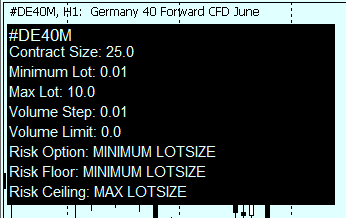
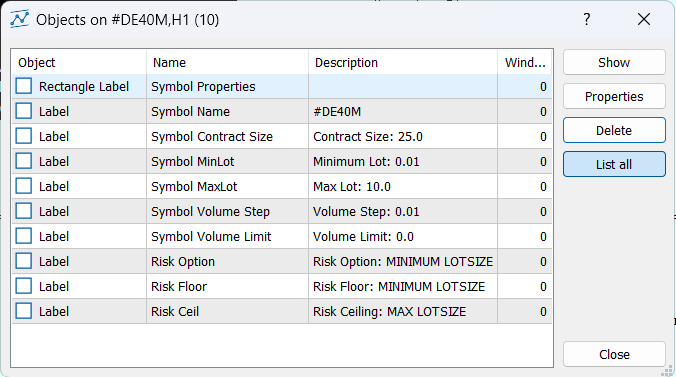
void CCommonGraphics::GraphicsRefresh() { //-- Will create the rectangle object Square(0,"Symbol Properties",2,20,330,183,ANCHOR_LEFT_UPPER); //-- Will create the text object for the Symbol's name TextObj(0,"Symbol Name",Symbol(),5,23); //-- Will create the text object for the contract size TextObj(0,"Symbol Contract Size","Contract Size: "+string(ContractSize()),5,40,CORNER_LEFT_UPPER,9); //-- Will create the text object for the Symbol's Minimum lotsize TextObj(0,"Symbol MinLot","Minimum Lot: "+string(LotsMin()),5,60,CORNER_LEFT_UPPER,9); //-- Will create the text object for the Symbol's Maximum lotsize TextObj(0,"Symbol MaxLot","Max Lot: "+string(LotsMax()),5,80,CORNER_LEFT_UPPER,9); //-- Will create the text object for the Symbol's Volume Step TextObj(0,"Symbol Volume Step","Volume Step: "+string(LotsStep()),5,100,CORNER_LEFT_UPPER,9); //-- Will create the text object for the Symbol's Volume Limit TextObj(0,"Symbol Volume Limit","Volume Limit: "+string(LotsLimit()),5,120,CORNER_LEFT_UPPER,9); //-- Will create the text object for the trader's Risk Option TextObj(0,"Risk Option","Risk Option: "+CRisk.GetRiskOption(),5,140,CORNER_LEFT_UPPER,9); //-- Will create the text object for the trader's Risk Floor TextObj(0,"Risk Floor","Risk Floor: "+CRisk.GetRiskFloor(),5,160,CORNER_LEFT_UPPER,9); //-- Will create the text object for the trader's Risk Ceiling TextObj(0,"Risk Ceil","Risk Ceiling: "+CRisk.GetRiskCeil(),5,180,CORNER_LEFT_UPPER,9); }
Expert
Once again we won't be opening any trades in this article.//+------------------------------------------------------------------+ //| NewsTrading | //| Copyright 2024, MetaQuotes Ltd. | //| https://www.mql5.com/en/users/kaaiblo | //+------------------------------------------------------------------+ //--- width and height of the canvas (used for drawing) #define IMG_WIDTH 200 #define IMG_HEIGHT 100 //--- enable to set color format ENUM_COLOR_FORMAT clr_format=COLOR_FORMAT_XRGB_NOALPHA; //--- drawing array (buffer) uint ExtImg[IMG_WIDTH*IMG_HEIGHT]; #include "News.mqh" CNews NewsObject;//Class CNews Object 'NewsObject' #include "TimeManagement.mqh" CTimeManagement CTM;//Class CTimeManagement Object 'CTM' #include "WorkingWithFolders.mqh" CFolders Folder();//Calling Class's Constructor #include "ChartProperties.mqh" CChartProperties CChart;//Class CChartProperties Object 'CChart' #include "RiskManagement.mqh" CRiskManagement CRisk;//Class CRiskManagement Object 'CRisk' #include "CommonGraphics.mqh" CCommonGraphics CGraphics();//Calling Class's Constructor enum iSeparator { Delimiter//__________________________ }; sinput group "+--------| RISK MANAGEMENT |--------+"; input RiskOptions RISK_Type=MINIMUM_LOT;//SELECT RISK OPTION input RiskFloor RISK_Mini=RiskFloorMin;//RISK FLOOR input double RISK_Mini_Percent=75;//MAX-RISK [100<-->0.01]% input RiskCeil RISK_Maxi=RiskCeilMax;//RISK CEILING sinput iSeparator iRisk_1=Delimiter;//__________________________ sinput iSeparator iRisk_1L=Delimiter;//PERCENTAGE OF [BALANCE | FREE-MARGIN] input double Risk_1_PERCENTAGE=3;//[100<-->0.01]% sinput iSeparator iRisk_2=Delimiter;//__________________________ sinput iSeparator iRisk_2L=Delimiter;//AMOUNT PER [BALANCE | FREE-MARGIN] input double Risk_2_VALUE=1000;//[BALANCE | FREE-MARGIN] input double Risk_2_AMOUNT=10;//EACH AMOUNT sinput iSeparator iRisk_3=Delimiter;//__________________________ sinput iSeparator iRisk_3L=Delimiter;//LOTSIZE PER [BALANCE | FREE-MARGIN] input double Risk_3_VALUE=1000;//[BALANCE | FREE-MARGIN] input double Risk_3_LOTSIZE=0.1;//EACH LOTS(VOLUME) sinput iSeparator iRisk_4=Delimiter;//__________________________ sinput iSeparator iRisk_4L=Delimiter;//CUSTOM LOTSIZE input double Risk_4_LOTSIZE=0.01;//LOTS(VOLUME) sinput iSeparator iRisk_5=Delimiter;//__________________________ sinput iSeparator iRisk_5L=Delimiter;//PERCENTAGE OF MAX-RISK input double Risk_5_PERCENTAGE=1;//[100<-->0.01]% //+------------------------------------------------------------------+ //| Expert initialization function | //+------------------------------------------------------------------+ int OnInit() { //--- //Initializing CRiskManagement variable for Risk options RiskProfileOption = RISK_Type; //Initializing CRiskManagement variable for Risk floor RiskFloorOption = RISK_Mini; //Initializing CRiskManagement variable for RiskFloorMax RiskFloorPercentage = (RISK_Mini_Percent>100)?100: (RISK_Mini_Percent<0.01)?0.01:RISK_Mini_Percent;//Percentage cannot be more than 100% or less than 0.01% //Initializing CRiskManagement variable for Risk ceiling RiskCeilOption = RISK_Maxi; //Initializing CRiskManagement variable for Risk options (PERCENTAGE OF BALANCE and PERCENTAGE OF FREE-MARGIN) Risk_Profile_1 = (Risk_1_PERCENTAGE>100)?100: (Risk_1_PERCENTAGE<0.01)?0.01:Risk_1_PERCENTAGE;//Percentage cannot be more than 100% or less than 0.01% //Initializing CRiskManagement variables for Risk options (AMOUNT PER BALANCE and AMOUNT PER FREE-MARGIN) Risk_Profile_2.RiskAmountBoF = Risk_2_VALUE; Risk_Profile_2.RiskAmount = Risk_2_AMOUNT; //Initializing CRiskManagement variables for Risk options (LOTSIZE PER BALANCE and LOTSIZE PER FREE-MARGIN) Risk_Profile_3.RiskLotBoF = Risk_3_VALUE; Risk_Profile_3.RiskLot = Risk_3_LOTSIZE; //Initializing CRiskManagement variable for Risk option (CUSTOM LOTSIZE) Risk_Profile_4 = Risk_4_LOTSIZE; //Initializing CRiskManagement variable for Risk option (PERCENTAGE OF MAX-RISK) Risk_Profile_5 = (Risk_5_PERCENTAGE>100)?100: (Risk_5_PERCENTAGE<0.01)?0.01:Risk_5_PERCENTAGE;//Percentage cannot be more than 100% or less than 0.01% CChart.ChartRefresh();//Load chart configurations CGraphics.GraphicsRefresh();//-- Create/Re-create chart objects if(!MQLInfoInteger(MQL_TESTER))//Checks whether the program is in the strategy tester { //--- create OBJ_BITMAP_LABEL object for drawing ObjectCreate(0,"STATUS",OBJ_BITMAP_LABEL,0,0,0); ObjectSetInteger(0,"STATUS",OBJPROP_XDISTANCE,5); ObjectSetInteger(0,"STATUS",OBJPROP_YDISTANCE,22); //--- specify the name of the graphical resource ObjectSetString(0,"STATUS",OBJPROP_BMPFILE,"::PROGRESS"); uint w,h; // variables for receiving text string sizes uint x,y; // variables for calculation of the current coordinates of text string anchor points /* In the Do while loop below, the code will check if the terminal is connected to the internet. If the the program is stopped the loop will break, if the program is not stopped and the terminal is connected to the internet the function CreateEconomicDatabase will be called from the News.mqh header file's object called NewsObject and the loop will break once called. */ bool done=false; do { //--- clear the drawing buffer array ArrayFill(ExtImg,0,IMG_WIDTH*IMG_HEIGHT,0); if(!TerminalInfoInteger(TERMINAL_CONNECTED)) { //-- integer dots used as a loading animation static int dots=0; //--- set the font TextSetFont("Arial",-150,FW_EXTRABOLD,0); TextGetSize("Waiting",w,h);//get text width and height values //--- calculate the coordinates of the 'Waiting' text x=10;//horizontal alignment y=IMG_HEIGHT/2-(h/2);//alignment for the text to be centered vertically //--- output the 'Waiting' text to ExtImg[] buffer TextOut("Waiting",x,y,TA_LEFT|TA_TOP,ExtImg,IMG_WIDTH,IMG_HEIGHT,ColorToARGB(CChart.SymbolBackground()),clr_format); //--- calculate the coordinates for the dots after the 'Waiting' text x=w+13;//horizontal alignment y=IMG_HEIGHT/2-(h/2);//alignment for the text to be centered vertically TextSetFont("Arial",-160,FW_EXTRABOLD,0); //--- output of dots to ExtImg[] buffer TextOut(StringSubstr("...",0,dots),x,y,TA_LEFT|TA_TOP,ExtImg,IMG_WIDTH,IMG_HEIGHT,ColorToARGB(CChart.SymbolBackground()),clr_format); //--- update the graphical resource ResourceCreate("::PROGRESS",ExtImg,IMG_WIDTH,IMG_HEIGHT,0,0,IMG_WIDTH,clr_format); //--- force chart update ChartRedraw(); dots=(dots==3)?0:dots+1; //-- Notify user that program is waiting for connection Print("Waiting for connection..."); Sleep(500); continue; } else { //--- set the font TextSetFont("Arial",-120,FW_EXTRABOLD,0); TextGetSize("Getting Ready",w,h);//get text width and height values x=20;//horizontal alignment y=IMG_HEIGHT/2-(h/2);//alignment for the text to be centered vertically //--- output the text 'Getting Ready...' to ExtImg[] buffer TextOut("Getting Ready...",x,y,TA_LEFT|TA_TOP,ExtImg,IMG_WIDTH,IMG_HEIGHT,ColorToARGB(CChart.SymbolBackground()),clr_format); //--- update the graphical resource ResourceCreate("::PROGRESS",ExtImg,IMG_WIDTH,IMG_HEIGHT,0,0,IMG_WIDTH,clr_format); //--- force chart update ChartRedraw(); //-- Notify user that connection is successful Print("Connection Successful!"); NewsObject.CreateEconomicDatabase();//calling the database create function done=true; } } while(!done&&!IsStopped()); //-- Delete chart object ObjectDelete(0,"STATUS"); //-- force chart to update ChartRedraw(); } else { //Checks whether the database file exists if(!FileIsExist(NEWS_DATABASE_FILE,FILE_COMMON)) { Print("Necessary Files Do not Exist!"); Print("Run Program outside of the Strategy Tester"); Print("Necessary Files Should be Created First"); return(INIT_FAILED); } else { //Checks whether the lastest database date includes the time and date being tested datetime latestdate = CTM.TimePlusOffset(NewsObject.GetLatestNewsDate(),CTM.DaysS());//Day after the lastest recorded time in the database if(latestdate<TimeCurrent()) { Print("Necessary Files outdated!"); Print("To Update Files: Run Program outside of the Strategy Tester"); } Print("Database Dates End at: ",latestdate); PrintFormat("Dates after %s will not be available for backtest",TimeToString(latestdate)); } } //-- the volume calculations and the risk type set by the trader Print("Lots: ",CRisk.Volume()," || Risk type: ",CRisk.GetRiskOption()); //--- return(INIT_SUCCEEDED); } //+------------------------------------------------------------------+ //| Expert deinitialization function | //+------------------------------------------------------------------+ void OnDeinit(const int reason) { //--- } //+------------------------------------------------------------------+ //| Expert tick function | //+------------------------------------------------------------------+ void OnTick() { //--- } //+------------------------------------------------------------------+
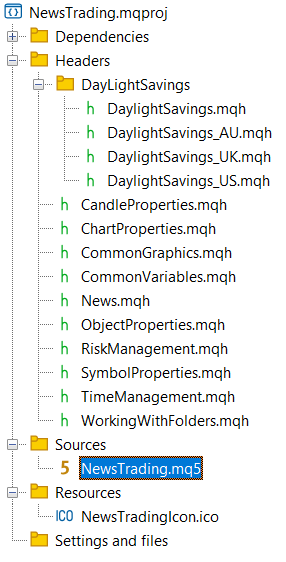

Once everything is compiled we will go through some steps that will occur once the Expert is placed on the chart.
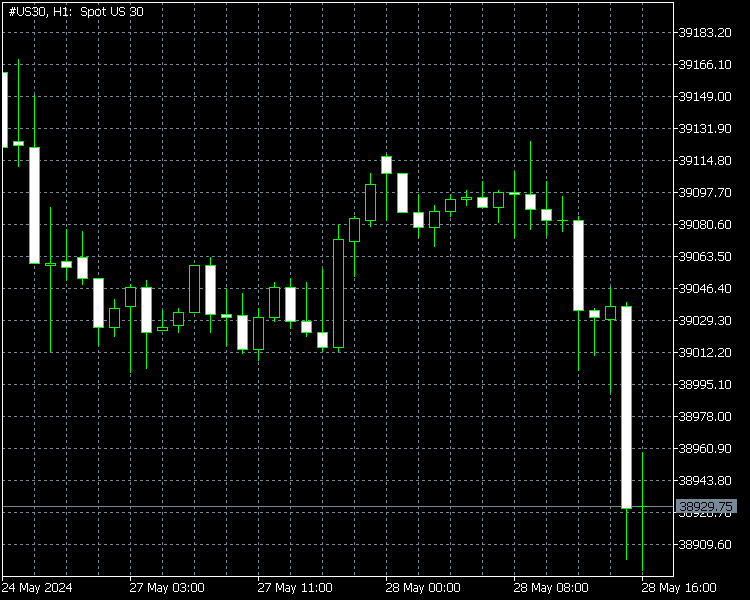
Once you decide which Symbol chart window to open, your chart could look similar to the chart above before attaching the Expert.
Now we will attach the Expert.
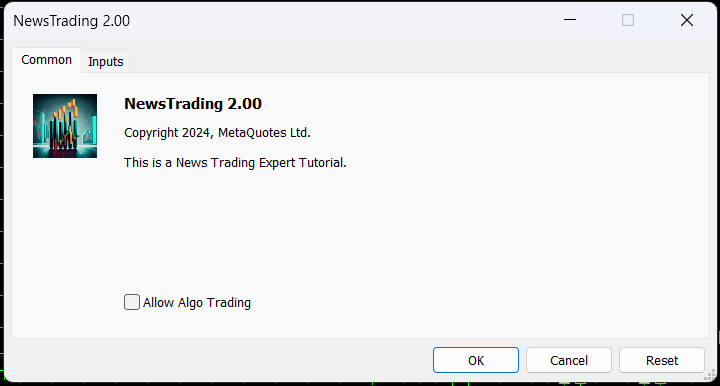
We can first configure the Risk management input variables, I'll leave the default values to begin with.
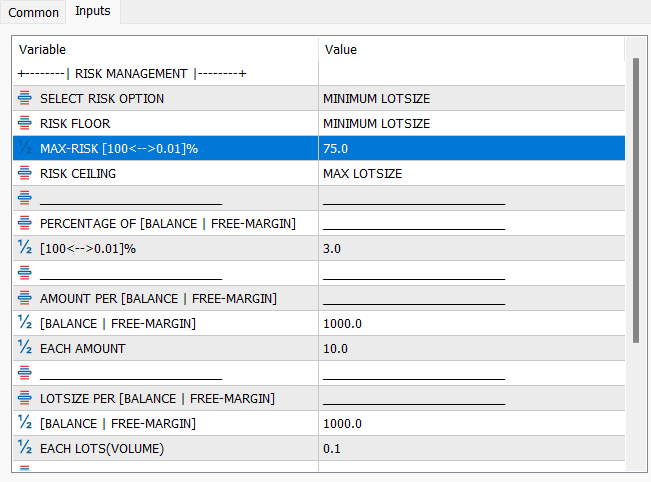
If it is the first time running NewsTrading 2.00 and you didn't previously run NewsTrading 1.00 on your broker and the Calendar database does not exist in the common folder.
Your chart will appear in this manner, chart colors may differ from broker to broker.
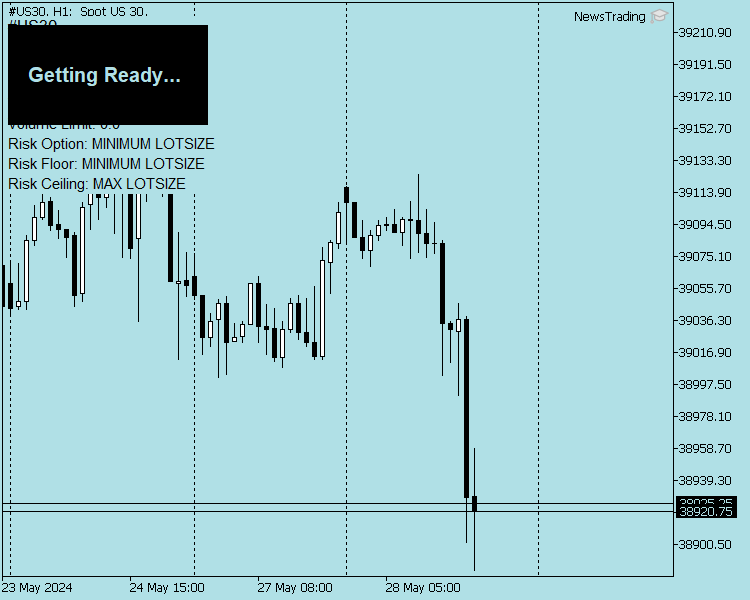
As seen in the message below the Lots will be displayed according to the Risk options selected in the settings.

If the terminal cannot find a connection.
When running the NewsTrading 2.00 Expert for the first time and the calendar database was created from NewsTrading 1.00 Expert.
NewsTrading 2.00 will delete all tables from NewsTrading 1.00
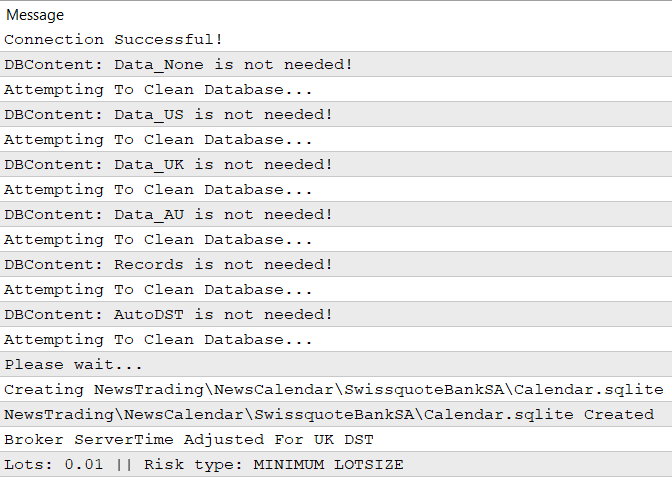
Conclusion
In this article we explored how Inheritance works, with an example for illustrative purposes. We created created a new Daylight Savings class to act as a parent for the different DST schedule classes. We created a Symbol properties class to retrieve Symbol properties from all classes that Inherit from it. We also created a Chart properties class to customize the chart. We went through different SQLite methodologies and a simple way to improve the overall efficiency of the database. We created an Object properties class to create chart objects and delete them, we then created a Risk management class to cater for different risk profiles and traders. Finally we created the last class called Common Graphics to display the Symbol properties onto the chart along with the trader's risk options. In the next article, 'News Trading Made Easy (Part 3): Performing Trades' we will finally begin opening trades and I cannot wait to finish it in a reasonable timeline!Warning: All rights to these materials are reserved by MetaQuotes Ltd. Copying or reprinting of these materials in whole or in part is prohibited.
This article was written by a user of the site and reflects their personal views. MetaQuotes Ltd is not responsible for the accuracy of the information presented, nor for any consequences resulting from the use of the solutions, strategies or recommendations described.
 Neural networks made easy (Part 72): Trajectory prediction in noisy environments
Neural networks made easy (Part 72): Trajectory prediction in noisy environments
 Reimagining Classic Strategies: Crude Oil
Reimagining Classic Strategies: Crude Oil
 Neural networks made easy (Part 73): AutoBots for predicting price movements
Neural networks made easy (Part 73): AutoBots for predicting price movements
 Developing a multi-currency Expert Advisor (Part 2): Transition to virtual positions of trading strategies
Developing a multi-currency Expert Advisor (Part 2): Transition to virtual positions of trading strategies
- Free trading apps
- Over 8,000 signals for copying
- Economic news for exploring financial markets
You agree to website policy and terms of use
Was trying to test it but i don't know where to put al the files, so the newstrading is not compiling
Step 1: Move the NewsTrading folder into the Experts Folder
Step 2:Open The NewsTrading Project File.
Step 3: Click on the NewsTrading mq5 file and open it.
Step 4: Compile the Application.
When switching Stop Loss to 0, this is what happens:
Great programming, though needs a bit of a tidy up. Really interesting article and I can see how much effort was put into it.
When switching Stop Loss to 0, this is what happens:
Great programming, though needs a bit of a tidy up. Really interesting article and I can see how much effort was put into it.
Hi Christian, thanks for the kind words. This issue has been noticed and resolved in my later articles which are still in the process of being published. In terms of the commission, are you suggesting that the expert adjust for commissions when calculating risk?
I believe factoring in commissions is an important aspect to profitability and when calculating risk, otherwise traders using automated systems may be closing out trades thinking they're in profit and realistically profit minus expenses = net profit, which reflects the real world.
If a trade is in loss or open for an extended time, the price simply returning back to your entry point is likely not going to cover costs.
Sure, in a demo account, all good for testing purposes, though most brokers charge some kind of commission, so breakeven is never going to be returning to the entry point, it will always be a few points above/below your original entry point depending on whether the broker charges both for entry and exit or whether they charge a percentage. Swaps should also be factored into any breakeven point also.
I believe that accounting for fees is an important aspect of profitability and risk calculation, otherwise traders using automated systems may close trades thinking they are in profit, when in fact profit minus expenses = net profit, which reflects the real world.
If a trade is in the red or has been open for a long time, the price simply returning to the entry point will most likely not cover the costs.
Of course, a demo account is fine for testing purposes, but most brokers charge some commission, so breakeven will never be back to your entry point, it will always be a few pips above/below your original entry point depending on whether the broker charges entry and exit fees or charges a percentage. Swaps must also be factored into any breakeven point.
Thanks for the feedback, it is appreciated!